Electricity Supply: FG Pays
Police Invite NLC President for Questioning over Terrorism Financing, Treason, Others
Warn failure to honour letter will lead to activation of warrant of arrest

Warn failure to honour letter will lead to activation of warrant of arrest
Discloses 67,000bpd pledged for $1bn loan on PH refinery
No subsidies paid to any marketers in 9 years, NNPCL CFO Says firm handling shortfalls, not paying subsidy Underpayments on petrol projected to hit N6.8tn by December Company to begin sale of crude in naira to Dangote in October
Atiku: alleged payment of oil subsidy another chapter of opaque governance under Tinubu


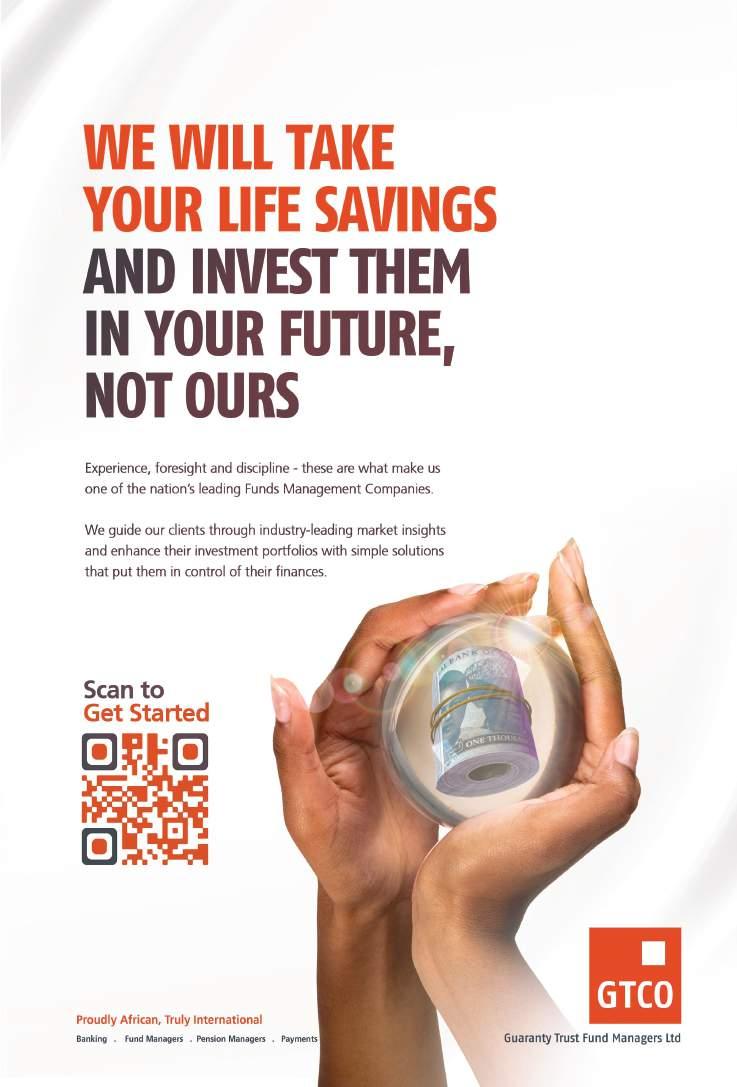


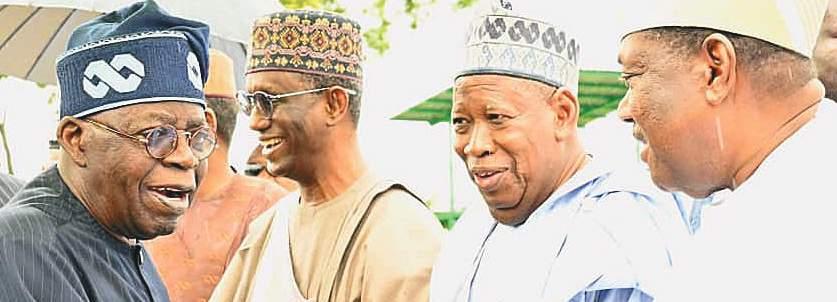
Says he's strengthened nation's anti-graft agencies via funding, non interference UN: Africa loses estimated $88.6bn annually to illicit financial flows NACIWA's permanent headquarters sited in Nigeria
Deji Elumoye in Abuja
President Bola Tinubu has called on member-nations of the Economic Community of West African States (ECOWAS) to, as a matter of necessity, ratify and fully implement the ECOWAS Protocol against Corruption.
Tinubu made the call yesterday during the sixth Annual General Assembly of the Network of National Anti-Corruption Institutions in West Africa (NACIWA), held at the ECOWAS Secretariat in Abuja.
The appeal was in line with the president’s determination to wipe out corruption in his capacity as Chairman of the Authority of Heads of State and Government of the Economic Community of West African States.
From mere commitment and intention, Tinubu urged ECOWAS member-states to take action by implementing the anti-graft protocol.
He maintained that the region’s future depended on its capacity to build governance structures that were not just transparent, accountable, and efficient, but also served the interests of the people.
Tinubu also announced Nigeria’s donation of an office building for the permanent headquarters of NACIWA in the country.
The president, who was represented at the event by Vice President Kashim Shettima, said, “In recognition of NACIWA's pivotal role in our regional anti-corruption efforts, I am proud to announce that the Nigerian government has donated a property to serve as NACIWA's permanent headquarters.
“This gesture underscores our commitment to strengthening NACIWA's institutional capacity and providing a solid operational foundation. As we deliberate on implementing the ECOWAS Protocol against Corruption, I urge all member states to renew their commitment to this cause.”
The ECOWAS chairman urged member countries to move beyond rhetoric and focus on concrete actions targeted at harmonising their “legal frameworks to close loopholes exploited by corrupt individuals”.
He listed other tangible actions required to include enhancing crossborder cooperation in investigations and asset recovery, investing in innovative technologies to detect and prevent corrupt practices, promoting transparency in public procurement and resource management, engaging civil society and the media as partners in the region’s anti-corruption efforts, and strengthening the independence and capacity of its national anti-corruption institutions.
Demanding full implementation of the ECOWAS Protocol against Corruption, Tinubu stated , “The task before us is enormous, but so significant is our collective resolve by working together, sharing best practices, and leveraging our diverse strengths, we can create a formidable bulwark against corruption in West Africa.
“All member-states must ratify and fully implement the ECOWAS protocol against corruption. Let us move from commitment to action, from intention to implementation. The future of our region depends
on our ability to create transparent, accountable, and efficient governance structures that serve the interests of our people.”
Highlighting the dangers of corruption, he maintained that it had remained “one of the most significant obstacles to the progress and prosperity of our nations”.
He added that corruption “undermines the very fabric of our societies, erodes public trust, and impedes the equitable distribution of resources. As leaders, we are responsible for
confronting this challenge head-on with unwavering resolve and concerted action.”
Outlining the steps he had taken to tackle corruption in Nigeria since he assumed office as president last year, the ECOWAS chairman said he strengthened “all the anti-corruption agencies in Nigeria by not interfering in their activities and ensuring that they are adequately funded.
“I have also encouraged them to operate within the ambit of the law. This is a template, which I recom-
mended to other states within the region.”
Tinubu reaffirmed Nigeria's com- mitment to NACIWA’s success “and the broader anti-corruption agenda within ECOWAS”.
He assured that working together would enable member countries to “build more vital institutions, foster regional unity, and pave the way for a prosperous and corruption-free West Africa”.
Earlier, Minister of Foreign Affairs, Ambassador Yusuf Tuggar, said there
was an urgent need for regional and global cooperation in the battle against corruption, describing it as a cancer that threatens Africa’s stability and development.
Tuggar stated, “Corruption is a cancer that has eaten deeply into the fabric of many African nations. It has been a persistent obstacle to development, undermining our institutions, eroding public trust, and exacerbating poverty.”
Emmanuel Addeh in Abuja
Nigeria’s Minister of Tourism, Lola Ade-John, has underscored the prospects of the sector she oversees, stressing that it could generate employment opportunities and enhance economic diversification.
She spoke at the tourism parliament, held in Continental Hotel, Abuja, themed: “Tourism as a Catalyst for Job Creation and Economic Diversification, a Call to Action for Nigerian Governors.”
The minister, represented by the Special Adviser on Medical Tourism, addressed emphasised the vast potential of tourism as a key
driver of job creation and economic diversification in Nigeria.
“It is indisputable that our nation is blessed with an abundance of natural and cultural resources from pristine beaches and lush rainforest to rich historical sites and vibrant cultural heritage. These assets, if effectively developed, could become a gold mine of opportunities for the country,” she said.
She explained that strategically developed tourism could generate employment across various sectors, including hospitality, transportation, and arts and crafts, with ripple effects that could significantly impact the economy.
Onyebuchi Ezigbo in Abuja
The Academic Staff Union of Universities (ASUU) has informed the federal government of its intention to commence a nationwide strike in the next 21 days.
The union gave the 21-day strike via a letter sent the Federal Ministry of Labour and Employment and Ministry of Education in Abuja. The last strike embarked upon by ASUU during the President Muhammadu Buhari administration lasted eight months and left
the academic calendar of the country's tertiary institutions in disarray.
A source within ASUU leadership which confirmed the development to newsmen on Monday said the notice was issued after a NEC meeting held at the University of Ibadan. He said that a formal copy is expected to be sent to the Federal Ministries of Labour and Education.
“This is not an ultimatum but a formal strike notice. We are providing a 21-day notice before we proceed with the strike,” said
the source.
According to the laws governing trade union operations, ASUU is expected to forward a formal notice of strike not less than 21 days to its commencement date.
ASUU had earlier threatened to embark on strike due to the federal government’s failure to implement agreements reached between them. The Minister of Education, Prof. Tahir Mamman, had met with ASUU o June 26, to discuss their grievances and try to prevent the planned strike.
However ASUU President,
Prof. Emmanuel Osodeke, said that the agreements reached during the meeting have not been implemented. Among the union’s demands are, the non-implementation of the 2009 re-negotiated agreements, and accumulated academic allowances that remain unpaid.
Osodeke also said that revitalisation funds were yet to be released in full, adding that only a paltry sum out of the agreed N200 billion yearly for five years was disbursed to the institutions since 2013.
“It can be a lifeline for our teenage youth population, offering gainful employment and entrepreneurship avenues. Moreover, tourism is a key to economic diversification. By reducing our over-excellence on oil, we can build a more resilient and sustainable economy,” she added.
Furthermore: “Tourism can contribute significantly to our foreign exchange earnings, boosting our national income and also make things work. To fully realise this potential, we call on our esteemed partners to prioritise tourism development in their respective locations and also our governors too because we believe one thing we kind of explain to people is that many of these assets don't belong to the ministry, they belong to the state.
“So, all we can actually do as the ministry is to support the states to make sure that these assets are well taken care of and well managed,” the minister added. She urged collective efforts to invest in infrastructure, create an enabling environment for businesses, and promote Nigeria’s unique selling points to position the country as a world-class tourism destination.
“I call on everyone to ask people, let us know how to unlock potential for our great nation. I am someone who is willing and is a listener. I assure everyone here that I am open to listening and collaborating with stakeholders to unlock Nigeria’s tourism potential,” she added.
The event convener, Ayo Omotosho, speaking during an interview with the press highlighted the essence
of the event. He stated: “Essentially, today’s event is to use media to project tourism positively. And also to discuss various issues surrounding tourism development in Nigeria. And this is not the first of its kind.
“We've been doing that in Lagos. But we are having it for the first time in the city of Abuja. And so everybody is happy, you can see stakeholders, they have endorsed it. They are willing to identify with a brand new event, which is Destination Nigeria Government Tourism Conference (DNGTC).
“We are partnering with the Nigerian Governors Forum. And so through the NGF, we reach out to other governors. And no doubt, there are some governors that are tourism-friendly in Nigeria. But we want to incorporate all the 36 states plus FCT into this project, because tourism is life,” Omotosho said.
In a goodwill by The Gambia High Commissioner to Nigeria, Mohamadou Musa Njie, at the event, he said: ”Nigeria's diverse cultural heritage, landscapes, and vibrant communities have great potential for job creation, wealth generation, and economic growth.
“To promote these attractions, a strategic tourism policy with sustainable programmes is crucial.
“Prioritising access to natural and cultural resources, investing in tourism infrastructure, and involving local communities and private sector players across the value chain can create jobs and economic opportunities,” he noted.
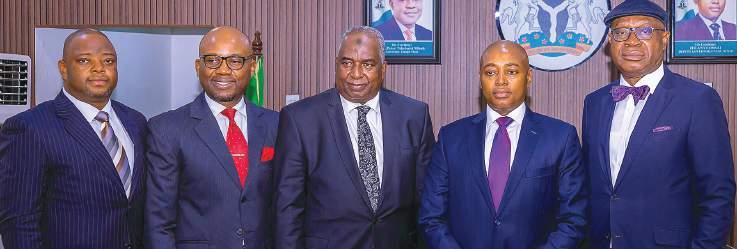
L-R: Special Adviser to Enugu State Governor on Legal Matters, Osinachi Nnajieze; Attorney-General and Commissioner for Justice, Enugu State, Dr. Kingsley Udeh; Director-General, Nigerian Law School, Prof. Isa Hayatu Ciroma, SAN; Deputy Governor of Enugu State, Barr. Ifeanyi Ossai; and the Chairman, Legal Education Council, Chief Emeka Ngige, SAN, during a visit to Government House, Enugu... yesterday.
Alex Enumah in Abuja
The Attorney-General of the Federation (AGF) and Minister of Justice, Prince Lateef Fagbemi and his counterpart from the Budget and National Planning Ministry, Senator Abubakar Bagudu, have charged regulators, anti-corruption agencies as well as critical stakeholders in the nation's financial sector to do everything possible to ensure that Nigeria is removed from the Financial Action Task Force (FATF) Grey List come May, 2025.
It was their opinion that Nigeria's exit from the FATF gray list, besides enhancing the country's economy would attract the much-needed Foreign Direct Investment (FDI) needed for the country's socioeconomic development.
They spoke yesterday, in Abuja, during the opening of the Nigerian Financial Intelligence Unit (NFIU)
Management Retreat, 2024.
The FATF is an independent intergovernmental organisation that promotes policies to protect the global financial system, evaluating jurisdictions based on their Anti-Money Laundering/Counter Financing of Terrorism and Proliferation (AML/ CFT/P) standards. Unfortunately, Nigeria was last year placed on its Grey List due to a rise in capital inflows and deficiencies in combating money laundering, terrorism, and arms financing.
In his goodwill message to participants, Fagbemi commended NFIU's efforts at combating ML/TF and Proliferation financing, stressing that the efforts of the unit remains very vital in removing Nigeria from the FATF Grey List which he noted will be due in May 2025.
While recognising the importance of the retreat in achieving set goals, he reassured his commitment towards
making available the "resources" the NFIU needs in carrying out its task.
On his part, the Minister of Budget and National Planning, pointed out that for Nigeria to achieve the Agenda 2050 goals, it must leverage on good revenue from both the public and private sector.
While lamenting that the nation's budget of $20 billion was small when compared to some developing countries like Indonesia and that the budget was a far cry from the $100 billion being targeted by the administration, Bagudu observed that the NFIU could help improve the country's credit rating, which in turn would make revenue available for development.
“Our credit rating should improve better, we have to take measures, set up committed institutions, and believe we should benefit from it to enhance the integrity and soundness of the financial system”, the minister said.
Others who spoke on the occasion included the Chairman of the National Drug Law Enforcement Agency (NDLEA)Brig. Gen. Mohamed Buba Marwa (Rtd), the Commandant General of the Nigerian Security and Civil Defence Corps (NSCDC), Abubakar Audi, and the Executive Vice-Chairman National Communication Commission (NCC) Dr Aminu Maida.
They all commended the NFIU for sharing vital intelligence that has enhanced their efforts at combating money laundering, drug trafficking, terrorism financing, arms proliferation amongst others.
Marwa, disclosed that the agency got 76 reports in 2024 which led to significant recoveries of hotels, properties, and bank accounts, as well as several convictions.
Similarly, the NSCDC CG, disclosed that the corps succeeded in arresting over 5000, identified over
The Financial and Professional Services (FPS) sector of the Nigerian economy recorded an improved performance in 2023 with the banking sub-sector significantly increasing its contribution to national output in 2023 to 4.6 per cent of the GDP.
This was revealed in the, “State of Enterprise (SOE) 2024 Report: Insights into Nigeria’s Financial and Professional Services Sector,” launched yesterday in Lagos, by the Chief Executive Officer of EnterpriseNGR, Ms. Obi Ibekwe, with the Director of Policy and Public Affairs, Mr. Lami Adekola and Head of Research, Mr. Omotayo Muritala, shedding light on the report.
Ibekwe, said the report celebrated, “the fusion of tourism and finance to emphasise the interplay of the two industries and underscore the increasing importance of tourism in today’s global financial landscape.”
She added: “In 2023, Nigeria’s FPS sector delivered improved performance across the nine classified sub-sectors, which include banking, insurance, capital markets, asset management, pensions, noninterest finance, FinTech, professional services and sustainable finance.
“Significant positive impacts on people, businesses, and the economy were recorded, despite heightened
inflation, increased production costs, exchange rate depreciation and other poor macroeconomic fundamentals.”
According to the report, the banking sub-sector accounted for a noteworthy 4.6 percent of GDP, with a remarkable 28.8 percent surge in output, reaching a new peak of N3.5 trillion compared to N2.72 trillion in 2022.
“Deposit money banks saw a stellar 56.14 percent growth in assets, reaching N121.8 trillion. This translates into a significant 52 percent share of national nominal GDP, compared to 39.1 percent in 2022,” the report stated.
The report also stated that Nigeria’s Insurance sub-sector demonstrated impressive momentum in 2023 as its gross premium written surged to N1.003 trillion, a significant increase from N844.5 billion gross premium income in 2022.
Similarly, the Nigerian Capital Markets experienced a period of significant expansion in 2023 as its All Share Index (ASI) experienced a remarkable 45.9 percent increase, reaching a new high of 74,773.77 points, and marked the strongest performance since 2020. Its market capitalisation mirrored this growth, surging by 46.6 percent to reach an impressive ₦40.92 trillion.
Moreover, the Asset Management sub-sector reached a global value of $118.7 trillion in 2023, a 12 percent
increase from 2022.
“In Nigeria, the total net asset value (NAV) for all collective investment schemes soared by 47.48 percent year-over-year to an unprecedented N2.24 trillion in 2023. This surge was predominantly fuelled by Mutual Funds, which saw a 51.24 percent year-over-year (YOY) increase.
“Also, the pensions sub-sector remained a key sub-sector in savings accumulation, with assets under management (AUM) reaching N18.36 trillion in 2023, up from N265 billion in 2006, achieving a compound annual growth rate (CAGR) of 30 percent.
“In 2023, there were 10.19 million Retirement Savings Account (RSA) holders, reflecting a 13.5 per cent penetration rate within the formal labour force of 75.7 million, with RSA holders growing at a CAGR of 11.2 per cent,” the report said.
The report categorised Nigerian FinTech sub-sector into six domains: Payments, Mobile Money and Digital Banking (38%); Lending (23%), Savings, Investments, and Crowdfunding (15%), Enterprise Services and Infrastructure (13%), Cryptocurrency (8%), and InsurTech (3%).
“The sub-sector bolsters the economy through point-of-sales (POS) machines, with total transaction value growing by 27.9 percent
to N10.73 trillion in 2023.
“FinTechs processed substantial transaction volumes, including N46.6 trillion in mobile money transactions in 2023, a 140 per cent rise from 2022. FinTechs also enhance consumer credit, with a 15.5 per cent increase in consumer credit within two quarters (Q1 and Q3 2023),” the report said.
300 illegal refineries and convicted over 100 suspects said, "all of these were made possible by Intelligence reports received from the NFIU.
Also speaking, Maida disclosed that over 90 million unidentified numbers were in existence before his appointment, but due to collaboration with NFIU the number has been reduced to 12 million, adding that the target is to get to a zero level.
In a welcome, the Chief Executive Officer, Nigerian Financial Intelligence Unit (NFIU), Hajiya Hafsat Bakari, commended participants for the collective efforts combating the many serious challenges they face in protecting the global economic systems from the threats of money laundering, terrorist financing, proliferation financing of small arms and weapons of mass destruction, violent crimes, and other serious organised crimes.
"On the mandate of the NFIU, I am going to quote the words of Mr. President and Commander-in-Chief of the Federal Republic of Nigeria Bola Ahmed Tinubu, who in the year 2022 as a presidential candidate said and I quote “We are not here to do what is comfortable. We are here to do what is right for our people and our country. We are here to answer to a greater, higher calling. That calling is the love of Nigeria. We dare not miss this chance because we cannot be sure of another.”
Bakari recalled that the primary role of the unit was to ensure the leveraging of multiple sources of information and data to provide National and International competent authorities with the intelligence they require to investigate crimes and
prosecute criminals.
She disclosed that towards this end, the NFIU had taken several steps to ensure the effective protection of national and economic security, adding that the steps have recorded phenomenal achievements since she assumed office.
"Recognising the myriad threats we face, the dynamic nature of the criminal environment, and the vulnerabilities that exist within our domestic context, we developed and implemented a robust and innovative organisational structure which aligns our capacities and resources to the sectors of the economy that are most vulnerable to abuse by money launderers and terrorist financers.
"This allows us to prioritise our response to the highest risk predicate offences in our country and enables us to better serve our stakeholders and partners with timely, credible and actionable intelligence, as well as facilitating more effective cooperation with all of them.
"To support this new structure, we embarked on a strategic reengagement exercise. Most of the Chief Executive Officers in this room would have at some point in the past few months received a visit from the management of the NFIU.
“The purpose of these visits was to receive direct feedback from the agencies we work with daily and to use these interactions to improve our operations. These engagements have led to the establishment of several joint task forces and inter agency committees to strengthen our mutual cooperation in tackling criminal activity", she said.
Sunday Ehigiator
The Nigerian Institute of Chartered Arbitrators (NICArb) has elected eight new members to its Governing Council.
It also re-elected Prof. Fabian Ajogwu as President and Chairman of the Council at its 2024 Annual General Meeting (AGM) held in Lagos.
In a statement signed by NICArb’s Registrar and Chief Executive Officer, Shola Oshodi-John, the institute also reported a 23 percent increase in revenue for 2023. It highlighted its expanded reach and training programs.
According to the statement, other reelected members of the council
included, “Mr Damian D. Dodo, Prof. Taiwo Osipitan, Mr. Jude T. U. Nnodum, Mr Mike Igbokwe, Mr. Omoruyi Augustine Omonuwa, Mrs. Priscilla Ogwemoh, Mr Adebayo Adenipekun, and Mrs. Shola Oshodi-John, as Registrar and Chief Executive Officer.”
The newly elected council members included “Mr. Rafiu A. Lawal-Rabana, Mr. Uche Val Obi, Prof. Damilola Olawuyi, Hon. Justice Rita Pemu, JCA (Rtd), Dr. Francis Ohiwere Oleghe, as General Secretary, Mr. Sebastine Hon, Mrs. Rosecana Ankama, and Engr Kashim Abdul Alli.” Ajogwu, reported that “in 2023 the institute had a robust increase of 23 percent over 2022 revenue and
the ADR Center handled arbitration matters totalling N3,720,900,000 and $105,000,000.
“As part of its strategy for 2023, NICArb broadened its reach and deepened its roots across Nigeria by establishing the Abuja liaison office, creating a full-fledged branch in Kano State.
“Furthermore, it expanded its training programmes and enhanced its service options. This enabled the institute to invest strategically in key areas to be impactful in the industry.” He urged Council members to be committed to the cause of the institute and do their best to maintain and surpass the current admirable growth of the Institute.

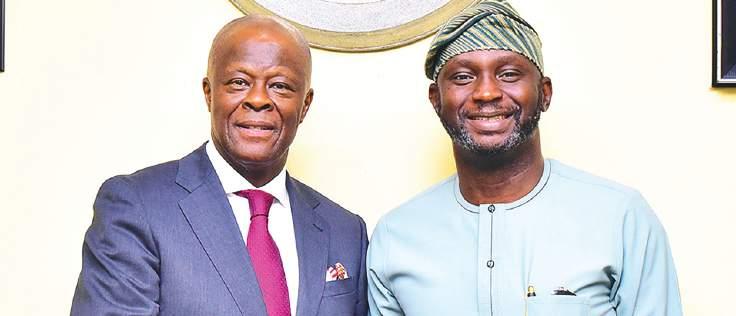
The Minister of Finance and Coordinating Minister of the Economy, Mr. Wale Edun (L) and the MD/CEO of the Bank of Industry (BOI), Dr. Olasupo Olusi, during the signing ceremony of the iDice programme Subsidiary Grant Agreement for the Islamic Development Bank held in Abuja...recently
The Nigeria Extractive Industry Transparency Initiative (NEITI), is set to unveil the first multi-million Naira fully automated data centre, said to be the first of its kind among the 57 EITI-implementing countries.
The Data Centre completion, NEITI said in a statement yesterday, is in line with implementation of the projects to institutionalise EITI in Nigeria under its five-year strategic plan.
Apart from serving as a one-stop shop for information and data on Nigeria’s extractive sector, the centre will also serve as a reservoir for all information and data published in the various NEITI Annual Industry Reports since the first edition in 2004 till date.
Also, the Centre will serve as a warehouse for all extractive industry data in aggregated and disaggregated formats for easy public access by multi-stakeholders, especially the civil society, the media, extractive industry companies, government agencies and the legislature.
Besides, NEITI said the centre will also provide data information analysis, training and manpower development in data science education deployment and utilisation required to sustain a robust public knowledge and understanding of Nigeria’s extractive industry.
“Diverse groups that have come to invest enormous trust on NEITI’ capability and capacity to provide timely, credible information and data for informed decision-making, engagements and advocacy over
the years see the data centre as a game changer and positive disruptive development”, NEITI’s Executive Secretary, Ogbonnaya Orji, said shortly after inspecting the conclusion of work at the centre. He applauded the Bola Tinubu administration for its support to ensure the completion of the project. He praised the Chairman
of NEITI Board and Secretary to the Government of the Federation George Akume and members of the Board for their leadership.
“We had no other choice than to approach the federal government under President Tinubu for funding in the 2023 and 2024 budgets respectively”, Orji added.
The decision by the Tinubu’s
administration to take up the funding of the project in the 2023 and 2024 budgets respectively came as a huge relief to NEITI and a bold positive statement of the administration’s commitment to the implementation of the EITI standards in Nigeria, the statement said.
It is therefore most encouraging
that the different segments of the project were all achieved within the initial budget over a two-year period without any variation, despite foreign exchange volatility, galloping inflation and other general hike in price levels experienced in the economy over the period.
“With the project now completed ahead of release of 2024 capital
funds by the Federal Government, NEITI is once again satisfied that its commitment to achieving much with less is once again duly met. I commend our team and the indigenous firms that handle the project for the exceptional project management initiatives, commitment, expertise and sacrifice,” Orji said.
Deji Elumoye and Chuks Okocha in Abuja
President Bola Tinubu yesterday, departed the presidential wing of the Nnamdi Azikwe International Airport, Abuja for Paris, the capital of France using the new Airbus A330, which replaced the 19-yearold Boeing B737-700(BBJ) bought during the Presidency of President Olusegun Obasanjo.
The Special Adviser to the President on Information and Strategy, Bayo Onanuga, in a statement stated that the new plane, bought far below the market price, saved Nigeria huge maintenance and fuel costs, running into millions of dollars annually.
According to the statement, the
recommendation to replace the B737-700(BBJ) followed an investigative hearing by Nigeria's parliament that questioned the plane's safety record and cost efficiency, especially after it malfunctioned during a trip to Saudi Arabia.
The Nigerian Senate’s security and intelligence committee had recommended replacing the aging aircraft in the presidential fleet to reduce downtime and operational expenses.
Presidential spokesperson, Ajuri Ngelale, had on Sunday disclosed that Tinubu would on Monday depart the nation's capital, Abuja for a working visit to France.
In a statement, Ngelale said the president was expected back in the country after his brief work
stay in France.
Tinubu's latest trip to France is coming three days after he returned from a three-day state visit to Malabo, Equatorial Guinea during which he held bilateral talks with President of Equatorial Guinea, Nguema Mbasogo and also signed security and oil and gas pacts with his host country.
But in a reaction, former Vice President, Atiku Abubakar, called on the handlers of the president to give more insight into the his trip to France.
In a statement by his media office, Atiku said: "Could you kindly elucidate the duration of President Bola Tinubu’s visit to France, or is this engagement open-ended?
"Furthermore, might you provide insight into the nature of the ‘brief work’ being undertaken in France, or is this matter held in secrecy?”
Atiku said this had become necessary given that the president serves as a public steward funded by the nation's resources, stressing that it was of paramount importance that Nigerians are kept apprised of his travel plans, objectives, and schedules.
"I trust that, having learned from the Yar’Adua experience, we are committed to upholding a higher standard of transparency," the presidential candidate of the Peoples Democratic Party (PDP) in the 2023 polls stated.
Tinubu, yesterday, August 19, embarked on a trip to France,
departing from Abuja, the nation’s capital. The presidency did not state the purpose of Tinubu’s visit. This is the fourth trip the president is making to the European country since his assumption of office.
In addition, he has also been to Equatorial Guinea, London, the United Kingdom (twice); Bissau, Guinea-Bissau (twice); Nairobi, Kenya; Porto Norvo, Benin Republic and Pretoria, South Africa. He has also travelled to Accra, Ghana; New Delhi, India; Abu Dhabi and Dubai in the United Arab Emirates; New York, the United States of America; Riyadh, Saudi Arabia (twice); Berlin, Germany; Addis Ababa, Ethiopia; Dakar, Senegal and Doha, Qatar.
The Managing Partner, Sahel Consulting, Agriculture and Nutrition Limited, Temi Adegoroye, has said that food insecurity is a threat to the continent of Africa.
He also regretted that Africa with its advantage of energetic youthful population, good climate conditions and arable land, is still plagued with food security crisis.
He further lamented that Sudan, Nigeria and other countries in the continent are amongst those classified as countries with acute food insecurity in the world, even when some countries in Sub Saharan Africa are leading producers in
Cocoa, Cassava, Cashew nuts, Plantains etc.
Also, the 2023 report by Food and Agriculture Organization of the United Nations (FAO), the African Union Commission (AUC), the UN Economic Commission for Africa (ECA), and the World Food Programme (WFP), revealed that nearly 282 million people in Africa - about 20 percent of the population, are undernourished, an increase of 57 million people since the COVID-19 pandemic began. The report added that more than a billion people are unable to afford a healthy diet, stressing that around 30 percent of children are stunted because of malnutrition.
But while delivering a keynote address, at the 2024 virtual Sahel scholars conference on agriculture and nutrition for undergraduates across African universities themed, "Nourishing Tomorrow: YouthDriven Solutions for Sustainable Food Security," organized by Sahel Consulting, Agriculture and Nutrition Limited, Adegoroye, noted that no fewer than 50 to 70 percent of the population in Africa are involved in agricultural production.
Adegoroye, who is also a production, marketing and agribusiness value chain expert, said that this 70 percent of farmers, record 40 percent post-harvest
losses annually. A situation he said would further exacerbate the food and nutrition crisis in Africa.
Earlier in his address of welcome, the Chief Operating Officer, Myagro Ltd, Patrick Tognisso, said that 60 percent of the labour force in Africa survive on agriculture, except in rare countries like South Africa and Botswana.
He averred that better agricultural practice impacts food security and nutrition, and better nutrition leads to improved productivity and education ultimately, and all that lead to overall economic growth.
According to him, "I worked in food, beverage, and consumables,
and I was focusing on young people as consumers and indeed, two decades ago, this was the general narrative that was focused on. Africa was going to be the big thing because of these emerging youths as the future consumers.
“But as my career evolved, and I moved from consumables to production of goods and more recently to agribusiness, I did realize this, for Africa, the focus on the youths should not be on their consumable potentials, rather it should be on production and value creation potentials.
“Now, in Sub Saharan Africa, 50 percent of the population are young people, less than 35 years
old. Picture this and still, this continent remains predominantly rural, 65 percent of the population or more still live in rural areas". He added that despite rapid globalization, an average of 50 to 60 percent of labour force, survive on agriculture, except in rare countries like South Africa and Botswana.
Agriculture, he said represents only 15 percent of GDP in most of these Sub-Saharan Africa nations.
He noted that the future of employment and of course food security will depend on the ability of these young workers to create jobs and to generate value in the agricultural space.
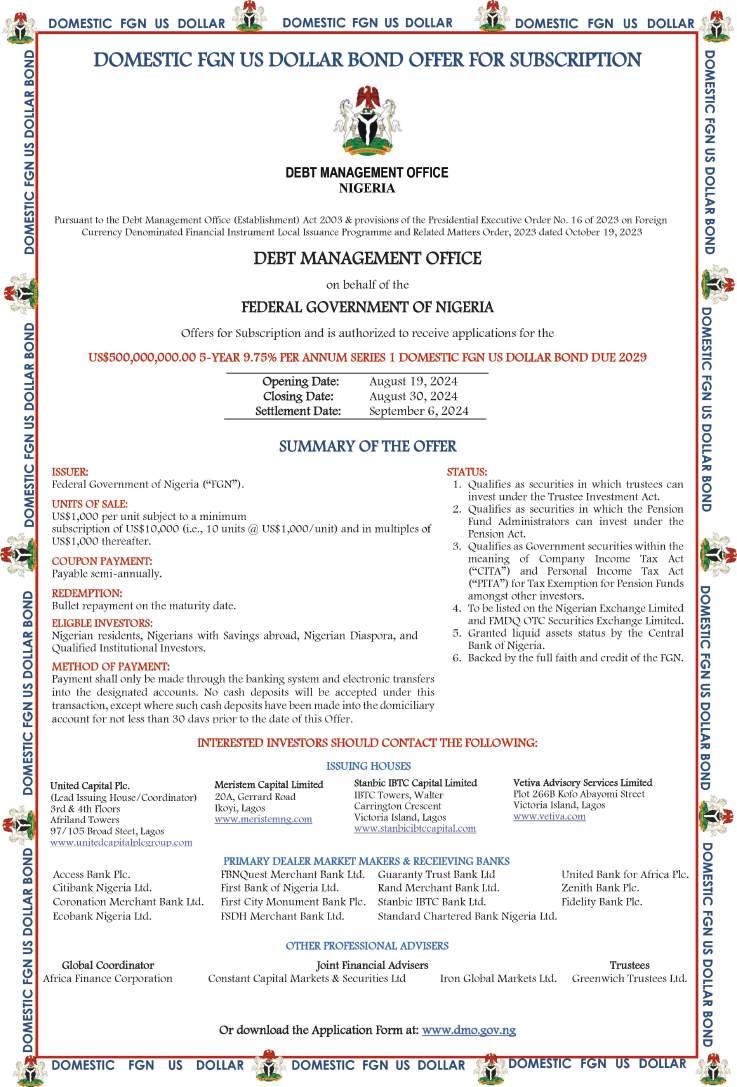


The African Export-Import Bank (Afreximbank) has released its consolidated financial statements for the six months ended 30 June 2024.
The Group’s results for the six months once again demonstrate resilience amid challenging macroeconomic conditions.
In a statement, the Group announced that it delivered solid year-on-year growth across key performance metrics and an increase in shareholder value.
Net Interest Income for first half (H1) 2024 grew by 24.5 per cent to $826.2 million, compared to $663.6 million for the same period last year (H1’2023). The increase was driven by a 31.42 per cent increase in interest income to US$1.5 billion, on the back of growth in the bank’s portfolio of Loans and advances.
The Group’s performance for the
period reflected that of the Bank as subsidiary entities are still in their early stages of development, with the notable exception of the Funds for Export Development in Africa (FEDA) which contributed $11 million to the Net Interest Income of the Group, compared to $9.1 million at H1’2023.
The Group’s total fees and commission income for H1’2024 increased by 20.07 percent to $71.2 million, compared to $59.2 in H1’2023. During the period, the Group continued to make strategic progress in its mission to develop African trade, including deepening ties with Caribbean countries and the broader diaspora. Operating expenses increased by 30.38 percent, to $152.8 million, compared to $117.2 million at H1’2023 reflecting higher personnel and administrative costs
company, which is N287 billion. The following year, in 2021, the company's profit grew to N674 billion. By the third year, in 2022, the profit jumped to N2.5 trillion.
Nigerian National Petroleum Company Limited (NNPCL) yesterday released its 2023 Audited Financial Statement (AFS), declaring a net profit of N3.297 trillion at the close of the financial year, which ended in December 2023. NNPCL said this amount represented an increase of over N700 billion or 28 per cent compared to the 2022 profit of N2.548 trillion.
Yesterday, also, the federal government announced that NNPCL would begin sale of crude oil to Dangote Refinery on October 1. According to a post in the official X (formerly Twitter) handle of the Federal Ministry of Finance, Minister of Finance and Coordinating Minister of the Economy, Mr. Wale Edun, disclosed this at a meeting of the Implementation Committee in Abuja.
However, former Vice President and the presidential candidate of Peoples Democratic Party (PDP) in the 2023 general election, Alhaji Atiku Abubakar, described as opaque the allegation of continued payment of oil subsidy by the President Bola Tinubu government.
Giving a breakdown of the national oil company’s results in Abuja, NNPCL’s Chief Financial Officer, Mr. Umar Ajiya, said when the new management took over, the company was a loss-making corporation, but NNPCL was able to break even at the end of 2019.
Ajiya stated, “By 2020 we had produced the first profit ever for this
“Now, in 2023, the profit has also grown by 28 per cent, from N2.5 trillion to N3.297 trillion.”
On the asset side, in 2019, Ajiya said the national oil company held an asset base of N8 trillion, and N9.5 trillion in 2020, but by 2021, following the movement of the Joint Venture (JV) assets to the company, the non-current assets grew to N15.3 trillion.
“The transfer of the assets in 2022 saw us grow from N15.3 trillion to N37 trillion of assets. And that has doubled in 2023, resulting from investment and translation difference,” Ajiya added.
Part of the presentation made by NNPCL also showed that it pledged a total 67,000 barrels per day (bpd) for its $1 billion debt on the rehabilitation of the Port Harcourt refinery under “Project Yield”. The commencement of the refinery had been postponed about six times.
NNPCL also indicated that it had a 21,000bpd pledge on an NEPL loan of $0.950 billion under “Eagle 2 Project” for general corporate purpose while under Project Gazelle, it pledged 90,000 bpd for a $3.3 billion debt for forex stabilisation.
The data equally showed that the 35,000bpd pledged to Dangote refinery for a $1 billion debt under project Bison had been fully offset. It was the same for Project Brogues, wherein 8,000bpd was pledged for $0.3 billion loan amount, but had been settled.
Pol I ce Inv IT e nlc Pre SID en T for Que STI on I ng over Terror IS m fI n A nc I ng, Tre AS on, oTH er S
you were mentioned.
“You are hereby invited to interview by the undersigned on Tuesday, August 20, 2024 by 10 am prompt at the IRT Complex by Old Abattoir by Guzape Junction in Abuja.
“Be informed that in the event of failing to honour this letter, the office will have no alternative than to activate a warrant of arrest against you please.’
The police had on July 7, conducted a night raid on the NLC national secretariat in Abuja, a move that triggered media war between the organised labour and the police.
Explaining the basis of their action in a statement by Inspector General of Police Kayode Egbetokun, the police said a prime criminal suspect in an ongoing investigation was traced to a shop within the building in the Central Business District, Abuja.
The statement signed by Force Spokesperson, ACP Olumuyiwa Adejobi, explained that detectives armed with the appropriate legal authority, conducted an operation at the location, which turned out to be the NLC building.
"The Nigeria Police Force, has noted a publication alleging that the Nigeria Labour Congress (NLC) National Secretariat, known as the Labour House, located in the Central Business District, Abuja, was raided by the Police.
“On August 7, 2024, a press release issued by the NLC’s Head of Media
to support the initiatives of the Bank and subsidiaries amid high inflationary external environment.
The Cost to Income Ratio remained low at 16.98 percent, well within the strategic upper limit of 30 percent.
“The winding down of the Ukraine Crisis Adjustment Trade Financing Programme for Africa (UKAFPA) facilities as African economies demonstrated resilience and adapted to the crisis, resulted in a marginal decline in Loans and advances from $26.7 billion to $26 billion. “Cash and cash equivalents closed the period at $3.9 billion (FY 2023: US$5.6 billion), while the Liquid Assets to Total Assets ratio remained high, at 12.50 percent,” it added.
The Group’s Shareholders’ Funds rose by 1.64 per cent to
According to Ajiya, NNPCL is expected to produce its financial statements in dollars and translate it to Naira. He explained that the key summary highlighted that NNPCL had a N23.9 trillion revenue, which resulted in a gross profit of N7 trillion, net operating profit of N4.3 trillion, and profit before tax of N5.9 trillion. He pointed out, “Consequently, we ended the year with N3.297 trillion as profit after tax. On the asset side, because of sizeable amount of receivables, the total assets position stood at N246 trillion. Of course, when we look at the other side of the balance sheet, total liabilities equate to the same. In terms of cash and bank holding at the end of the year, we had N7.7 trillion in the banks.”
Ajiya stated that the final dividend was declared last Friday, with the shareholders' funds amounting to N 2.1 trillion, net and interim dividend at N536 billion, and net profit margin for the group at 14 per cent, while the operating profit margin stood at 18 per cent.
With N200 billion share capital, NNPCL pegged earnings per share at N16.49 per share, while dividend per share stood at N11.11, and dividend pay-out was 80 per cent.
Ajiya added, “And the return on equity is at 12 per cent. And the current ratio, which shows our ability to settle our current liabilities, is at 1.1 per cent. So it means we have sufficient near limit assets to settle our current liabilities 100 per cent. In terms of debt to assets, it's literally 1.8 per cent, so long-term survival of the company is assured.”
The chief financial officer stated that it was unlike in the past, when, as a corporation, NNPC had to get a going concern sustainability letter from the Federal Ministry of Petroleum Resources.
and Public Relations alleged that officers of the Nigeria Police Force, along with some individuals in black T-shirts and others in plain clothes, raided the Labour House.
"The Nigeria Police Force wishes to clarify that a prime criminal suspect in an ongoing investigation was traced to a shop within the building in the Central Business District, Abuja. Detectives, armed with the appropriate legal authority, conducted an operation at the location, which turned out to be the NLC building," the statement stated.
He said the well-coordinated, lawful operation was solely aimed at apprehending the prime suspect – a foreign national implicated in numerous criminal activities across Nigeria and other African countries.
Egbetokun said the operation had no connection with the NLC, its secretariat, staff, or leadership, noting that the NLC Secretariat was not the focus of the operation, but a rented shop within the building used by the suspect as a front for his criminal activities in Nigeria.
"The Nigeria Police Force seeks the cooperation and support of the NLC leadership as we continue this investigation, which is vital to safeguarding our nation.
“The high-profile nature of the suspect poses a significant security threat to Nigeria and other African nations, making this investigation crucial for the safety of all involved, including the NLC," IGP said.
$6.2 billion compared to $6.1 billion at FY 2023, reflecting growth in internally generated Net Income of $407.7 million.
However, the bank’s Capital Adequacy Ratio remained strong at 25 per cent.
At the Afreximbank Annual General Meeting held in Nassau, The Bahamas in June 2024, shareholders had approved a dividend of $264.6 million and other appropriation amounting to $50 million to support concessionary funding.
Mr. Denys Denya, Afreximbank's Senior Executive Vice President, commented:
"Afreximbank Group reported a strong performance in the first half of 2024, delivering robust financial results and making significant strides in its implementation of the 6th Strategic Plan - Extending
take from this company of yours stood at N8.6 trillion. N537 billion has been paid as interim dividend. There is now N2.1 trillion dividend finally declared for payment.
“We also have royalties paid from our own operations of N2.15 trillion. We also have taxes, levies, and statutory deductions amounting to N2.6 trillion.
“To clarify and to make it very clear, we have seen also information out there that the company is overleveraged. That is false.”
Ajiya explained that NNPCL will announce an Initial Public offer (IPO) once the shareholders and board made a decision.
In apparent response to earlier reports, which went viral, that Tinubu had approved fuel subsidy payments by NNPCL, Ajiya said the company was only taking care of petrol importation shortfalls between it and the federation. He state that NNPCL had not paid any subsidy to any company in the past nine years. "No marketer has received any money from us in the name of subsidy payment in the last eight or nine years, not a dime."
Speaking earlier, Chairman of NNPCL board, Chief Pius Akinyelure, said the performance came as the fruit of the Petroleum Industry Act (PIA) 2021, as well as the commitment of the board, management and staff of the company.
Akinyelure added that the shareholders of the company had since approved a final dividend of N2.1 trillion in line with PIA 2021 provisions.
He said, “So in totality, in 2023, we will say that the government, all types of government, the government
Power, Minister of Power, Chief Adebayo Adelabu, explained that the lawmakers must continue to pile pressure on the executive to ensure that debts owed players in the sector were paid.
Adelabu said, “In terms of markets and liquidity, government is also owing these companies, but they have started paying them little by little. Just about three weeks ago, out of the about N1.3 trillion we are owing the Generation Companies (Gencos), we were able to pay them N205 billion. And they are also happy.
“But I will plead with the members of the House committee to help us mount pressure on the executive to continue to pay these people.”
The minister explained that with the current economic hardship in the country, including fuel scarcity, Nigerians must not be made to face another national blackout which would further reduce their quality of life.
He stated that Nigeria needed to renew the infrastructure in the power sector, and rejig the current tariff policy, maintaining that all the segments of the power sector need to be worked on. According to him, “A lot of the
the Frontiers.
“The bank continued to demonstrate its commitment to enhancing Africa’s economic resilience, by helping countries mitigate the negative effects emanating from the external challenges, advocating for the Continent’s interests on the global stage, and contributing to "Global Africa" by connecting the continent with its global diaspora through strategic interventions.
“The strong results achieved during this period were delivered against a backdrop of a continuously challenging and evolving macro environment, reflecting the effectiveness of the Group’s strategy and its commitment to operational excellence.
“Leveraging its healthy financial position, the Group will continue to play a central role in the implemen-
NNPCL will begin the sale of crude oil to Dangote Refinery on Ocober 1, the federal government disclosed on Monday.
Edun had last week inaugurated a technical sub-committee tasked with developing the framework for the sale of crude oil to local refineries in naira.
However, the tweet, where the development was announced, was silent on when sales to other local refineries in naira will commence.
The post was captioned, "HM Wale Edun Presides Over Meeting on Crude Oil Sales in Naira Implementation."
It read, "The Honourable Minister of Finance and Coordinating Minister of the Economy, Mr. Wale Edun, today (Monday) led the Implementation Committee meeting on the transition to Crude Oil Sales in Naira.
"The meeting reviewed progress on key initiatives, including the upcoming commencement of Naira payments for crude oil sales to the Dangote Refinery starting October 1, 2024.
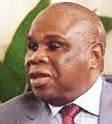
In her remarks at the briefing, Executive Vice President, Upstream, Mrs. Oritsemeyiwa Eyesan, said with improvements witnessed as a result of the renewed vigour in the war against crude oil theft and pipeline vandalism, NNPCL was targeting two million barrels per day crude oil production by the end of the year.
towers are falling. The substations are dilapidated with very old transformers, some of them were installed in the 60s. We have not been able to replace them. The same thing with distribution infrastructure. The substations at the distribution level are also not working properly.”
Describing the metering gap as wide, Adelabu stated that out of over 12 million electricity customers nationwide, just a little over five million were metered, leaving a gap of over seven million meters.
He said the mandate of the ministry was to achieve the installation of two million meters on a yearly basis for the next five years, and expressed the hope that the sector that was hitherto deemed to be jinxed in the last 15 years was fast coming back.
On the Siemens project, Adelabu stated that the pilot phase was being gradually rounded off, stressing that several equipment from the project are already being installed nationwide. He said, “We went to Germany together and we had a meeting with the German Chancellor that we needed to accelerate implementation of the presidential power initiative, which you all know as Siemens
"Dr. Zacch Adedeji, Executive Chairman of the Federal Inland Revenue Service @FIRSNigeria and Chairman of the Technical Sub-Committee, reported that the first PMS delivery from Dangote is expected next month under existing agreements. " It stated that key roles were outlined for stakeholders, including the Nigerian Midstream and Downstream Petroleum Regulatory Authority (NMDPRA), Central Bank of Nigeria (CBN), Nigerian Upstream Petroleum Regulatory Commission (NUPRC), and African Export-Import Bank (Afreximbank), to ensure smooth implementation.
Updates on the Port Harcourt and
project.
“And the following month, we had a meeting in Dubai and we signed an acceleration agreement to ensure that we continued with this project. And I can tell you, within one year, we have almost concluded the pilot phase of this project.
“The pilot phase included importation, commissioning, and installation of 10 power transformers across Nigeria, 10 power mobile substations across Nigeria. So the improvement you see today is not accidental. It's not due to rainfall.
“Hydroelectric power in Nigeria today is just a bit over 20 per cent of our total power generated. The remaining almost 80 per cent is from gas. So it's not rain, but by the intentional activities of the federal government through the ministry of power. That's why we are seeing all those improvements.”
In his remarks, Chairman, House of Representatives Committee on Power, Hon. Victor Nwokolo, urged the minister to ensure that Nigeria did not fall below the 5,000mw it recently achieved.
Nwokolo said without electricity supply, many companies will shut down, with the attendant loss of
Dangote refineries were also provided, with significant production increases expected from November 2024.
The post further disclosed the Edun emphasised the need for transparency and directed the technical sub-committee to finalise details and prepare a report for the president, confirming that his directives are on track for implementation from September.
The Federal Executive Council (FEC) had on July 29 approved Tinubu’s proposal for NNPCL to end the sale of crude oil to local refineries in foreign currency, culminating in the approval that the 450,000 barrels meant for domestic consumption be offered in Naira to Nigerian refineries, with Dangote refinery as a pilot.
Following the development, Edun inaugurated a technical sub-committee last Thursday in Abuja, chaired by him.
Atiku: Alleged Payment of Oil Subsidy Another Chapter of Opaque Governance under Tinubu Atiku described as opaque the payment of oil subsidy by the Tinubu administration.
The former vice president said iin a statement, "The latest revelations circulating through credible media outlets regarding the federal government's covert continuation of the subsidy on Premium Motor Spirit (PMS) represent another chapter in the opaque governance under President Bola Tinubu’s administration.
"This development starkly contrasts with the president's firm assertions in a national broadcast, which followed closely on the heels of public protests decrying poor governance, where he declared the subsidy regime concluded.
"However, disclosures prior to his announcement have consistently
jobs, thereby making insecurity even worse.
He proposed that there should be stricter laws against power assets vandalism, which had become a menace in recent times.
The lawmaker also insisted that regarding the recent increment in tariff for selected customers, due process was not followed, and that was why the lawmakers opposed the move. He stated, “If you look at the electricity act, it said that increment in tariff must be phased over a period of time. Above all, it must be gazetted in different languages. Meaning that there must be adverts, there must be consultations, there must be town hall meetings here and there.” He stated that the federal lawmakers were looking at ways to end the destruction of power assets nationwide.
“We were also looking at some amendments where we have to bring very stiff punishment for vandals, not just those who are buying it. So, there are a lot of amendments that will still come,” Nwokolo said. He suggested the incorporation of local vigilance groups into the security of electricity assets to protect them from vandals.

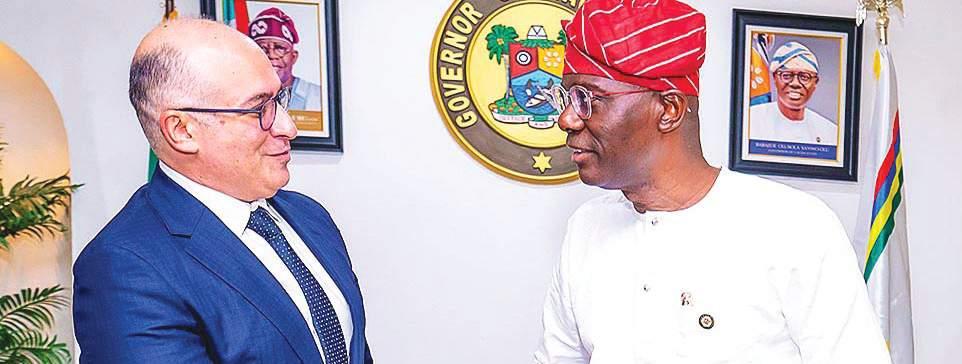
Call by the management team of ameriCan hospital Dubai...
Prioritise due diligence, legal consultations in contract negotiations, TI, CISLAC tell FG, state governors
Nigeria’s former Minister of Justice and former Attorney General of the Federation, Michael Aondoakaa, has said the Chinese firm, Zhongshan Fucheng Industrial Investment Co. Ltd, was completely wrong to have seized three of Nigeria’s presidential aircraft, arguing that the aircraft were not used for commercial purposes, but purely for running of state operations.
Aondoakaa, also revealed that the Nigerian government was fully involved in the dispute between Ogun
State and Zhongfu, the Nigerian subsidiary of Zhongsang, because of the trade treaty that was signed between the Nigerian Government and the Republic of China in 2001, which allowed access for contracting investors into Nigeria.
The former AGF said this in an interview on ARISE NEWS yesterday, where he discussed the legal dispute between the Ogun State government and Zhongfu, a Chinese firm whose contract was revoked under Amosun’s administration, which led to a Paris court ordering the seizure of three jets belonging to the Nigerian government over an arbitration award in favour
of the Chinese firm.
He said, “If you look at the issue of attachment of presidential planes, that is where completely, the foreign firms are wrong.”
He went on to explain, “But now, sovereign immunity operates in two ways. What the Appeal Court in US dealt with was the procedure, the procedural aspect.
“I’m afraid when people will say Appeal Court said, or US said they can attach Nigerian properties everywhere. I don’t think that was its extreme position.
“When you register, the country will evaluate it. And two areas the
country will look at are: Did the arbitrators who rendered the final arbitral award exceed their jurisdiction, or was the arbitral award contrary to public policy?
“Nigeria is not hinging it on the issue of public policy, that is it, but of course, issuing of the issue of sovereign immunity.
“But now, where I have a major quarrel with the Chinese people is that the sovereign immunity, even though after the New York Con- ventions have been classified into two- absolute sovereign immunity with properties that belong to the state which the state uses for operation
Wale igbintade
Human rights lawyer, Mr. Femi Falana SAN has condemned the N21 million monthly running cost per senator describing it as illegal and contemptuous of a subsisting court judgement.
Falana in a statement issued yesterday said that there is no provision whatsoever for monthly payment of N21 million running costs to every Senator in the 2024 Appropriation Act, submitting that, the payment is illegal.
He explained that since the running cost was not fixed by the Revenue, Mobilisation, Allocation and Fiscal Commission (RMAFC), it is unconstitutional and contemptuous of the valid and subsisting order of the Federal High Court.
He urged the lawmakers to comply with the law of the land, or face contempt proceedings as the lawmakers are not above the law of the land.
Falana argued that having just enacted the Minimum Wage Act that stipulates N70,000 for workers, the jumbo emolument of N21 million for federal legislators would compound the crisis of inequality in the country.
According to the statement: "N21 million running cost is illegal and contemptuous. Sometime in March 2018, Senator Shehu Sani, from Kaduna State and a member of the ruling All Progressives Congress, blew the whistle over the jumbo salaries and allowances of federal legislators in Nigeria. Senator Shehu Sani had, in an interview with the News Magazine, on the 8th of March
2018 revealed that “each senator receives N13.5 million monthly as
running cost in addition to over N750,000.00 monthly consolidated salary and allowances”.
"The disclosure led to the institution of Suit No FHC/L/ CS/790/2018- Monday Ubani v The Senate & Ors at the Federal High Court where the plaintiff challenged the constitutional validity of the humongous salaries and allowances of the legislators.
"Two NGOS, the Socioeconomic and Accountability Project (SERAP) and Enough is Enough (EIE) filed similar suits in the same court where they prayed for the annulment of the total package of N14 million per month for a Nigerian senator.
"Both chambers of the National Assembly mounted a vigorous defence of the salaries and allowances fixed for the legislators by themselves.
"In a landmark judgment delivered on June 4, 2021 in the consolidated suits, the trial judge, Justice Chuka Obiozor declared that the Senate, the House of Representatives and the National Assembly service Commission “have no power, close or semblance of power and cannot determine, direct, command and/or instruct the 2nd defendant (RMAFC)) or any person howsoever, to make, determine and/or fix the salaries, wages, remuneration, running cost or allowances of the 3rd and 4th defendants.”
"Having ruled that the RMAFC (2nd defendant) is the only body responsible for determining the salaries, remuneration and/or allowances of the National assembly or political office holders, the court held that “In line with Section 32 (b)(d) of part 1 of third schedule of the Constitution of the Federal
Republic of Nigeria, 1999 as amended, the 2nd defendant should forthwith downward review and fix the salaries, remuneration or allowances of the 3rd and 4th defendants to reflect the economic realities in the country.
"In utter contempt of the orders of the Federal High Court, the current leadership of the National Assembly increased the salaries and allowances of a Senator from N14 million to N21 million per month.
"This was confirmed last week by a member of the 10th Senate and Senator representing Kano South senatorial district of Kano State on the platform of New Nigeria Peoples Party (NNPP), Abdurrahman Kawu
Sumaila who revealed that he earns approximately N21million monthly in salary and allowances.
"The lawmaker made this revelation while speaking to BBC Hausa Service.
"Apparently embarrassed by Senator Sumaila's disclosure, the National Assembly leadership has said that the N21 million is the "running cost" of each Senator per month.
"The defence is a careless attempt to pull wool over the eyes of Nigerians. It is pertinent to point out that the running cost of parliament is the total money spent regularly to make the organization working.
of State, not for commercial bases, are immune. They’re considered sovereign immunity.
“For instance, military hard wares, presidential planes - because presidential planes are not used for commercial purposes. Presidential planes are used basically for state functions, and those ought to ensure absolute sovereign immunity.”
Aondoakaa, then revealed that in 2001, a treaty for the Reciprocal Promotion and Protection of Investments was signed between China and Nigeria, which, “guaranteed all contracting investors, which is broadly defined, into Nigeria, and gave them even a provision for expropriation, which means you cannot take over their asset.”
He then said the treaty signed in 2001, contained a clause that talked about expropriation, which allowed for compensation if the state takes a step that depreciates investments.
He explained, “Ogun State seems to be part of the country, and when you’re dealing with a treaty, it was the federal government that entered into that investment treaty. It was done in 2001, and signed by the Minister of Industry. And I’ve seen the contents of the treaty, very strong contents of the treaty. I was very worried whether the Ministry of Justice, even that of Ogun State or the Ministry of Justice of Nigeria was consulted. The first issue I looked at was Article 4 of it, which talked about expropriation.
“The treaty had three areas, two strong arbitration clauses in paragraphs 8 and 9. The best venue we could have got was one of the paragraphs that gave a right to court,
and these people had attempted to go to court in Nigeria. “If we were clever, we would have had a counterclaim, even when they withdrew their action, they wouldn’t have resorted to going back to arbitration.
"But there wasn’t a counterclaim, because you have alleged that they violated some of the terms of the contract, that must have been the basis on which Ogun State terminated.
“And therefore, when they filed an action in the first instance, Ogun State ought to have raised a counter claim, I do not know why they didn’t, because if they had raised a counter claim, even if you withdraw your action, the counter claim being a separate course of action, it would have remained, and that would have been the live wire.” the former minister of Justice stressed.
Meanwhile, CISLAC and TINigeria, yesterday, on the federal and state governors to prioritise due diligence and legal consultations in contract negotiations.
In a statement signed by its Executive Director, Auwal Musa Rafsanjani, CISLAC/TI-Nigeria expressed concern over the escalating legal battle, which stems from a 2007 agreement for the development of the Ogun Free Trade Zone.
Rafsanjani emphasised that the fallout from the poorly managed contract resulted in significant financial losses and tarnished Nigeria’s international reputation. He urged state governors and government officials to fully understand the legal and ethical complexities of international agreements before entering into them.
olusegun samuel in Yenagoa
The Administrator of the Presidential Amnesty Programme (PAP), Dr. Dennis Otuaro, has encouraged students under the programme’s foreign scholarship scheme to justify the federal government’s investment in them by taking their studies seriously.
Otuaro gave the advice during his meeting with the PAP scholarship students currently studying in the United Kingdom on Sunday.
Otuaro said in a statement by his Special Assistant on Media, Mr. Igoniko Oduma, on Monday, that much was expected from the students in their academic performance to justify the federal government's
investment in their education.
Otuaro told them that the PAP scholarship scheme had produced large number of graduates who made first-class and second-class upper divisions in competitive disciplines, including the sciences and clinical sciences.
He urged them to sustain the story of academic excellence by their counterparts back home in the foreign country.
According to him, many PAP graduates are doing very well in their post-graduation endeavours and contributing significantly to national growth and development.
The PAP boss stated that his administration was putting measures in place to make the scholarship
scheme more robust to bridge the human capacity gap in the Niger Delta.
Otuaro said he would continually prioritize the scholarship and welfare of students studying in Nigerian and foreign universities under the ongoing reintegration phase of the programme.
He said this was in tandem with the vision of President Bola Tinubu for the peace, security, stability, and socio-economic development of the Niger Delta, as encapsulated in his Renewed Hope Agenda.
Otuaro stated that Tinubu was delighted by the success stories and the sterling academic performances of the programme's scholarship students at home and abroad.
He said the president, encouraged by the excellent academic feats, had expressed a strong commitment to supporting the office to deepen initiatives in educational and vocational training for youths in the region.
He thanked the president for his favourable disposition to the office and his efforts to foster the transformation of the region through his Renewed Hope Agenda.
Otuaro therefore urged the students to be good ambassadors of the PAP, their respective communities, the Niger Delta and the federal government, by shunning negative acts that would bring a bad reputation to the country as a whole.
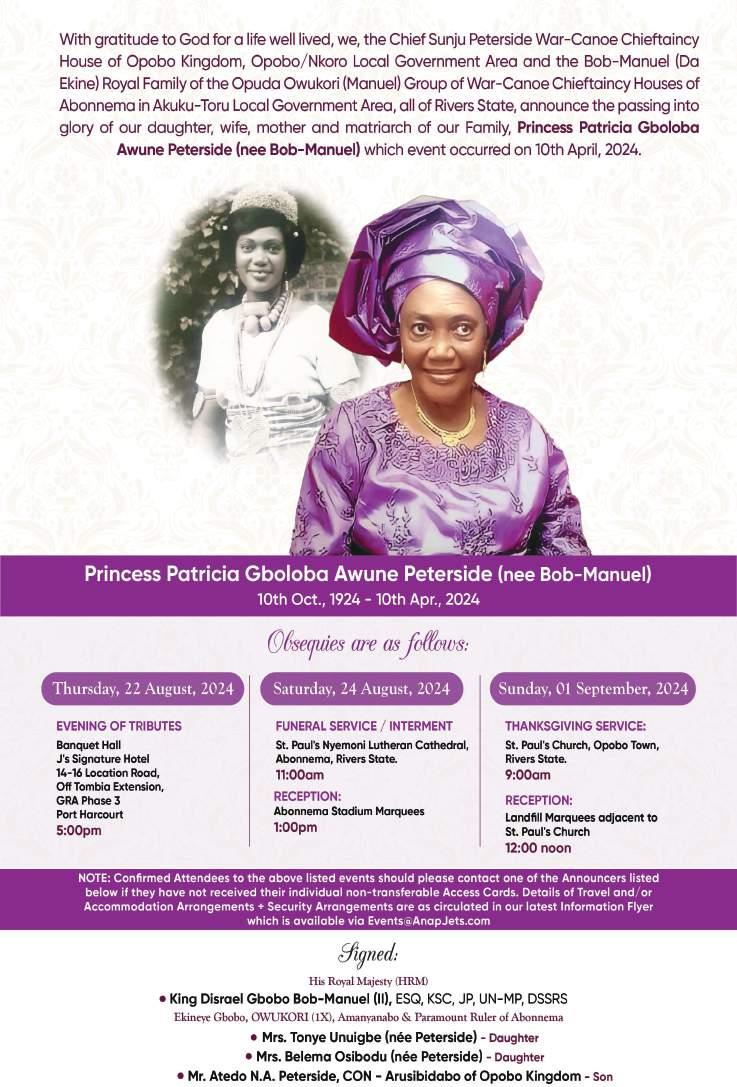
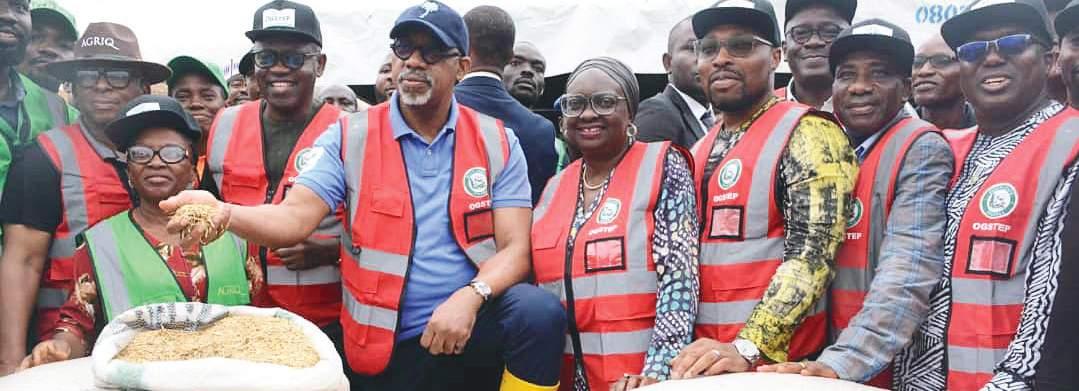
L-R: Permanent Secretary, Ministry of Agriculture and Food Security, Mrs. Kehinde Jokotoye; Secretary to Ogun State government, Mr Tokunbo Talabi; Ogun State Governor, Prince Dapo Abiodun; Deputy Governor, Engr. Noimot Salako-Oyedele; Commissioner for Agriculture and Food Security, Mr Bolu Owotomo; Head of Service, Mr Kehinde Onasanya; and Deputy Chief of Staff, Dr. Oluwatoyin Taiwo, during the flag-off of the 2024 Rice Harvesting Season at Magboro, Obafemi Owode Local Government... yesterday
Ogun State has joined the league of rice-producing states in the country with the flagging off of the harvest of 200 hectares of farmland at Magboro Rice Farm in Obafemi-Owode Local Government Area of the state.
The farm is the brainchild of the Ogun State Economic Transformation Project, supported by the World Bank and aimed at driving economic growth and development in the state.
Speaking on the occasion, Abiodun said with the flag-off, Ogun State was not only joining states like Lagos, Kebbi, and Bayelsa in producing locally grown rice for consumption, but also fostering economic development, creating jobs, and improving livelihoods within the communities.
The Inspector General of Police, Kayode Egbetokun, yesterday reassured the public that the police under his leadership were dedicated to maintaining peace and order as well as national security.
He also vowed to continue to invest in training of personnel to ensure that officers of the Nigeria police are prepared to effectively and adequately respond to dynamics of crime and criminality in Nigeria.
Egbetokun expressed this commitment in Nasarawa state, during the closing of the training of operatives of the Special Intervention Squad (SIS), which held at the Police Mobile Force training camp, Ende Hills, Nasarawa.
A statement by force spokesperson, Olumuyiwa Adejobi, said the police boss applauded the operatives of the Special Intervention Squad (SIS) for their dedication and resilience as they successfully conclude their intensive tactical training program.
The completion of the rigorous training, Egbetokun said, underscored the commitment of the SIS to ensure safety and security in communities.
He emphasised the importance
of focus, determination and professionalism in the face of evolving challenges in law enforcement, with the launching of the Special Intervention Squad as part of his vision of emplacing a police force that is professionally competent and service-driven in strengthening national security.
He noted that the event signified a milestone in the SIS initiative, which would soon be enacted in all states across the federation.
In his address, the Governor of Nasarawa State, Abdullahi Sule, commended Egbetokun and his team for the establishment of the squad and the timely training of its members.
In her remark, the Minister of State Police Affairs, Imaan Sulaiman-Ibrahim, also reaffirmed the federal government's commitment to consistently supply the essential resources required for efficient policing across the nation.
In attendance, at the closing ceremony, was the governor of Nasarawa State, the National Security Adviser, the Minister of Police Affairs, the Chairman Police Service Commission, Stakeholders, and delegates from the US Embassy.
He said: "This is a 200-hectare rice farm. The farmers are mainly women and youths from all parts of the country and not just from Ogun State alone.
"Each farmer was allocated one hectare of farmland; this means that we have 200 farmers in this cluster. This project started in April this year. They began planting in May, and today we are already harvesting, making it a three-month cycle. It means that we can do this three times a year.'’
Abiodun noted that the farm, with a seven metric tons yield per hectare, could translate to 1,400 metric tons for 200 hectares of milled rice with an efficiency yield of about 70 percent, which would also translate to about 20,000 bags of milled rice per cycle.
"20,000 bags of milled rice per cycle should be estimated to cost about N1 billion. So, these 200 farmers, made up of women and youths across the country who farm
here in just three months, have a revenue of N1 billion. If they do this three times this year, they will earn N3 billion. We have no business being hungry in Nigeria.
"In this place, I have 12,500 hectares of land, and all we have farmed is 200 hectares that yielded N1 billion for 200 farmers. From here, I can feed the rest of the country. We will scale up this project immediately from 200 to 2,000 hectares.
"We can generate N30 billion in revenue. We can take significant steps towards realising that vision of making Ogun State the food basket of this country," he added.
The governor stated that the project was in line with President Bola Tinubu administration's resolve to eradicate poverty and hunger by providing affordable food to Nigerians, adding that the project, apart from increasing rice production, would also address animal husbandry.
Abiodun emphasised that the state
is blessed with adequate manpower and natural resources, stating that agriculture remains an important agenda of his administration as it provides employment and raw materials for the numerous industries that abound in the state.
He said the OGSTEP Agricultural Sector Intervention will provide critical support, including advanced agricultural techniques, access to quality seeds, modern irrigation systems, and technical training for farmers, adding that the approach is offered to beneficiaries at a 65 per cent discount on the cost for each mechanization operation.
While lauding the people, especially members of the communities, for supporting the project, the governor promised that the farm would be provided with solar pumps to power the boreholes, as well as modern drones for effective pest control.
Commissioner for Agriculture and Food Security, Hon. Bolu
Owotomo, said the project was in tandem with the agricultural policy of the Abiodun-led administration: ensuring food sufficiency for the people.
The Economic Adviser, who is also the Commissioner for Finance, Mr. Dapo Okubadejo, while commending the farmers for their determination, noted that the project is part of the agenda of producing food locally to feed the populace.
The Project Coordinator, Mrs. Mosun Owo-Odunsi, said the project, which aims to produce high-quality rice, would positively impact the lives of citizens in all sectors, appreciating the governor for providing the necessary support.
In his goodwill message, the Olu of Magboro, Oba Modiu Alalade, acknowledged the great impact the project has on the communities in the area, stating that the town has enough farmland to accommodate more farmers to produce sufficient food for the country.
Emmanuel
Deputy Speaker of the House of Representatives, Rt Hon Benjamin Kalu, has sparked outrage in his home state of Abia following his declaration that Alex Otti would be unseated in 2027 by whatever means.
Kalu in a video footage of his media interview had declared that Otti would be the last Labour Party governor in Abia. He boasted that as Nigeria's number six citizen, he would not sit by and allow an
opposition party to control Abia.
The Deputy Speaker further stated that Abia must be taken over by his own party, the All Progressives Congress (APC), though he confessed that "I don't know how it will happen".
But while his comments have set off the alarm bell in Abia, a fellow member of the House of Representatives from Abia, Hon. Obi Aguocha, has fired a salvo at Kalu, saying that his comments smacked of arrogance and power drunkenness.
The initiator of the creation of Coastal Areas Development Agency (CADA) in Delta State, Chief Sheriff Mulade, has commended the Sheriff Oborevwori administration for creating the Ministry of Riverine Infrastructure.
Chief Mulade, who is the IbeSorimowei of Gbaramatu Kingdom and the National Coordinator of Center for Peace and Environmental Justice (CEPEJ) while giving the commendation over the weekend however pleaded for statutory status to the ministry.
The peace advocate said the creation of the ministry and the appointment of Chief Ebikeme Clark both indicated that Hon. Sheriff
Oborevwori is a true democrat eager to carry all segments of the state along in his development strides, particularly those in the deprived riverine areas. He commended the governor for his move to solve the problem of infrastructural deficit in the riverine areas by creating the ministry which he said would go a long way in helping to ease the plights of coastal and riverine rural dwellers.
"I must commend Governor Sheriff Oborevwori for this bold step, which is long overdue. It shows that the governor has a listening ear, and I believe through the establishment of this ministry, the riverine areas will be given a sense of belonging, and will equally experience a new lease of life if
adequately funded," Mulade said.
He said the riverine areas play host to mainly maritime, oil and gas production activities, which he said constitute the mainstay of Nigeria's economy.
He, however, noted that the riverine areas lack many basic amenities despite the huge contributions to the development of the state and Nigeria at large.
"We have been crying for years over the deliberate neglect of the coastal dwellers after over seven decades of oil exploration activities, accentuated by the lopsided distribution of socio-economic development," he added.
Chief Mulade also noted that while the move was commendable, he was still bothered about the
prospect of the ministry in terms of its permanence as a statutory agency backed by law.
He therefore appealed to the Oborevwori-led government to send an executive bill to the State House of Assembly to make the Ministry of Riverine Infrastructure a statutory institution to help guarantee its existence beyond his administration and give more assurance to stakeholders that their welfare is paramount to the government. He noted that the infrastructural deficit in the riverine areas of Delta State might not be totally addressed within a few years due to the difficult terrain of the coastal areas that will attract heavy funding to implement viable projects.
Aguocha, who represents Ikwuano/Umuahia North/Umuahia South federal constituency, in a statement Monday told the Deputy House Speaker to perish the thought of unseating Otti come 2027.
As a federal lawmaker on Labour Party platform, Aguocha said he was shocked by Kanu’s "open declaration of Abia State becoming an APC state in 2027", upbraiding him for displaying indiscretion in his "quest for national political relevance."
"My dear colleague, your open vituperation and remarks against our governor, Labour Party, and Abia State was very condescending, denigrating, and disrespectful in every sense of the word," he told Kalu.
The LP lawmaker reminded Kalu that his "patently repeated boasting and referring to yourself as No.6 in the order of leadership hierarchy of the federal government portrays you less as a leader and more like a man with an open display of brazenness and rabid indiscretion".
"My brother, we are distinguished colleagues with you representing the good people of Bende Federal Constituency. Whilst we elected you to be our Deputy Speaker, it does not confer on you an audacity to declare vacant the seat of the governor of Abia State in 2027," Aguocha stated. He warned Kalu to tread cautiously, saying that the Bende Federal Constituency seat being occupied by him is indeed very shaky hence he might not return to the National Assembly in 2027.
According to Aguocha, it was LP
that actually won the 2023 poll in Bende Federal Constituency, insinuating the result was manipulated in favour of the APC and its candidate, Kalu.
"We can also be brazen enough to declare that seat vacant again," Aguocha told the Deputy Speaker. He insisted that as far as Abia State is concerned, "there is no vacancy" in government house come 2027 even if Kalu, as of his own right, is nursing his ambition of becoming governor.Aguocha, who is the Chairman, House Committee on Monitoring and Evaluation of All Standing and Ad-Hoc Committees of the 10th House of Representatives, said that Abians would not bid Otti good bye in 2027 after completing his first term in office.
According to him, Otti's emergence as governor "is the first time Abia has awakened to great leadership and governance strides in almost 24 years", adding that anybody thinking of displacing him in 2027 is daydreaming.
The LP federal lawmaker pointed out that Kalu had even contradicted himself having admitted that Governor Otti is doing well for Abia people and then turning around to say that he would be ousted in 2027. He said that it amounted to "a brazen and uncontrolled outpouring of emotional fury" for Kalu to declare that he was duty bound to deliver Abia to APC and President Bola Tinubu as a payback for favours he received from them.
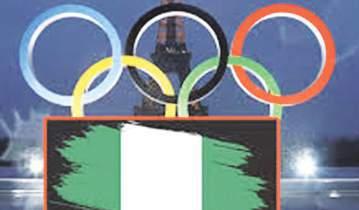
Paris Olympics: We Came, We Saw, We Failed!
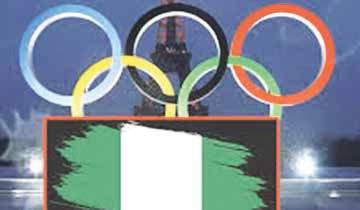


‘The BVAS will be deployed for the accreditation of voters; it is now mandatory that all voters must be accredited electronically. And, secondly, the results will be uploaded to the IREV Portal from the polling units, as soon as the process is concluded.’ - Professor Mahmood Yakubu, INEC Chairman (speaking on the Edo & Ondo Off-Cycle Elections)
‘Last year, after the elections, there were people who openly called for military coup. Since nothing happened to them, others now feel that it’s a normal call once there’s a disagreement with the government of the day, or other persons in the country.’ - Femi Falana, SAN

PROF MIKE OZEKHOME, CON, SAN, FCIArb, PH.D. LLD Constitutional Democracy, means a system of government, in which political and governmental power, is defined, limited and shared by a grundnorm called the Constitution, which provides inbuilt checks and balances.
This column seeks to fiercely discuss constitutional, legal and political issues, with a view to strengthening, deepening and widening the plenitude and amplitude of democracy and good governance, without fear or favour.
The writer of this column, Prof Mike Ozekhome, SAN, is a Constitutional Lawyer, Human Rights Activist, Pro-Democracy Campaigner, Notary Public and Motivational Speaker. He co-founded the Civil Liberties Organisation (CLO), Nigeria’s pioneer human rights league, on October 15, 1987, the Universal defenders of Democracy (UDD), in 1992, and with Chief Gani Fawehinmi and others in 1998, the Joint Action Committee of Nigeria (JACON), to push out the military. In his early days, he lectured at the University of Ife. Prof Ozekhome is an author of many books. He is also a Special Counsel at the International Criminal Court (ICC), at The Hague.
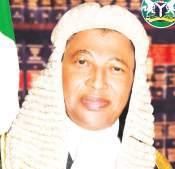

Beckons as Kekere-Ekun Becomes Nigeria’s Second Female Chief Justice
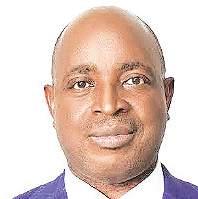
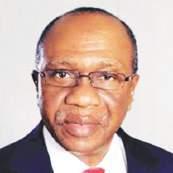
Honourable Justice Olatokunbo Kekere-Ekun, JSC: Making the Women Proud
Presently, the only silver lining in the cloud for many of us in the administration of justice sector, particularly the women and following the #EndBadGovernance (#EBG) Protest, is the excitement of welcoming the Second Female Chief Justice of Nigeria, Honourable Justice Kudirat Motonmori Olatokunbo Kekere-Ekun, JSC, CFR (the first Female to occupy that position, is Honourable Justice Aloma Mariam Mukhtar, GCON, July 2012 - November 2014), not just because history is being made again by a Female, but because #GoodGovernance needs to be injected into the Judiciary, it’s much battered reputation and confidence of the public in the Judiciary being the last hope of the common man, restored - and Justice Kekere-Ekun is up to the task; she’s a Performer.
Personally, I have only appeared before Her Lordship in one matter, when she was at the Court of Appeal, Port Harcourt Division, but, as Editor of this esteemed Publication, ThisDay Lawyer for almost eight years, we can testify to the fact that Justice Kekere-Ekun is hardworking, thorough and firm, as she appears to have delivered the highest number of lead judgements (sound judgements, I might add) that we have reported in the past eight years.
Honourable Justice Kekere-Ekun who was elevated to the Supreme Court in 2013, has been recommended by the NJC to President Bola Tinubu, to be the next Chief Justice in accordance with Section 231(1) of the 1999 Constitution of the Federal Republic of Nigeria (as amended in 2023)(the Constitution). The President, in turn, forwards her name to the Senate for confirmation. By virtue of Section 231(4) of the Constitution, as the position of CJN becomes vacant on August 22, 2024, the President is mandated to appoint the most senior JSC to perform the functions of the CJN until the substantive CJN is appointed - Justice Kekere-Ekun is the most senior. Considering the fact that it has been clear to everyone since 2022 that the position of CJN would become vacant on August 22, I see no reason for there to be any delay in completing the process of CJN appointment timeously, so that by August 22, 2024 as one CJN is retiring, the new one is being sworn in, instead of needlessly leaving the issue to fester for up to 90 days beyond the date of appointment of the acting CJN (see Section 231(5) of the Constitution).
In October, 2023, the UK appointed the first Lady Chief Justice of England and Wales, Baroness Sue Carr, and come September 1, 2024, the new South African female Chief Justice, The Honourable Mandisa Maya, will assume the position. We also look forward to having our own Nigerian Female CJN!
#GoodGovernance vs Non-Performers
In the spirit of #GoodGovernance, one would have imagined that, by now, the Federal Government of Nigeria (FGN) would have rushed to pick two of the juiciest low hanging fruits, to show that it has heard the cry of Nigerians and one of their #EndBadGovernance prayers - to get rid of non-performers - swiftly replacing the bad leadership of NNPCL and those related to Sports, since it is not in the nature of most Nigerians to resign, even in the face of shame arising from non-performance/failure.
Is it fair that, despite the fact that Nigerians are going through an extremely difficult time, they should also be queuing up for fuel incessantly? For the past two years, Nigeria has gone from one fuel crisis to the other; it was also during the era of the present leadership that bad dirty fuel was imported in early 2022 or so, and many vehicles were damaged as a result; is this not enough to show that those in charge of that fuel supply area, are incompetent? Ditto for those in charge of Nigeria’s oil production output, and ensuring that our Refineries are rehabilitated - they are equally as inept or corrupt, or both.
As for Sports Sector, need I discuss Nigeria’s shameful outing at the 2024 Paris Olympics? Nigeria went with 88 athletes, no medal! Botswana took 11 athletes, and won two medals, one gold, one silver. With a N12 billion budget, Nigeria was unable to purchase one bicycle for the competition, so much so, that we shamelessly had to borrow a bicycle from Germany for the Nigerian contestant to ride for the cycling competition! If there’s a word worse than shame, disgrace and humiliating, that’s what would be used to describe Nigeria’s 2024 Olympics outing (similar to that of 2020). Yet, in both Oil and Sports sectors, Nigerians haven’t
onikepo braithwaite
onikepo.braithwaite@thisdaylive. com onikepob@yahoo.com

“It is time to hold President Tinubu to the warning he gave at the November 2023 Cabinet Retreat for Ministers….‘If you don’t perform, you leave us…. Don’t be a clog in the wheel of Nigeria’s progress’…. I submit that those running the affairs of …. NNPCL etc and Sports, are ‘clogs in the wheel of Nigeria’s progress’. Not only have they missed the objective, they are non-performers”
heard of any heads rolling.
It is time to hold President Tinubu to the warning he gave at the November 2023 Cabinet Retreat for Ministers. He said:
“If you are performing, nothing to fear. If you miss the objective, we review. If you don’t perform, you leave us….Don’t be a clog in the wheel of Nigeria’s progress”.
I submit that those running the affairs of the two aforementioned sectors, that is, NNPCL etc and Sports, are ‘clogs in the wheel of Nigeria’s progress’. Not only have they missed the objective, they are non-performers. There is really no justification, for keeping them in their jobs. Nigerians are waiting for the President to keep to his word, and do the needful. Walking the talk, particularly at this time, will inspire confidence in Nigerians and show the people that the President has heard their cry. After all, the welfare of the people is of the utmost importance, more so than keeping non-performers in their jobs. Thankfully, at least, the price of food stuff seems have come down.
Is Patriotism Singing the National Anthem and Reciting the Pledge?
This brings me to the issue of patriotism, something that all Nigerians, including public/ government officials, should embrace; it goes beyond Nigerians singing the National Anthem and reciting the Pledge. How patriotic are some of our so-called leaders and Government Officials themselves? Living lavish lifestyles instead of opting for salary and allowance cuts, seeing as the country is going through difficulty and Nigerians are living in penury. The Liberian President, Joseph Boakai, slashed his salary by 40%, in an effort to cut government expenditure. Last year, the Zambian President, Hakainde
Hichilema ordered that luxury vehicles purchased for government officials be sold; he also rejected the proposal to buy vehicles worth $1.8 million for his entourage. That is patriotism, not singing national anthem. Look at Dubai 30 years ago, and look at Dubai today - the UAE is now considered to be one of the most developed countries in Western Asia. They used the same type of resources Nigeria has, to develop their Emirate. Look at South Korea 60 years ago - a rural agrarian economy with no mineral resources, a country that Nigeria was said to have rendered financial assistance to all those decades ago; today, it has transformed into a First World country. What about Singapore and LKY? Yet, Nigeria, over 60 years post-independence still remains an underdeveloped third world country, the poverty capital of the world. The difference between their leaders and ours, is that their leaders have ‘a love for country’ - patriotism, which they have shown, not by singing national anthem, but by developing their countries and giving their people a good standard of living; ours love themselves.
Though I haven’t read the now-aborted controversial Counter Subversion Bill 2024 (CSB) sponsored by the Speaker of the House of Representatives (HOR), Rt Hon. Tajudeen Abbas, I have seen the highlights; it allegedly purported to slap a N5 million fine or 5-10 years imprisonment or both, on anyone who refuses to sing the National Anthem or recite the Pledge! What a harebrained law, particularly in a democracy! Has Nigeria become a Military or Police State like North Korea, where the people gather round in public places to worship the State and their leader? Are such silly provisions, what is required at this critical
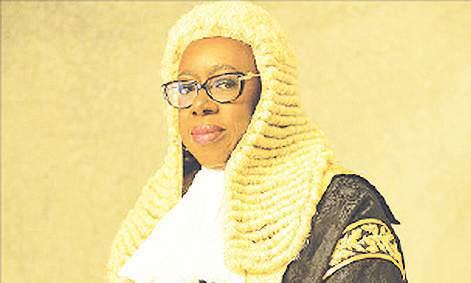
point in time in Nigeria’s trajectory?
Freedom of Expression and the Right to Remain Silent
How would that ludicrous provision about not singing the National Anthem, even be applied? If people attend functions and they don’t sing the National Anthem, will there be Anthem Police to check mouths and arrest those who fail to sing? I thought Section 39(1) of the Constitution guaranteed the right to freedom of expression, which would include the right to speak or not to speak. See the case of Aviomoh v C.O.P & Anor (2021) LPELR-55203 (SC) per Abdu Aboki, JSC.
By virtue of Section 35(2) of the Constitution, even a person who is arrested or detained has a right to remain silent, let alone one who hasn’t committed any crime, but doesn’t want to sing or recite some lines. In Igagbele v State (2006) LPELR-1441(SC) per Walter Samuel Nkanu Onnoghen, JSC (later CJN), the Supreme Court held inter alia that “….the citizen’s right to remain silent, even when arraigned for a criminal offence, is an inviolable one”. One wonders what type of lawmakers Nigeria has, seeking to enact laws that do not meet the basic threshold of constitutionality. Even though Section 45 of the Constitution can restrict or derogate from some fundamental rights, including the right to freedom of expression and peaceful assembly, the right to remain silent is sacrosanct, and not one of the rights that can be derogated from. So, if I don’t feel like singing the National Anthem, no law can force me to. The Constitution allows me to keep my mouth shut!
This kind of unserious, self-serving ridiculous lawmaking, makes one wonder whether some members of the three arms of government, even understand their duties. Their most important assignment, is the security and welfare of the people (Section 14(2)(b) of the Constitution). For one, making Nigerians queue for fuel incessantly, shows a total lack of concern for the people’s welfare on the part of the Executive; and instead of the HOR to exercise its oversight functions to call NNPCL to order, it is instead, trying to enact useless draconian laws.
Aside from the fact that Section 15(5) of the Constitution mandates the State to abolish all corrupt practices and abuse of power, Government has another golden opportunity to show its commitment to #GoodGovernance, by ramping up its fight against corruption. Nigerians are asking whether Yahaya Bello, former Governor of Kogi State is above the law. Why has he not been arrested and arraigned, despite the humongous N80 billion charges that have been filed against him? Some say that the cowardly former Governor is hiding in Kogi State House.
For the avoidance of doubt, the Constitution’s Section 308 immunity against suit and legal process clause, only extends to the persons of the incumbent President, Vice President, Governors and Deputy Governors - it does not extend to those who no longer occupy these positions. Furthermore, nothing in the said Section 308 makes their residences or official archives, inviolable. That inviolability of offices and residences, only applies to Diplomats. Section 1(1) of the Diplomatic Immunities and Privileges Act 1962 provides inter alia for the immunity from suit and legal process, and the inviolability of residences and official archives of foreign envoys and foreign consular officers. Kogi State House certainly doesn’t belong to this category. See the case of African Reinsurance Corporation v J.D.P. Construction (Nig) Ltd (2007) LPELR-216(SC).
Conclusion
The #EndBadGovernance Protesters have threatened to intentionally resume on October 1, 2024, which is Nigeria’s 64th Independence Day. Instead of relying on people that have some leverage on the public, like traditional and religious leaders to convince Protesters not to take to the streets again, Government should seize the opportunity during the intervening six weeks period between now and Independence Day, and show good faith by picking some of the available low hanging fruits like the ones I have outlined above and acting on them. Perhaps, if the people observe some genuine efforts by Government to display their patriotism by taking steps to deliver #GoodGovernance, then not only will there not be a need for another protest, Government will gain the confidence of the people.
Facts
The Respondent instituted an action against the Appellants in Suit No. NHC/26/2003 at the High Court of Rivers State, seeking inter alia, a declaration that the Respondent is a fit, proper and qualified person/candidate to contest for the office of the Oneeh-Eleme, that is, the King of Eleme Kingdom, under the Eleme native law and custom; a declaration that he has satisfied all the essential traditional prerequisites as required by the Eleme native law and custom, for the selection and election to the throne of the One-eh-Eleme. He also sought a declaration that the procedure being adopted by the Appellants in the selection and installation to the vacant throne of the One-eh-Eleme is highly prejudicial and discriminatory to the Respondent, and an order of injunction restraining the Appellants from scheming the Respondent out of the race as a candidate in selection exercise for the King of Eleme Kingdom.
Due to the installation of the 1st Appellant as the One-eh-Eleme, shortly after the Respondent instituted the suit, the Respondent filed an application seeking a mandatory and restorative order of the court reversing the election of the 1st Appellant pending the determination of the suit. The application was heard and dismissed by the trial court. In its ruling delivered on 18th February, 2004, the trial court held that the Respondent had not fulfilled one of the necessary pre-conditions to contest for the stool of the One-eh-Eleme, since by his own averments in his statement of claim, one of the pre-conditions to contest for the stool is that a contestant must be the Paramount Ruler of one of the ten clans making up the Eleme Kingdom, and the position of the Respondent which would have qualified him for the position of One-eh-Eleme is still under litigation in another suit in suit No. NHC/12/2003 pending before the Nchia Division of the High Court of Rivers State. The trial court also held that the right of the Respondent to assert that he was a qualified candidate to contest for the stool could only arise in the future, if Suit NHC/12/2003 is decided in his favour.
Aggrieved, the Respondent appealed to the Court of Appeal in Appeal No. CA/PH/92/2005. The Appellants on their part filed a Notice of Preliminary Objection before the trial court, challenging the justiciability of the claim against the 2nd Appellant, on the ground that it is not a juristic person. The preliminary objection was upheld by the trial court. The Respondent equally filed an appeal in CA/PH/190/2005, against the ruling upholding the preliminary objection. Both appeals were consolidated, heard together and dismissed by the Court of Appeal.
Meanwhile, in the suit before the trial court, the Appellants filed a motion on notice seeking an order dismissing the suit in its entirety. The application was premised on the grounds that the Respondent lacked locus standi to institute the action, and the reliefs sought in the action were not justiciable. In its ruling on the said application, the trial court upheld the preliminary objection and dismissed the suit for lack of locus standi and lack of cause of action. In holding that the Respondent lacked locus standi, the trial court relied largely on its earlier ruling of 18th February, 2004. Dissatisfied, the Respondent appealed to the Court of Appeal. The Court of Appeal allowed the appeal, set aside the ruling of the trial court and restored Suit No: NHC/26/2003 on the cause list of the trial court. Dissatisfied, the Appellants appealed to the Supreme Court.
After a review of the issues submitted by the parties, the Apex Court formulated a sole issue for determination as follows:
Whether the lower court was right to set aside the ruling of the trial court, wherein it was held that the Respondent lacked locus standi to institute Suit No. NHC/26/2003.
Arguments
Counsel for the Appellants submitted that the Court of Appeal had in its earlier decision in Appeal No. CA/PH/190/2005 between the same parties, held that the 2nd Appellant is not a juristic personality capable of suing and being sued, and it ought to have taken judicial notice of the said decision and decline jurisdiction, as a court cannot exercise jurisdiction over
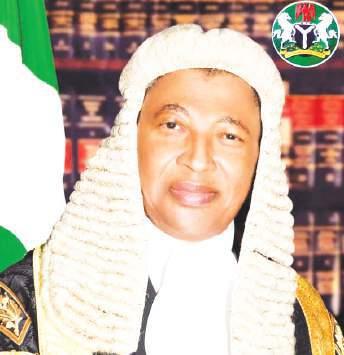
Honourable Adamu Jauro, JSC
In the Supreme Court of Nigeria Holden at abuja
On Friday, the 8th day of March, 2024 Before their lordships
Helen Moronkeji Ogunwumiju Ibrahim Mohammed Musa Saulawa adamu Jauro Tijjani abubakar emmanuel akomaye agim Justices, Supreme Court SC. 99/2010
Between
1. H.R.H. SaMueL OLuKa eJIRe
aPPeLLaNTS (THe ReGeNT aNd CHaIRMaN, eLeMe COuNCIL OF CHIeFS)
2. THe eLeMe COuNCIL OF CHIeFS (OGBO NKPORON, eLeMe) And CHIeF JOHNSON eMeRe NKPORNWI (JP)
ReSPONdeNT (Lead Judgement delivered by Honourable Adamu Jauro, JSC)
a non-juristic person. Counsel cited the case of YOUNG v BRISTOL AEROPLANE CO. LTD (1944) 2 ALL ER 293. He argued further that the 1st Appellant having been sued as the Regent and Chairman of the 2nd Defendant was incapable of being sued in that capacity, thus, occasioning a situation where there was no Defendant against whom the Respondent could maintain the action.
Counsel argued that by the Respondent’s own averments, particularly paragraph 10 of the Statement of Claim, the position of Oneeh-Onne which would have entitled him to contest for One-eh-Eleme is subject of litigation in another suit; hence he disclosed no interest
“….as a general rule, when the issue of locus standi or any other issue bordering on the jurisdiction of court is raised before evidence is led, the only processes to be considered by a court in the determination of whether it has jurisdiction are the originating processes and the reliefs sought therein. Where the action was commenced by a Writ of Summons, the Statement of Claim must determine the locus standi and a cause of action”
in the One-Eh-Eleme title. It was submitted that this amounted to an admission against the interest of the Respondent, and based on the principle of law that courts are bound by the case put forward by parties in their pleadings, the Respondent must be held to the case he put forward in his Writ of Summons and Statement of Claim.
Counsel for the Respondent argued to the contrary, that the Court of Appeal was right in holding that the trial court took extraneous matters into consideration in arriving at the decision that the Respondent lacked locus standi. Counsel submitted that the Court of Appeal rightly held that the trial court ought to have limited itself only to the Statement of Claim, in determining whether the Respondent had the requisite locus standi to institute the action. He submitted that the averment in paragraph 10 of the Statement of Claim, to the effect that there are rival claims to the One-eh-Onne stool, should not be considered in isolation, and a holistic consideration of the averments contained therein would show that the Respondent has locus standi. Counsel finally submitted that the ruling of 18th February, 2004 could not operate as issue estoppel, because the application in respect of which the ruling was delivered was for a mandatory and restorative injunction, not an application in respect of the Respondent’s locus standi.
Court’s Judgement and Rationale Deciding the sole issue, the Supreme Court
held that locus standi is the legal right and capacity of a party to an action to be heard in litigation before a court of law or tribunal, and having the right capacity or locus standi is a condition precedent to the court assuming jurisdiction to determine the case on merit. The Court held that for a Plaintiff to bring an action before a court of law, he must show that he has locus standi by displaying sufficient connection to, and harm, or possibility of harm from the action challenged, and where this is absent, the court would lack jurisdiction for want of locus standi on the part of the Plaintiff, as there would be no dispute for the court to adjudicate over - UWAZURUONYE v GOVERNOR OF IMO STATE & ORS (2012) LPELR — 20604 (SC).
The Apex Court held further that as a general rule, when the issue of locus standi or any other issue bordering on the jurisdiction of court is raised before evidence is led, the only processes to be considered by a court in the determination of whether it has jurisdiction are the originating processes and the reliefs sought therein. Where the action was commenced by a Writ of Summons, the Statement of Claim must determine the locus standi and a cause of action. Their Lordships noted that the Court of Appeal had held that it was wrong for the learned trial Judge to conclude that the Respondent lacked locus standi to institute the action by referring and relying on its ruling delivered on 18th February, 2004, where the trial court had earlier held that it ought not to grant a restorative injunction in favour of the Respondent, who from his own affidavit evidence, had not fulfilled the necessary pre-qualification requirements of being a candidate for the stool of the Onne-eh-Onne which was still in dispute before the court.
In examining the correctness or otherwise of the finding of the Court of Appeal, the Apex Court held that before arriving at the conclusion that the Respondent had not fulfilled the conditions to contest for the stool in its ruling of 18th February, 2004, the trial court had combed through the averments in the Statement of Claim and duly considered the relevant paragraphs in the Statement of Claim; it was thus, incorrect for the Court of Appeal to state that the trial court did not consider the averments in the Statement of Claim, or that the court considered extraneous materials before ruling that the Respondent lacked locus standi.
The Apex Court held that the Statement of Claim was considered in the ruling delivered on 18th February, 2004, and the same issue which had been determined in the earlier ruling, in essence arose for determination in the later application.
The Supreme Court, relying on its decision in P.D.P v Lawal (2023) 12 NWLR (PT. 1898) 205 AT 245, PARAS E — G, held that courts of law have a duty to be consistent in their findings and decisions, and having already made a determination that the Respondent, at the time of instituting the suit, did not meet the precondition to be able to contest for the position of One-eh-Eleme, the trial court was duty bound to reach the same decision in respect of the application challenging the issue of locus standi.
The Court held further that the only remedy for the Respondent in respect of the finding that he did not meet the pre-conditions to contest for the stool was for him to appeal, and he did so by filing Appeal No. CA/PH/92/2005, but the appeal was dismissed. The appeal having been dismissed, the finding became conclusive and binding between the parties. The Apex Court held that since the Court of Appeal had dismissed the appeal in respect thereof, the trial court was right to rely on its earlier decision, in which it had considered the relevant processes and determined the issue submitted for its determination.
The Apex Court thus, resolved the sole issue in favour of the Appellants. The Court however, found that since the suit had not been heard on the merits at the trial court and since the trial court rightly held that the right of the Respondent could arise in the future if the suit pending before the Nchia Division of the High Court of Rivers State in Suit NHC/12/200 to determine the qualification of the Respondent, is decided in the Respondent’s favour; the trial court ought to have struck out the suit rather than dismiss the same. The Supreme Court thus, substituted the order of dismissal of the suit with an order striking out same. Appeal Allowed. Judgement of the Court of Appeal set aside and the ruling of the trial court dismissing the suit restored, however, substituted with an order of striking out.
Representation
Akin Adesomoju for the Appellants.
A. Labi-lawal with B. L. Benson for the Respondent. Reported by
(NMLR)(An
of Babalakin & Co.)
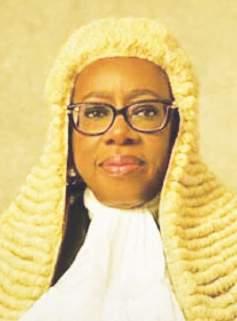
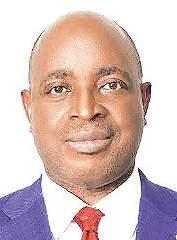
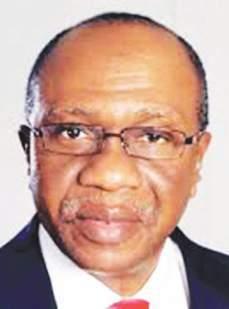
Stories by Steve Aya
The Honourable Justice Kudirat Motonmori Olatokunbo Kekere-Ekun, CFR, the most senior justice of the Supreme Court, is set to be sworn in as Chief Justice of Nigeria (CJN) following the retirement of the current CJN on August 22nd, 2024. She will be the second female CJN in Nigeria’s history, succeeding Hon. Justice Mariam Aloma Mukhtar, GCON, who served from July 2012 to November 2014.
66 year old Justice KekereEkun is expected to serve till May, 2028, when she attains the mandatory retirement age of 70. She will also become the Chairman of the National Judicial Council (NJC), which oversees the appointment, promotion, and discipline of Judicial Officers in Nigeria. Born on May 7, 1958, Justice Kekere-Ekun obtained her LL.B from the University of Lagos in 1980 and an LL.M from the London School of Economics and Political Science in 1983. She was
called to the Nigerian Bar in July 1981. After several years in private practice, she was appointed as a Senior
Magistrate II in Lagos State in 1989. Subsequently, she was made a High Court Judge in 1996. She served as the
She was elevated to
From September 26 to 27, 2024, the Business Recovery and Insolvency Practitioners Association of Nigeria (BRIPAN) will hold its Annual International Conference in Lagos.
The theme of this year’s conference is ‘Restructuring and Insolvency in Times of
The National Drug Law Enforcement Agency (NDLEA) has successfully secured the conviction of 19 drug traffickers, including three kingpins, who were prosecuted and sentenced to various prison terms by the trial court, resulting in a total of 302 years in prison sentences. These convictions followed their arrest and prosecution by the anti-drug agency for trafficking and dealing in illicit drugs such as cocaine, heroin, methamphetamine, cannabis, and opioids.
In a statement on Friday, Mr Femi Babafemi, the Agency’s Director of Media and Advocacy, at the NDLEA Headquarters in Abuja, disclosed this information. He revealed that the convicted individuals were among 414 drug traffickers and dealers prosecuted by the Agency at the Federal High Court across various States, including Benue, Bauchi, Edo, Lagos, Ogun, Gombe, and the Federal Capital Territory (FCT), between July 1st and 31st, 2024.
Some of the Key Convictions according to Mr Babafemi include that of Bolanle Lookman Dauda (50 years old), who was arrested while attempting to cross the LagosBadagry expressway to deliver a consignment in Ghana. He was found with 57.5 kilograms of cocaine. He was sentenced to
21 years in prison or a fine of N30 million by Justice Ambrose Allagoa of the Federal High Court, Lagos.
That of Ikeh Stanley Ifeanyi (34 years old), who was arrested at the Idumota Market in Lagos Island with 1,100 ampoules of fentanyl, a highly potent synthetic opioid. He was sentenced to 14 years in prison or a fine of N2 million by Justice Kehinde Ogundare of the Federal High Court, Lagos.
Christian Anyanwu, was apprehended with 1.4 kilograms of methamphetamine concealed inside custard tins at Murtala Muhammed International Airport while attempting to transport them to Brazil. He was sentenced to 16 years in prison, with four years as mandatory imprisonment without an option of a fine by Justice Yellin Bogoro of the Federal High Court, Lagos.
Other notable sentences include Moses Yakubu, who got 25 years in prison, Oluosun Okikiola, 15 years in prison, Chanchan Terpase, 7 years in imprisonment and Beauty Gani who was sentenced to 30 years in prison or a fine of N8 million.
NDLEA Chairman/Chief Executive Officer, Brigadier Gen Mohamed Buba Marwa (Rtd), on his part, commended the officers involved in these operations and the Judiciary for their role in the swift adjudication of these
cases. He emphasised that these convictions will significantly strengthen the Agency’s efforts to reduce drug supply in Nigeria, the statement further stated.
Economic Challenges’.
A signed statement by the Chairman of the Planning Committee, Albert Folorunsho says “BRIPAN's Annual Conference brings together seasoned Practitioners, regulators, finance and accounting experts, legal practitioners, policy makers and judicial officers, to discuss how the regime of insolvency and restructuring can be a tool for business engineering in challenging economic times.
Given the current economic climate, this year’s Conference will focus on a host of topics
within the brackets of industry specific perspectives and global trends, geared towards enabling businesses to stay ahead.
“People are sometimes uneasy when they hear the words ‘restructuring and insolvency’, but, these are very viable tools in enabling businesses stay profitable and ahead, especially in challenging economic times”.
“The Conference will feature an array of seasoned Speakers, with their incredible insight and experience.”
“The event will take place
at the Muson Centre, Onikan, Lagos.”
BRIPAN’s Annual International Conference plays a key role in engaging stakeholders across board on critical and timely insolvency and restructuring conversations, making BRIPAN’s post-Conference Communiqué, a document well sought after.
“This year’s Conference promises robust discussions on economic optimisation, irrespective of the industry, using the tools of insolvency and restructuring.”
A Lagos Federal High Court has ordered the interim forfeiture of a cash sum of $2.045 million, linked to the embattled former Governor of the Central Bank of Nigeria, Mr Godwin Ifeanyi Emefiele. The trial Judge, Justice Akintayo Aluko, also ordered interim forfeiture of the seven landed properties linked to the former CBN Governor.
The properties are listed as follows: “two fully detached duplexes of identical structures, lying being and situated at No. 17b Hakeem Odumosu Street, Lekki Phase 1, Lagos; an undeveloped/ bare land, measuring 1919.592 sqm with Survey Plan No. DS/LS/340 LYING, being and situate at Oyinkan Abayomi Drive (formerly Queens Drive), Ikoyi, Lagos; a bungalow lying, being and situate at No. 65A, Oyinkan Abayomi Drive (formerly Queens Drive), Ikoyi, Lagos; four bedroom duplex lying, being and situate at 12A Probyn Road, Ikoyi; Industrial complex under construction on 22-plots of land, lying, being and situate in Agbor, Delta State; 8 units of undetached apartments on a plot measuring 2457.60 sqm of land lying, being and situate at
No. 8Am Adekunle Lawal Road, Ikoyi, and a full duplex together with all its appurtenances on a plot of land measuring 2217.87 sqm lying, being and situate at 2A, Bank Road, Ikoyi, Lagos.
Justice Aluko further ordered the interim forfeiture of 2 shares share certificates of Queensdorf Global Fund Limited Trust.
The Judge made the interim forfeiture orders, after taking an application for the orders in a suit marked FHC/L/MISC/500/24, which was filed and moved by the Economic and Financial Crimes Commission (EFCC) Lawyer, Mr Rotimi Oyedepo, SAN, who led Chineye C. Okezie and Zeenat Atiku Bala.
EFCC’s Lawyer, Oyedepo, SAN, in urging the court, said the money and other items sought to be forfeited are reasonably suspected to be proceeds of unlawful activities. Oyedepo also added that the orders sought are pursuant to Section 17 of the Advance Fee Fraud and Other Fraud Related Offences Act No. 14, 2006, Section 44 (2)(B) of the 1999 Constitution of the Federal Republic of Nigeria and the
court’s inherent jurisdiction. He also informed the court that the motion ex-parte is supported by an affidavit deposed to by one Idi Musa, an Investigator attached to the Lagos office of the EFCC.
Parts of the deponent’s averments in the affidavit read:
“that I am one of the operatives of the Economic and Financial Crimes Commission assigned to investigate the damning intelligence report received by the Economic and Financial Crimes Commission in respect of monumental fraudulent activities perpetrated by some senior officers of the Central Bank of Nigeria through which huge sums of money were fraudulently converted and transferred for personal use.
“That the Commission whilst investigating the alleged monumental fraud carried out by the immediate past Governor of the Central Bank of Nigeria (CBN) and his Cronies traced and discovered several properties reasonably suspected to have been acquired and or developed with proceeds of unlawful activities.
“That the said properties
particularised in Schedules ‘A’ and ‘B’ herein, having been reasonably suspected to have been acquired/developed with proceeds of unlawful activities are now sought to be forfeited to the Federal Government of Nigeria in the interim’’, amongst others.” Justice Aluko after listening to Oyedepo, SAN’s submission, reading through all the processes filed and the plethora of legal authorities cited, granted the interim forfeiture of the money, the share certificates, and the landed properties.
The Judge also directed the EFCC to publish the interim forfeiture order in a national newspaper, which could be The Nation, Punch, and the Guardian, to enable anyone interested in the properties to appear before the Court and show cause within 14 days, why the final order of forfeiture of the said properties should not be made in favour of the Federal Government of Nigeria. Further hearing of the matter has been adjourned to September 5, 2024.
An Examination of the Current State and Future
Directions
This paper by Learned Senior Advocate, Dr Olukayode Ajulo, provides an in-depth examination of the legal status of cryptocurrencies, their validity as legal tender, the current legal framework for taxing cryptocurrencies in Nigeria, the challenges faced, and the potential future directions for policymakers
Introduction
A cryptocurrency (also known as virtual currency), is a type of decentralised digital currency that investors can buy and sell along the blockchain. Unlike banknotes or minted coins that have tangible, physical forms, cryptocurrencies can only be accessed using computers and other electronic devices. While there are thousands of cryptocurrencies like Bitcoin, Ethereum, Binance coin, Dogecoin, etc., many with unique traits, they all tend to work in similar ways. The rapid growth and adoption of cryptocurrencies worldwide, have presented significant regulatory and taxation challenges for governments, including Nigeria. As one of the countries with a burgeoning cryptocurrency market, Nigeria has grappled with the task of developing a comprehensive legal and taxation framework, to address the unique aspects of this emerging asset class.
Overview of the Current Legal Framework
The legal framework for the taxation of cryptocurrencies in Nigeria is still evolving, as the Nigerian Government has not yet enacted specific legislation to address the taxation of cryptocurrency transactions. However, there are some existing laws and regulations that can be applied to the taxation of cryptocurrencies in Nigeria. Here's an overview of the current legal framework:
1. Central Bank of Nigeria (CBN) Regulations: The Central Bank of Nigeria has issued several circulars and directives regarding the regulation of cryptocurrency activities in Nigeria. In 2021, the CBN prohibited banks and other financial institutions from facilitating cryptocurrency transactions. However, the CBN has not explicitly addressed the taxation of cryptocurrencies in its regulations.
2. Income Tax Laws: The relevant income tax laws in Nigeria, such as the Companies Income Tax Act (CITA) LFN 2004 and the Personal Income Tax Act (PITA) LFN, 2004, do not specifically mention cryptocurrencies. However, the Nigerian tax authorities can potentially consider cryptocurrency transactions as either business income or capital gains, depending on the nature of the transaction and the taxpayer's activities.
3. Value Added Tax (VAT) Act: The Value Added Tax Act (CAP. V1 LFN, 2004) in Nigeria does not provide specific guidance on the VAT treatment of cryptocurrency transactions. The Nigerian tax authorities may consider applying VAT to certain cryptocurrency-related services, such as cryptocurrency exchange services or the sale of digital assets.
4. Regulatory Guidance: The Nigerian government, through the Federal Inland Revenue Service (FIRS) and the Securities and Exchange Commission (SEC), has issued some guidance on the taxation of cryptocurrencies. In 2019, the FIRS released a public notice stating that gains from cryptocurrency transactions should be subject to capital gains tax. The SEC has also provided guidance on the classification and regulation of certain cryptocurrency-based assets, which may have implications for their taxation.
It is however important to note that the legal framework for the taxation of cryptocurrencies in Nigeria is still evolving, and there may be additional developments or clarifications from the Nigerian government in the future. Taxpayers and businesses involved in cryptocurrency activities in Nigeria should stay informed about any updates or changes in the relevant laws and regulations. Legality and Legal Status of Cryptocurrencies in Nigeria
Legal or Illegal?
There is no legislation in Nigeria that expressly bans the usage of cryptocurrencies. In normative systems such as law, without an express prohibition of a conduct (whether an act or omission) by a code, such a conduct is permitted. Its application in legal philosophy is that an action is permitted if it is not prohibited. In criminal law, this is known as the principle of nullum crimen sine lege (Latin, meaning “there is no crime where there is no law”).
When applied to legislation, it simply means that the existence of a crime depends on there being a previous legal provision declaring the action to be an offence. This is the jurisprudence behind the provision in Section 36(12) of the Constitution of the Federal
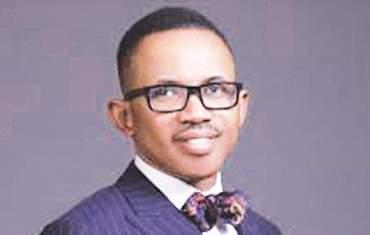
This paper by Learned Senior Advocate, Dr Olukayode Ajulo, provides an in-depth examination of the legal status of cryptocurrencies, their validity as legal tender, the current legal framework for taxing cryptocurrencies in Nigeria, the challenges faced, and the potential future directions for policymakers
Republic of Nigeria, 1999 (as amended) that “…a person shall not be convicted of a criminal offence unless that offence is defined and the penalty therefor is prescribed in a written law”. The courts have consistently upheld this principle (Aoko v. Fagbemi (1961) 1 All NLR 1; Amadi v. FRN [2011] All FWLR (Pt. 561) 1588). In the absence of a statutory prohibition of cryptocurrencies in Nigeria, their creation, use or dealing in them is lawful as they do not contravene any law in existence. Legal or Non-Legal Tender?
Apart from the question of the legality of cryptocurrencies in Nigeria, another important consideration is whether they constitute legal tender. A legal tender refers to the money that is legally recognised in a defined jurisdiction as the means of exchange, i.e., acceptable for use to purchase goods or services and for settlement of debt or other obligations. Legal tenders take the forms of coins and banknotes (sometimes referred to as “currency”).
The Supreme Court in the case of Okpara v FRN (1977) while explaining the concept of a legal tender in contradistinction to a counterfeit held as follows:
“Counterfeit, in relation to a bank note or current coin of a kind which is legal tender in Nigeria, means a bank note or current coin made or issued other than by or by the authority of the Central Bank of Nigeria and in relation to a bank note or current coin of a kind which is not legal tender in Nigeria means a bank note or
“As one of the countries with a burgeoning cryptocurrency market, Nigeria has grappled with the task of developing a comprehensive legal and taxation framework, to address the unique aspects of this emerging asset class”
current coin made or issued other than by or by the authority of the body which, under the laws of the country in which the bank note or current coin is legal tender, is authorised to make or issue such bank note or current coin.” Per BELLO, J.S.C. (P. 7, paras. A-C)
Generally, the characteristics of a legal tender include:
a) regulation by a national government or regional formation;
[b) only a statutory authority is permitted by law to create legal tender, such as the national banks or mints;
c) the primary medium of exchange and people who trade within the jurisdiction are bound to accept it for the settlement of transactions; and d) a unique name which identifies with a particular nation or region.
In Nigeria, the body empowered by law to issue legal tender is the CBN. Furthermore, the law also prescribes the unit of currency and its subdivision which is the Naira – further divisible into one hundred Kobo (CBN Act No. 7 of 2007, sections 2 and 15; Decimal Currency Act Cap. D2 Laws of the Federation of Nigeria (LFN) 2004, Section 1). According to Section 17 of the CBN Act:
“The Bank shall have the sole right of issuing currency notes and coins throughout Nigeria and neither the Federal Government nor any State Government or Local Government, other person or authority shall issue currency notes, bank notes or coins or any documents or tokens payable to bearer on demand being document or token which are likely to pass as legal tender”.
CBN also determines the exchange rate of the Naira to other currencies in the world, and arranges for the printing of currency notes and the minting of coins. Currency notes and coins issued by CBN, shall be legal tender in Nigeria at their face value for the payment of any amount. These laws largely apply to Nigerian currency and where they make reference to foreign currency, they seem to envisage foreign fiat currency. In view of the foregoing, it is therefore, submitted that since cryptocurrencies are not issued by CBN
they are not legal tender. Therefore, laws currently governing the CBN’s legal tender (Naira) may not be applied to cryptocurrencies, unless expressly revised to such.
The Regulatory Landscape Cryptocurrency Regulation in Nigeria Nigeria's approach to cryptocurrency regulation has been cautious and evolving. The Central Bank of Nigeria (CBN) has issued several circulars and directives, aimed at limiting the use of cryptocurrencies in the country. In 2017, the CBN cautioned banks and other financial institutions against facilitating cryptocurrency transactions, citing the risks associated with their use. In 2021, the CBN went a step further by ordering the closure of bank accounts belonging to entities or individuals involved in cryptocurrency transactions. This directive was met with criticism from the cryptocurrency community, who argued that it stifled innovation and financial inclusion in the country. Despite these regulatory actions, the legal status of cryptocurrencies in Nigeria remains ambiguous, as there is no comprehensive legislation specifically addressing their use and classification.
Efforts Towards Regulation
In recent years, there have been some efforts by the Nigerian Government to develop a more comprehensive regulatory framework for cryptocurrencies. In 2020, the Securities and Exchange Commission (SEC) of Nigeria released a set of regulations for digital assets and their service providers, which included guidelines for the issuance, exchange, and custody of cryptocurrencies. However, the implementation and enforcement of these regulations have been limited, as the SEC's authority over cryptocurrency activities has been challenged by the CBN's directives. This regulatory uncertainty has created a significant barrier to the growth and adoption of cryptocurrencies in Nigeria. Nevertheless, when SEC published the SEC Rules on Issuance, Offering and Custody of Digital Assets in May, 2022, it was generally understood that the SEC Rules will apply to cryptocurrencies as either digital assets or virtual assets.
Dr Olukayode Ajulo, OON, SAN, FCIArb (UK), Attorney-General of Ondo State Continued Online
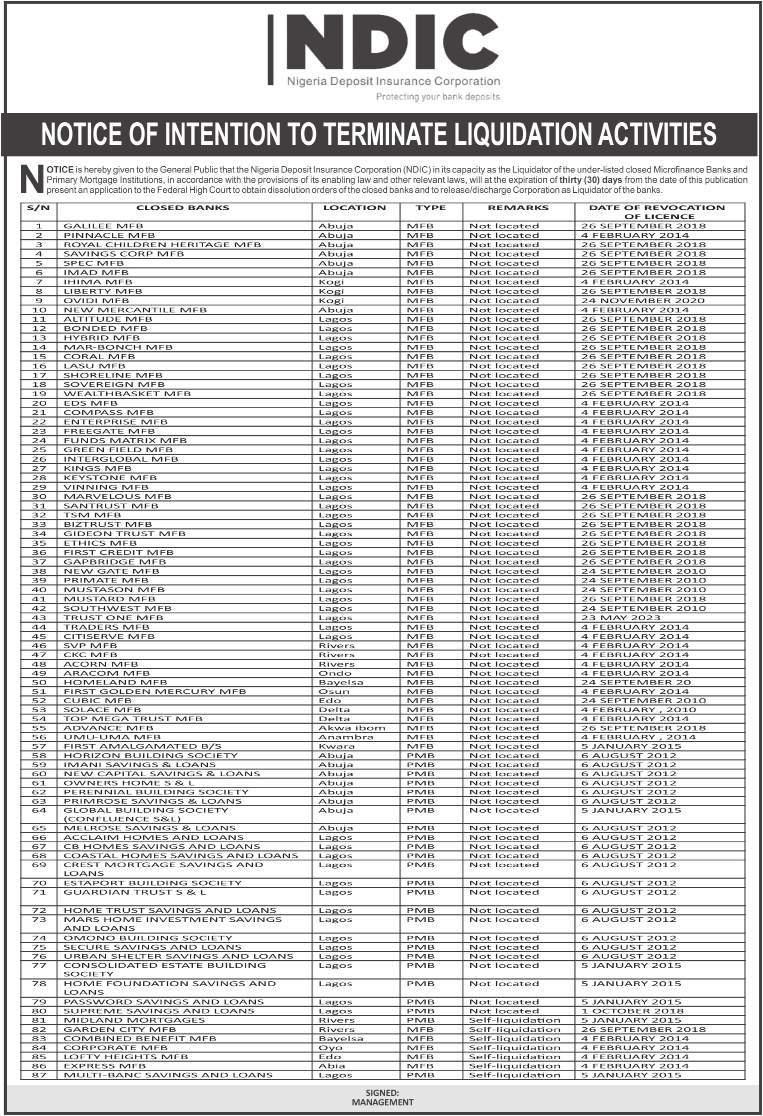

From 26 July to 11 august , Nigeria joined over 200 other countries to compete for various events at the 2024 Paris Olympic Games. Since Nigeria made its debut at the Olympics in Helsinki in 1952, Nigerian athletes have appeared in every edition of the Summer Olympic Games, except for Montreal 1976. Sadly, this year’s Olympics was a woeful outing for the nation, as our 88 athletes who competed returned from the Games without a single medal. With a budget of N12 billion, much was expected from Team Nigeria; but, the abysmal and zero medal outcome is still leaving Nigerians perplexed and disappointed. Chijioke Okoli, SAN, Dr Akpo Mudiaga Odje and Kede Aihie take a holistic view of the scandalous outing, and examine where and how the nation may have got it wrong, while making viable suggestions for the way forward to a bettser outcome at the next Summer Olympic Games, that is, Los angeles 2028, and other international competitions
Nigeria and the Illusory Holy Grail of Respectable Olympic Games Outing
Chijioke Okoli, SAN Shame and Disgust
The abysmal outing of Team Nigeria in the just concluded 2024 Olympic Games in Paris has left the Nigerian sporting establishment and the Federal Government unspeakably embarrassed, with the populace understandably disgusted. Nothing ameliorates the monumental shame of a nation of over 200 million people, returning from the Olympics empty-handed for the second

time in a row. The debacle verges on the ridiculous, with the sobering appreciation of Nigeria’s vacuous selfconsecrated crown of ‘Giant of Africa’, against the backdrop of its title of the continent’s worst performer per capita, and even in absolute terms. Whilst some other
"The culture of ineptitude, culture yes, which fed and occasioned the shameful Olympics outing, is exemplified by a string of incidents which beggar belief"
African countries returned home with no medal at all, just like Nigeria, none of those had close to even half of the 84 athletes and the total contingent we took to the games.
Twelve African countries were on the medals list, with Kenya’s eleven medals, including four gold medals, top of the pile. The three countries which tied in ninth place with one silver and bronze medals a piece, include Cape Verde which has a population of 590,000, considerably less than the number of inhabitants of Ikeja municipality. Indeed, a friend of mine who attended the elitist English public school, Millfield, in making fun of the abysmal failure of Nigeria, pointed that alumni of the school won seven medals in the games, including four gold medals. The culture of ineptitude, culture yes, which fed and occasioned the shameful Olympics outing, is exemplified by a string of incidents which beggar belief.
Ineptitude Nigeria contrived to come to a cycling event without the bicycle, and had to borrow from the Germans to compete. However, the Minister for Sports wants to spin it, the incident only but brings to life Chinua Achebe’s Igbo proverbial
efulefu who sold his machete and went to the battle front with the scabbard. Again, there has been no explanation for the failure to register the sprinter, Favour Ofili for the 100 metres event. Anyone who knows anything about sports would affirm the truism that success in it, is more about mentality than anything else. Ms Ofili was fair medal bet in the shot sprints, but, her non-registration for the 100 metres event she was otherwise qualified for, not only shut out any medal hope for that event, but, also greatly destabilised her mind as to put her at a great disadvantage in the 200 metres race that she was eventually entered for.
On the issue of non-registration of otherwise qualified Nigerian athletes, it is a good wager that will continue to occur until Nigerians begin to see consequences in the form of appropriate sanctions for misbehaviour and dereliction of duty. It is noteworthy that the parents of the United States silver medalist for the women hammer throw event, Nneka Echikunwoke, was competing under the flag of Nigeria for which she was primed to represent in the Tokyo 2021 Olympics. However, she could not compete in the games because of the failure of Nigeria to meet the testing requirements imposed on her representatives by the World Anti-Doping Agency.
According to her, after setting a record as the first United States medalist in that event, “I think (this medal) could have happened three years ago, but I’m happy it’s happening now”.
Ms Echinkunwoke is but one of many athletes, over the past twenty-five years, who out of frustration have dumped the Nigerian flag for those of other countries and are seemingly better for it, having got onto the road to a more triumphant and fulfilling athletic career.
Whilst it is quite easy to make the connection between our shameful outings in the Olympics and other global sporting competitions where we have been punching so embarrassingly below our weight, and Nigeria’s unacceptably poor standard of sports governance, what may not be so obvious is how intractable the problem may be, in the sense of it being rooted in the contemporary Nigerian culture of delinquency and self-aggrandisement in public service. Can one think of any facet of Nigeria’s public space which enjoys even minimum acceptable standards, much less meeting notions of international best practices? Nigerians may have been forced by the peculiarities of their sociopolitical situation (why and so, is beyond our present concern) to tolerate mediocre and indeed, dysfunctional governance, but, are invariably brutally reminded of their shortcomings whenever it comes up for scrutiny in a formal competitive or comparative multi-national or global stage.
The outrage we feign at the now seasonal exposure of our overall governance culture in the Olympics, is replicated with the outcomes of international legal adjudicatory processes involving Nigerian governmental entities where the coalescence of corruption, disdain for applicable rules and utter incompetence, has been frequently exposed as part of our national ethos. These entities would routinely breach otherwise binding contracts, observe the rule of law in the breach and are largely mollycoddled in Nigerian courts for a number of reasons, discussion of which are beyond our present topic. And, when a definitive decision is given against them, a way may be found to avoid compliance or disobey outrightly as occurred in the case of BFIG v BPE [2012] 7 SC (Pt.111) 1. The Supreme Court had decided, supposedly definitively, that the Bureau of Public Enterprises had blatantly breached its contract to sell the Federal Government’s share in ALSCON and consequential order for specific performance. It is now over ten years, but, BFIG is apparently yet to reap the fruits of that judgement.
The case of BFIG v BPE is very important, not only for its crystal clear exemplification of the travails of the rule of law in our shores, but also as a controlling or central authority in a considered opinion I was engaged to give to a foreign sporting business group which was considering the acquisition of sports stadium/facilities in the country. Obedience to the rule of law has obvious benefits, including especially for economic development. And, it is axiomatic that the sports ecosystem forms a crucial component of the economies of not only the more economically advanced countries, but also some other African countries like Kenya. It is noteworthy, and as acknowledged in the Nigerian National Sports Industry Policy, that: “It is estimated that the global sports marketincluding infrastructure, events, training and sports goods - is worth $700-900 billion each year, and its growth outpaces the GDP growth of most countries”. Again, there are natural laws to which a people or group must obey or align their expectations to,

otherwise which they would come to grief. The planter of groundnuts or maize, cannot reap rice.
There is no doubt that sports governance is not rocket science. All that is required is the will to break from, or at least, except for sports sector, our national or group bad habits which has occasioned the culture which prevents the country from achieving its potentials. The knowledge base and capacity is available in and for, undoubtedly. There is nothing required to be done to enable Nigeria get onto the road of maximising its sports potentials, that is not anticipated and covered in the extant National Sports Industry Policy which I had the privilege of leading the exceptional group which wrote, with the tremendous help of the Nigerian Economic Summit Group during the watch of the immediate past Minister for Sports, Mr Sunday Dare.
It would suffice to mention that, central to the present national embarrassment, is the sub-optimal state of the National Sports Federations (NSFs); it is useful to avert here to their three- pronged fundamental challenges identified in the National Sports Industry Policy, namely, Administrative and Funding Deficiencies in addition to Absence of a Well-Structured Elite Athlete Development Programme.
Some of the issues needing to be addressed under these categories include: a) inadequate legal, regulatory and governance framework; b) lack of a database of participants and other stakeholders; c) absence of long-term goals and objectives to drive their responsibilities and deliverables; d) non-conformity with sporting standards across the spectrum of sports participation;
"As the event unfolded, Nigerians became petrified at the complete incompetence of the Nigerian Sports Ministry and her administrators, to the extent that one of our participants in biking had to borrow a bike from compassionate Germany to assist us in our stupidity in that regard"
inadequate communication strategies on the part of the NSFs, as a means of increasing participation in their sports; e) absence of long-term strategies for talent identification across the country; f) inadequate and non-transparent scouting system to identifying budding athletes; absence of high performance facilities, dedicated to elite athletes’ development in several sporting disciplines etc.
As far from the ideal as it is, the present reality is that the Nigerian sports governance ecosystem or space is overwhelmingly dominated by government, especially the Federal Government. Initiatives for real reforms towards a fit-for-purpose governance structure must therefore, come from the Government. And, central to achieving this objective would involve yielding greater space to the private sector, as is generally the case in the more economically advanced and high-achieving countries in the sports sphere. Other considerations apart, the economic efficiencies and high levels of funding required for sustainable success in modern sport, are easier mobilised by the private sector. As posited in the National Sports Industry Policy, “A private sector involvement in the sports industry, would ensure the commitment to and flow of the required investment to deliver on the potentials of the industry to add value to the Nigerian economy. It will also assist the Government in its core objectives of social integration, economic empowerment and youth engagement”.
The Federal Executive Council had ratified the National Sports Industry Policy in 2022, and the current Minister for Sports promised last year that the Federal Government would begin its implementation. But, how far the implementation has gone, is yet to be seen. It must be emphasised that Federal Government needs to treat the issue with the seriousness it deserves, and ensures full and diligent implementation of provisions of the Policy. This would, amongst other things, require the emplacement of the right people in terms of capacity, passion and patriotism. Many such people exist amongst Nigerians, if the will to succeed is present in the highest political quarters. Chanting the mantra of primacy of institutionbuilding must take into account that, it is people who build institutions. There should also be a proper audit, a post-mortem, for the proper lessons
to be learnt and accountability ensured. It is only with these that we can begin to reasonably look forward to regular haul of Olympic medals, commensurate with Nigeria’s potentialities.
Chijioke Okoli, SAN, Sports Lawyer; Co-Lead Writer of the National Sports Industry Policy 2020
Our Olympics Failure and Lessons to be Learnt as We Prepare for 2027
Dr Akpo Mudiaga Odje
Federal Government Budgeted N12 Billion for this Fiasco
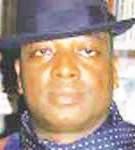
Indeed, we were all elated at the whooping budget of N12 billion approved by Mr President, for the participation of Team Nigeria at the recently concluded Olympic Games in Paris, France. Of this sum, N9 billion was set aside for the able participants, whilst N3 billion was reserved for Paralympic participants, immediately after the able Olympics.
The euphoria that eclipsed the air was such that, it was expected that this set will outclass the equally woeful performances of Nigeria in the preceding Olympics in Tokyo 2020.
As the event unfolded, Nigerians became petrified at the complete incompetence of the Nigerian Sports Ministry and her administrators, to the extent that one of our participants in biking had to borrow a bike from compassionate Germany to assist us in our stupidity in that regard.
Very pathetic indeed, that I and other patriotic Nigerians wasted our time glued to the television, urging our participants to go for the fleeting illusional victory.
Nigeria: Crest fallen in All Games Unfortunately, this was not to be, as the Nigerian participants became eliminated one by one, everyday, and two by two, every other day, even in wrestling, where we had great hopes as our female wrestlers had a reputable pedigree. They were also
seamlessly eliminated, even into athletics.
Our Usoro and co, kept hope alive initially, but they were equally, as expected, eliminated before we could say Jack Robinson!
On the women football, we got the first shocker, when our Falcons who could no longer hear the falconer, lost three consecutive matches, and that set the precursor of our eventual catalogue of failures.
In basketball, our women rose up to the occasion defeating Australia, ranked number 8 in the world and also Canada, before collapsing as also expected, to the indomitable USA. Notwithstanding, we must commend their performance which set an African record of being the first African female team to reach the quarter finals in basketball at the Olympics. In addition, their dandy Coach, Rena Wakama, a Nigerian American, was voted as the Coach of the tournament. Figuratively speaking, this was a gold medal for Nigeria.
However, at the 4 by 100 metres relay, Nigeria came second in the second semifinals of the heats, breaking the African record, but, were regrettably disqualified as the first anchor violated the sanctity of his lane and that was against the rules.
What a waste of effort!!
The galaxy of failure continued unabated into other events, such as boxing, which Nigeria was traditionally strong in, and by far the most devastating failure, was that of the world record holder in 110 metres hurdles and our flag bearer, the iconic Tobi Amusan. She failed to even qualify for the finals of her event, let alone even thinking of winning a medal. In fact, when I heard of her elimination, I stopped watching the tournament for a while.
Incompetence of Our Sports Administrators and Political Interference
The end result of this, was like participating in jamboree, and not a participation in the Olympics. Needless to accentuate, our failure was and/or is traceable to lack of preparation and early planning. We are usually engaged in the fire brigade approach, to collect money and compile lists of participants without testing them. The qualifying race for the Olympics were a sham, as foreign based athletes were given automatic tickets even without competition, and unlike Political interference from the Minister of Spirts and other interest groups, imagine, one of our arrows in the female 100 metres, Ofili, was not even registered for her 100 metre event!
What a Country!
Ofili had to make do, with the 200 metres and 4 by 100 metres events, where she impressed initially before been subdued as expected.
I have it on strong authority, that most coaches were enlisted through political pressure and nepotism.
Specifically, the boxers had no time to train, nor the facilities to do same. After all, the conflict within the Nigerian Boxing Federation, also took its toll on Nigeria.
The likes of Peter Koyekwachi who won a silver medal in the 1984 Olympics, were brushed aside for incompetent imposters. The fractionalisation in the Boxing Federation, made it impossible for the two rival claimants to work together, and the boxers could not train regularly, whilst and some had to use their personal funds to provide for their well-being and training. This point was well hammered by three time Olympian and Team Captain of Team Nigeria at London 2012, Chuka Chukwurnenye when he stated that:
“From me to you, here is a big warm hug. You have done your best. You are not a failures……I know first-hand, all the systemic challenges you faced. You literally squeezed water out of dry rock… Just getting yourself to the Olympic
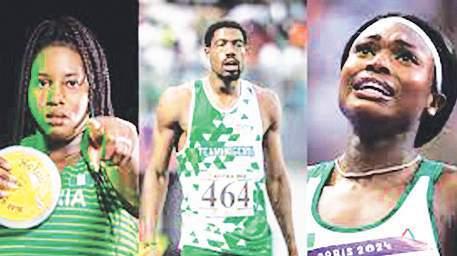
Games as a Nigerian athlete, deserves you getting an Olympic gold medal for a personal effort and sacrifice.”
•Way Forward for Our Future Olympic Participation
1. Early Preparations
We should not wait until a few days to the Olympics, before we commence rigorous training.
2. Early release of funds
The Federal Government should release funds early, to enable the team prepare well ahead of time.
3. The Sports Ministry must be supervised, to pick only qualified athletes to participate in the trials and subsequent Olympics.
4. Employing very competent coaches and handlers, for exposure and mentorship.
5. Removing politics and nepotism, in the selection process for our athletes.
6. Giving special preference to local athletes over their foreign counterparts, who did not participate in Olympic trials.
7. Providing the requisite facilities, such as good training ground, pitches and kits.
8. A system of checks and balances be put in place, to supervise and monitor that funds released to the Sports Ministry are judiciously expended.
9. Prompt payment of allowances to all deserving athletes.
10. Camping activities must be strictly monitored by the Sports Ministry.
11. Ensure proper dope tests are conducted on all athletes, to save the disgrace of the deportation of the Nigerian lightweight female champion on grounds of doping infraction.
12. Our Sports Ministry should be more pro-active, in scouting for athletes in Nigeria. They should look for raw talents, and not stereotypes.
13. Reduce the number contingents and officials attending the Olympics.
"It is disheartening to note that the same old administrators are being recycled, with no expectation of change"
14. There is nothing wrong in the Sports Ministry, hiring competent sports expatriates as consultants to build our athletes up.
15. The reward system for athletes should reviewed regularly, to boost the morale of our athletes.
16. Enlisting past Olympian medalists as consultants as the case may be, such as, Ajunwa our first gold medalist in the Olympics and Peter Koyekwachi our silver medalist in the 1984 tournament. Even the veteran, Isaac Ikhoriaha, who won bronze in boxing at the 1972 Olympics should still be consulted, subject to his present age condition.
Quo Vadis
Indeed, if the Federal Government and her Sports Ministry can implement the above and more not mentioned, our athletes will be greatly motivated to aspire for gold.
It's our fervent hope too, that Mr President will appoint a tested hand as our Sports Minister, and not hand picking political allies and overt relatives to steer the delicate ship of the Ministry of Sports.
Dr Akpo Mudiaga Odje LLD, LLM (London) (Merit), BL; Member of the British Council; Constitutional Lawyer
Nigeria's Olympic Performance: A Tale of Poor Preparation and Incompetence
Kede
Aihie
and incompetent administrators are the primary culprits. The bungling of Ofili's entry in the women's 100 metres event, is a glaring example of administrative ineptitude.
It is disheartening to note that the same old administrators are being recycled, with no expectation of change. The consequences of this stagnation, are evident in Nigeria's consistent underperformance in international sports.
In contrast, countries like the United States, United Kingdom, Japan, and Germany secured medals through athletes of Nigerian descent, highlighting the wasted potential of Nigeria's sports sector.
The female Nigerian athletes bore the brunt of the team's performance, with some reaching the finals and semi-finals. However, this is not enough to mask the overall failure of Nigeria's sports administration.
Nigeria ought to take a leaf from countries like Jamaica and Uzbekistan, who have made significant strides in sports development, despite limited resources. Jamaica's investment in athletics has yielded remarkable results, while Uzbekistan's focus on combat sports has earned them numerous medals.
Solutions
1. Overhaul sports administration: Replace incompetent administrators with competent and visionary leaders.
2. Invest in grassroots development: Focus on discovering and nurturing young talents across various sports.
3. Provide adequate funding: Allocate sufficient resources for training, equipment, and competition participation.
4. Emulate successful models: Study and adopt strategies from successful sports nations, like Jamaica and Uzbekistan.
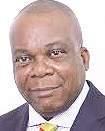
Nigeria's Under-Performance Nigeria’s participation in the recently concluded Olympics was a dismal affair, with the country's 88-member team returning home without a single medal. This lacklustre performance is a stark reminder of the London Olympics in 2012, where Nigeria also failed to secure any medals.
The reasons for this underperformance are multifaceted, but, poor preparation
5. Encourage private sector involvement: Partner with corporate organisations, to support sports development.
6. Develop sports infrastructure: Invest in modern facilities and equipment, to enhance training and competition.
7. Foster a culture of excellence: Encourage a mindset of winning and excellence, among athletes and administrators.
Until Nigeria adopts these solutions and learns from the successes of other nations, the country will continue to lag behind in international competitions. The status quo is unacceptable, and urgent reforms are necessary, to prevent another dismal performance at the next Olympics.
Kede Aihie, Chairman, Nigeria Magazine, London
Email: deji.elumoye@thisdaylive.com
Last week, President Bola Tinubu signed into law a bill stipulating a 300 percent salaries for nation’s judicial officers. However, it is the concession of a cross section of Nigerians that improved salaries is not enough towards establishing an efficient and effective justice system. Alex Enumah reports.
President Bola Tinubu recently signed into law a bill seeking to increase the salaries and allowances of judges in the country by 300 percent. The signing was following the passage of the bill by the Nigerian Senate in June this year. Recall that the House of Representatives had earlier passed the bill in March this year.
The new salaries and allowances take effect from January 1, 2024, as their provisions were already captured in the 2024 appropriation. The new law allows the Chief Justice of Nigeria (CJN) take home N64 million annually and N5.39 million monthly. Other justices of the Supreme Court however takes home N5,046,308 monthly. While the President of the Court of Appeal takes home N5,211,541 monthly, the Chief Judge of the Federal High Court, President of the National Industrial Court; Chief Judge of FCT High Court; Grand Kadi of FCT Sharia Court of Appeal; President of the FCT Customary Court of Appeal; Chief Judge of State High Court; Grand Kadi of State Sharia Court of Appeal and President of the State Customary Court of Appeal, take home N4,192,597 monthly. Other judges in the various trial courts however take home a monthly total package of N3,671,272.84.
A statement by Tinubu’s Special Adviser on Senate Matters, Basheer Lado, indicated that the signing of the bill demonstrates the president’s “unwavering commitment” to the welfare of Nigeria’s workforce and recognition of the role the judicial officers play in justice dispensation.
“This landmark decision reflects Mr. President’s profound dedication to ensuring that every salary earner in Nigeria, especially those serving in vital and strategic roles, receives the recognition and compensation they deserve.
“By prioritizing the financial well-being of our judicial officers, Mr. President is not only reinforcing the integrity of our justice system but also setting a new standard for leadership that truly values the hard work and sacrifices of all Nigerian workers.
This action by the president has earned him accolades from many quarters of the Nigerian society and even beyond, especially coming after a very long time of complaints, protest and even court cases.
Recall that the last time the salaries and allowances of judges were reviewed was 17 years ago. Despite a court order directing the federal government to commence immediate review of the salary, nothing concrete was seen until the coming of the Tinubu administration last year. Recall that Justice Osatohanmwen Obaseki-Osaghae, of the National Industrial Court, Abuja had in a judgement in 2022, held that the current salaries and allowances of judicial officers in the country was not only abysmally low but embarrassing and accordingly ordered the federal government to put machinery in place for the immediate review of the salaries and allowances of the judicial officers.
The judge subsequently ordered the federal government to commence a monthly payment of N10 million to the Chief Justice of Nigeria (CJN), N9 million to other justices of the apex court, President of Court of Appeal, N9 million while other justices of the appellate court N8 million, Chief Judges of both Federal and States HIgh Courts N8 million while judges of the Federal and States HIgh Courts N7 million, Heads of Sharia Court of Appeal and its counterpart in the Customary Court, N8 million and N7 million for the judges in both courts. The judge in addition held that the federal government shall continue to carry out yearly or once in two years review of the salaries and allowances of the judicial officers.
According to Justice Obaseki-Osaghae, the refusal of the government to review the
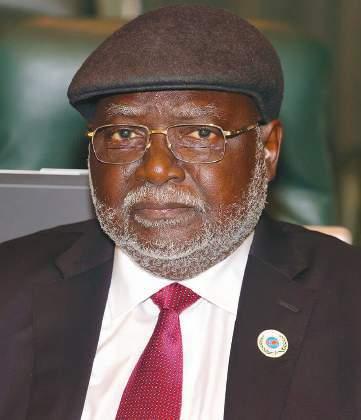
judicial officers’ salaries and allowances for 14 years was unconstitutional, unlawful, adding that the Industrial Court has the power to compel the government to do the needful. She lamented that it was unfortunate that justices and judges who are ministers in the Temple of Justice have become “victims of great injustice” in the country.
The fruit of this judgement was however not reaped until last week when President Tinubu signed into law ‘A Bill for an Act to prescribe the salaries, allowances and fringe benefits of judicial office holders in Nigeria and for related matters’. To many Nigerians, although, it is long over due, however the president is worthy of commendation.
“The increase in the salary of judges
is a most welcome development. Once again, this is one of the biggest achievements of the PBAT Administration so far. Judges have contributed immensely to the stability of the country’s democracy. They deserve a decent pay and reasonable working conditions”, says a law Professor and President of the Center for Socio-Legal Studies (CSLS), Professor Yemi Akinseye-Goerge (SAN).
Sharing a similar view is a former Secretary of the Nigerian Bar Association ( NBA), Benin branch, Mr Andrew Lawani, who expressed confidence that the new pay would definitely spur judges at all levels to begin to give their all in the service of humanity and the country at large. “I believe the increase will enhance their efficiency because when a man is well paid, the motivation to put in his best will be there. When a man is not thinking of where the next meal will come from, he will be energized, when a man lives in a comfortable
When a man is corrupt, it does not matter how much you pay him, he will not be satisfied, he will still cut corners. But generally speaking, this increase will greatly reduce the alleged corruption in the judiciary, the take home pay will reduce the temptation to take bribe to pervert justice, in all I believe going forward, the judiciary will be good for it with this increase in the salaries and allowances of Judges and I appeal to our Judges to reciprocate this gesture in doubling their efforts towards efficient and speedy justice delivery.
environment, he will give his best, he can put a roof over his head”, Lawani said.
However, some have argued that as good as this gesture may seem, it alone cannot tackle the issue of corruption which is the bane of the country’s judiciary. It is also argued that enhancing the welfare of judicial officers without putting other measures in place cannot bring about desired efficiency or make the sector more effective. According to AkinseyeGoerge, whether the improvement in salary will bring about greater productivity and efficiency depends on a host of factors. He listed the availability of a sound leadership by the Head of the Judiciary to provide improved oversight, monitoring and evaluation of the work of judges as very crucial. “There are many judges who will do the right thing on their own but also there are many who need to be monitored.The NJC and the heads of courts must set up clear guidelines for improved judicial oversight, quality control and accountability”, he said.
The law Professor in addition called for a review of the system of delivering quarterly return for being inadequate, adding that the quality of the work done must be checked. “The NJC needs to establish a strong task force consisting of retired judges, experienced legal practitioners and civil society activists to create a system of monitoring judicial performance right from the level of the Supreme Court to the lowest courts.
“The enhanced salary structure must be counter balanced with new measures for higher productivity, oversight and accountability without undue interference with judicial independence. Furthermore, the working conditions and environment also must be improved to enable the judges to function well. This includes the registries and the administrative support system of the courts. So improving salaries alone is not enough. Much more needs to be done”, he submitted.
The need to revamp the disciplinary system of the NJC was also raised. According to Akinseye-Goerge any judge who is guilty of abuse of office by collecting bribes must be shown the way out, prosecuted, and not merely retired to go and enjoy the illicit gains of his or her corrupt practices or sale of office. The procedure it was noted must be fair and transparent so that innocent judges are not victimized. So there is so much that needs to be done to make the new salary regime more beneficial to the nation.
Meanwhile, the NBA at all levels is expected to constitute a strong watchdog system to periodically provide confidential reports to the NJC on judges, so as to uproot lazy and corrupt judges from the system.
Also stakeholders want the system of appointing judges reformed and made more transparent and rigorous, so that only those who merit such appointments in terms of character and learning are appointed. “In the long run, the NJC needs to be reconfigured. The Constitution must be be amended to restructure the NJC. The office of the CJN as presently structured is too powerful. Power corrupts, absolute power corrupts absolutely. The FJSC and the NJC should not be headed by the same person who appoints the greater majority of the members of the NJC.
“In short, the recommendations of the National Justice Summit of 2024 Organised by the HAGF, NJC, NBA and RoLAC must be urgently implemented so as to correct the defects in the structure of the judiciary and the NJC. That is the only way to reap the full benefits of the enhanced salaries for judges”, Akinseye-Goerge concluded.
NOTE: Interested readers should continue in the online edition on www.thisdaylive.com
Hammed Shittu in Ilorin
Minister of Youth Development, Dr. Jamila Bio, at the weekend tasked youths in the country to take advantage of the federal government’s numerous interventions in the various communities towards advancing the socio economic development of the country.
Speaking in Ilorin, Kwara state capital shortly after her visit to comprehensive Needs Assessment of communities in Edu and Baruten local government areas of the State, Dr. Bio however stated that, the importance of community development cannot be over emphasised in then youth development and nation’s building.
Some of these interventions, he said, include the Presidential Initiative on Youth Enterprise Cluster (PIYEC), Youth Development Bank, Youth Development Centres, Nigerian Education Loan Fund, SMEDAN’s National Skills Business Initiative, ITF Skill Up Artisan programme,
3MTT programme, and the Nigeria Youth Investment Fund (NYIF), which he stressed is focused on empowering young entrepreneurs and innovators.
Bio said the exercise was part of the federal government’s broader strategy to assess and address the development needs of rural communities across the country.
She added, “This is to ensure that the dividends of democracy reach nooks and crannies of the country, and to ensure that the impacts of President Bola Ahmed Tinubu’s leadership is felt at the grassroots. Community development is not just a pathway to improving infrastructure and services but a cornerstone for empowering young people to become active participants in nation-building.”
At each of these communities, she engaged with their traditional rulers, who highlighted their infrastructural needs.
The royal fathers also commended the leadership of
President Bola Tinubu, Governor Abdulrahman Abdulrazaq, and urged lawmakers from Kwara North to support and work with them to facilitate more development in the region.
In her response, the minister promised increased federal government interventions for the communities especially in the areas of youth empowerment, and critical infrastructure upgrade by appropriate agencies and ministries of government.
During her interactions with the youth of some of the visited communities, Bio highlighted the various initiatives of the Tinubu’s administration aimed at empowering young Nigerians, urging them to maximize these opportunities to foster youth enterprise at the grassroots.
She said: “President Tinubu is a youth-friendly leader and in line with his commitment to youth development, the federal government has launched different key interventions for the youth.”
When it comes to consumercentred campaigns, Terra, a brand renowned for its innovative and award-winning campaigns, always stands out. The secret to its success is not just in the high-quality products but in the unwavering dedication when connecting with its consumers.
With each meticulously designed campaign, Terra resonates deeply in the hearts of its audience. Terra listens, learns, and responds with campaigns that didn’t just advertise products but celebrates moments of real human connections.
Terra’s “Unwrap Joy” campaign was a celebration of life’s small but profound moments, inviting people to share their personal snippets of happiness. The response was overwhelming, with social media alight with stories of joy and cherished memories. Building on this success, Terra introduced the “Unwrap Memories” campaign, which focused on the nostalgic connections that unite people. This campaign encouraged sharing of vivid, meaningful
memories, creating a beautiful tapestry of past and present that deeply resonated with participants, forging heartfelt connections, and celebrating enduring bonds.
Now, Terra is ready to embrace the next chapter of this journey: “Terra Unwrap Your Smile.” The campaign’s central theme revolves around the idea that smiles are hidden in the everyday moments of connection that we sometimes overlook. Whether it’s smiling at a random stranger, sharing a home-cooked meal with family, or bonding with friends over a delicious dish, Terra Seasoning Cube aims to remind us that joy can be found in the simplicity of life’s daily rituals, despite life’s challenges. In these challenging times, it’s easy to forget the simple joys that sustain us,” said Probal Bhattacharya, Chief Marketing Officer, TGI Group. “But at Terra Cube, we believe happiness is a shared experience, even amidst adversity. Our ‘Unwrap Your Smile’ campaign invites you to rediscover the power of a
smile – a spark that ignites joy and connection. Whether it’s a shared meal with loved ones or a heartfelt laugh with friends, let’s come together to create a world where smiles are as contagious as laughter and as enduring as friendship.”
The campaign has taken off with the same spirit of joy and appreciation that had defined its predecessors. Terra is inviting people to share their smiles, their laughter, and their moments of genuine happiness. This isn’t just about capturing a fleeting grin but about unwrapping the deeper, more enduring smiles that came from shared experiences and heartfelt connections.
As the stories of smiles and laughter roll in, it is clear that Terra had struck a chord once again. People are not just participating, they are also truly engaging and embracing the idea that a smile is something that could be unwrapped and shared.
Through it all, Terra remained steadfast in its commitment to appreciating and celebrating the essence of human connection.
Sundry Foods Limited, a prominent player in Nigeria’s restaurant and bakery industry, recently marked its 20th anniversary with a grand celebration. The event brought together employees, partners, customers, and industry leaders to commemorate two decades of innovation, growth, and unwavering commitment to culinary excellence.
Founded in 2004, Sundry Foods Limited began as a modest venture with the vision of transforming the food service industry in Nigeria. The company started with a single restaurant in Port Harcourt, which quickly gained popularity due to its dedication to quality, customer service, and a unique dining experience. Over the years, this single outlet has expanded into a robust chain of
restaurants and bakeries spread across the country.
Speaking at the anniversary event, the company’s MD/CEO, Ebele Enunwa, reflected on the company’s journey. He emphasized that the 20th-anniversary celebration was not just a recognition of past achievements but also a reaffirmation of Sundry Foods Limited’s commitment to building a bright, sustainable future filled with promise.
Enunwa highlighted the company’s growth, with over 200 branches in more than 110 locations across 20 cities, employing over 4,000 people nationwide. He added that Sundry Foods Limited’s vision continues to evolve, with aspirations to take Nigerian and African cuisine to the world by building an enduring legacy—an institution that will outlive its founders and continue to create
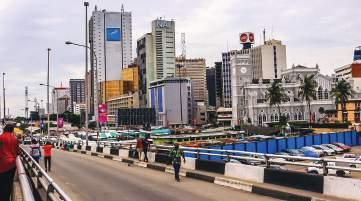
employment opportunities and value for all stakeholders.
Chairman Board of Directors, Sundry Foods Limited, Adedotun Sulaiman described the 20th anniversary as a significant milestone, symbolizing both reflection and celebration. He acknowledged the company’s remarkable growth, noting that Sundry Foods Limited has become an integrated food services company, offering a diverse portfolio of products and services across 197 business units in 116 locations across 16 of Nigeria’s 36 states, including Lagos and Abuja.
In his speech, Sulaiman acknowledged the dedication of the company’s employees, the strength of its business partnerships, and the loyalty of its customers. He emphasized that the success being celebrated was made possible by their continued support and patronage.
The price of OPEC basket of twelve crudes stood at $87.33 a barrel on Monday, compared with $86.00 the previous Thursday, according to OPEC Secretariat calculations. The OPEC Reference
Kayode Tokede
The stock market segment of the Nigerian Exchange Limited (NGX), yesterday depreciated by N749.7 billion in market capitalisation, attributable to investors profit-taking in Dangote Cement Plc and 18 others.
As Dangote Cement dropped by 10 per cent, the overall market capitalisation moved from N55.132 trillion the stock market opened for trading to N54.382 trillion yesterday, dropping by 1.4 per
cent or N749.7 billion. Consequently, the All-Share Index (NGX ASI) shed 1,320.52 basis points or 1.36 per cent to close at 95,779.79 basis points, the lowest point since January 22, 2024.
The stock market decline yesterday brings NGX ASI Month-to-Date and Year-to-Date performance to -two per cent and +28.1per cent, respectively.
Analysing by sectors, the NGX Industrial Goods Index (-five per cent), NGX Insurance
index (-0.7per cent) and NGX Consumer Goods Index (-0.7per cent) recorded losses, while the NGX Banking Index (+0.2per cent) and NGX Oil & Gas Index (+0.1per cent) posted gains.
However, market breadth closed positive, as 31 stocks gained relative to 17 losers. Skyway Aviation Handling Company, Cutix and R. T. Briscoe Nigeria emerged the highest price gainer of 10 per cent each to close at N26.40, N2.64 and N1.87 respectively, per share. Oando followed with a gain of



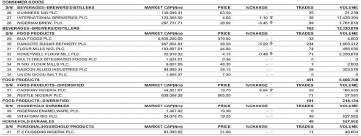
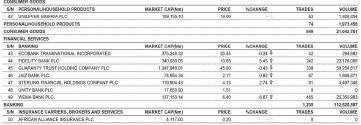

9.90 per cent to close at N39.40, while FTN Cocoa Processors appreciated by 9.57 per cent to close at N2.06, per share.
On the other side, Dangote Cement led others on the losers’ chart with 10 per cent to close at N532.00, per share. Secure Electronic Technology followed with a decline of 9.76 per cent to close at 37 kobo, while Africa Prudential declined by 9.68 per cent to close at N8.40, per share. Beta Glass lost 9.43 per cent to close at N48.00, while Caverton
Offshore Support Group depreciated by 6.38 per cent to close at N1.32, per share. The total volume traded increased by 916.19 per cent to 3.546 billion units, valued at N7.649 billion, and exchanged in 9,291deals. Transactions in the shares of Standard Alliance Insurance led the activity with 3.141 billion shares worth N31.408 million. Guaranty Trust Holding Company (GTCO) followed with account of 59.255 million shares valued at N2.728 billion, while
Looking forward, United Capital Plc said “the equities market is expected to show mixed performance as investors adopt opportunistic investment strategies. We foresee selective buying of fundamentally strong stocks continuing into the week.



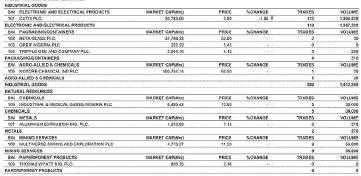
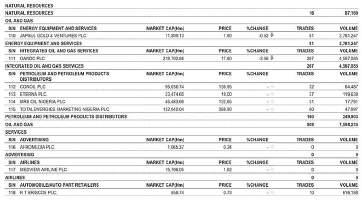
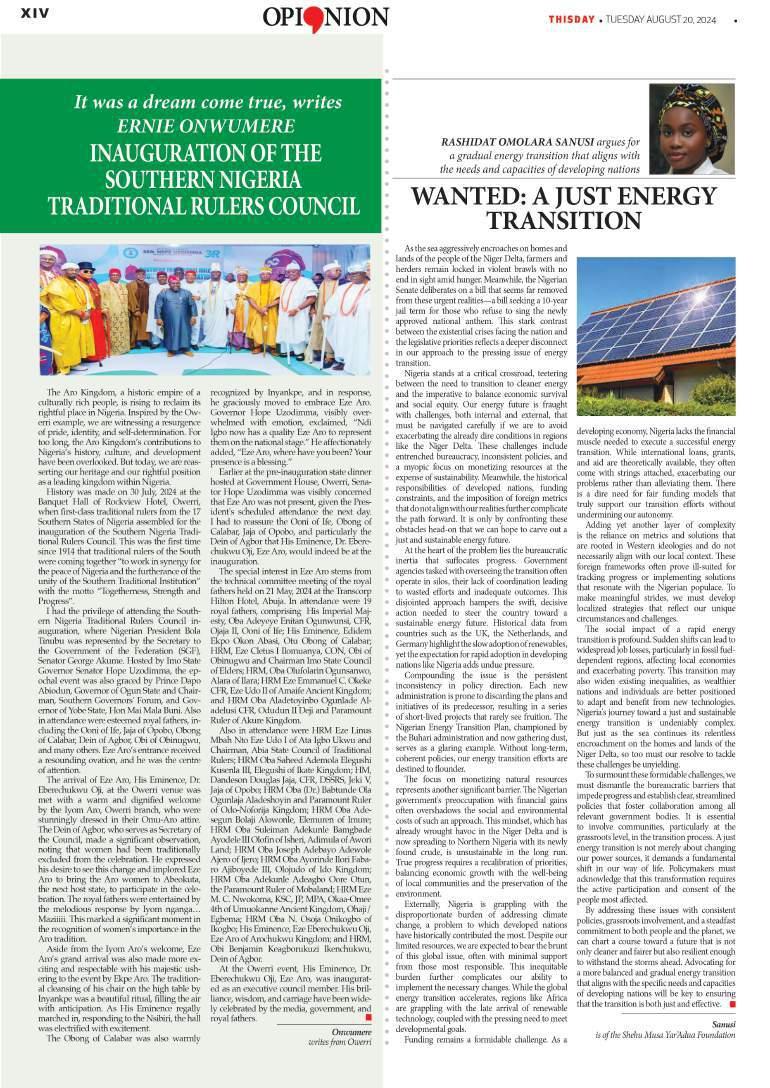

David-Chyddy Eleke reports that while Nigerians in other parts of the country joined the recent #EndBadGovernance protest, in the South-east, it was a different kind of protest
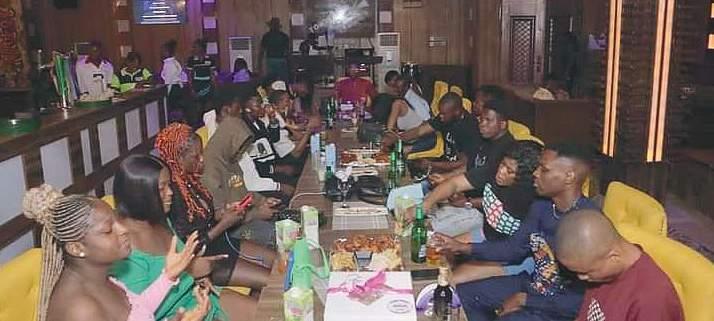
The recent protest in the country, #EndBadGovernance, which was geared at making the leadership of the country to intervene in the skyrocketing prices of food items, was totally boycotted by all the states of the South-east.
Though there were no physical meeting and movement of large number of people in the various cities in the Southeast, there are many who believed that South easterners joined the protest, but in a totally different way.
Days before the protest, there had been warnings by various Igbo leaders and groups, calling on Igbo not to join the protest. The likes of Ohanaeze Ndigbo, the apex Igbo sociopolitical group made press releases dissuading Igbo at home and in the diaspora from participating in the protest.
Rt Hon Benjamin Kalu, the deputy speaker of the House of Representatives joined in the call when he made a video calling on Igbo to boycott the protest. He warned that if Igbo joined in the protest, especially in other towns outside their area, the tendency is that people of other regions may skew the protest to their against them, and accuse Igbo of being the masterminds of the protest, with the intention to vandalize their properties and also loot them.
Heeding to some of this calls, the first three days of the protest witnessed a total boycott by Ndigbo, and has remained so. THISDAY correspondent who monitored trends across the South East noticed that there was no protest anywhere in the South East. In Lagos and Abuja, and other parts of the country, Igbo traders also failed to join a herd of protesters who stormed the streets to ask the president of Nigeria, Asiwaju Bola Tinubu to reduce the cost of living and end hunger in the country.
In Awka, it was observed that Dr Alex Ekwueme Square, a public square which serves as a meeting point for protesters was deserted on August 1, and other preceding dates, when the protest held in all parts of the country.
Meanwhile, what looked like a different kind of protest was witnessed in several parts of the South East. Though the atmosphere of the country was tensed, leading to low vehicular activities in the zone, with markets, motor parks, banks and schools closed, but on the morning of August 1, youths formed football teams in various streets in most towns and played soccer as their own kind of protest.
Others were also seen in beer parlours drinking, eating and making merry as their own protests. Very early on the first day of the protest, it was almost a funny kind of greeting as people asked each other where they were going for their own protest.
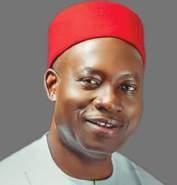
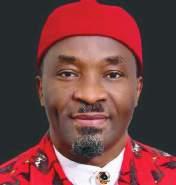
Some youths who spoke to THISDAY in Awka while playing football on the popular Majuo Street in Awka said it is their own way of protesting. One of the youths who gave his name as Ejike said: "I own a shop at Eke Awka. We are here to do our own protest since they said today is set aside for protest. Market did not open, so we have to do our own protest here.
We heard that in North people are burning properties already for the protest, but here, our own protest is to play football on this deserted main road. When they are done with their own protest destroying things, we will now go back to our markets.
"We are Igbo people, we can not be the worse hit in this country. If things get worse than this, all we can do is that because we are predominantly traders, if cost of living goes higher than this, we will also increase the prices of our wares. We are not joining anyone in their destructive protest," the youth said.
What looked like a more funny protest was the gathering of people in videos circulated on social media, both in Enugu, Onitsha and Awka, where able bodied men gathered at drinking joints, treating themselves to drinks and chicken as their own kind of protest.
In Awka, at Aroma junction where some youths gathered drinking and eating and chanting songs, one of the youths, a printer, Mr John Nze said: "This is our own kind of protest. We are here to eat and drink and protest along with our northern and
western brothers. We want to say that we are happy with the leadership of President Bola Tinubu. We did not vote for him, but we know that our northern and western brothers voted for him. So this is the time to reap the reward of their support to Tinubu, and we are here to urge our president to keep up the good work," he said sarcastically.
Meanwhile, on a day when the country was protesting against hunger in the land, the governor of Anambra State was at Amansea, a boundary community in the state to flag off his game-changing agricultural initiative “Operation Farm to Feed”.
Press Secretary to the governor, Mr Christian Aburime said: "The pertinent question on the mind of Governor Soludo seems to be: how can a nation, a people, so enviably blessed with fertile, arable land mass and clement weather conditions be struggling with hunger? This has spurred the governor to swing into action with his new initiative, unveiled at Amansea, in order to galvanise Anambra's citizens into embracing agriculture on personal and family levels."
He said: "From sprawling rural homesteads to the modest backyards of urban dwellers, Governor Soludo envisions a state where every available plot of land becomes a bastion of food security. Of course, Nigerians can not afford to be waiting for Manna from heaven or from Abuja. As much as the government must take certain steps to address the rampant food inflation in the country, it is Governor Soludo’s belief that the long-term solution to our food crisis lies in the rich soil beneath our feet and the strength of our own hands. The timing of Governor Soludo's initiative
could not be more critical. As galloping inflation ravages the Nigerian economy, food prices have become the most visible and painful indicators of the nation’s economic challenges.
"Individuals and families across the country are grappling with impossible choices, forced to decide between putting food on the table and meeting other basic needs. There is, indeed, no easy choice."
Meanwhile, the convener of Youths Earnestly Support Soludo (YESS), a political pressure group, Dr Nelson Omenugha who is special adviser to the governor on youth Empowerment said the protest failed woefully in Anambra because Governor Soludo intentionally lined up empowerment programmes which have kept youths of the state busy.
Omenugha stated this during an Empowerment workshop organized by the group in Awka, the state capital, on Sunday.
Omenugha said: “What we are doing today is a youth empowerment programmes for our members. In this workshop we have lined up several forms of empowerment for youths as a means of taking them off the streets and keeping them busy. We also have two members who just came back from a Chinese government sponsored trip to China, who will be speaking to us about mushroom farming. Our hope is to get members from here who will form a cooperative and farm mushroom. We will sponsor them as means of keeping our youth busy.
“That is the reason there is no protest in Anambra today. There is no protest in Anambra because Mr Governor, Prof Charles Chukwuma Soludo CFR proactively engaged various youth groups. The Governor has also done well in youth empowerment and the youths of the state are happy with him.
“When I was SUG president of Unizik, I dissuaded protest because if you protest and other nefarious elements take advantage and destroy things, you will still be the one to pay and at the same time you will be worse off than you were before the protest. That was why we intentionally met with youths before the commencement of the protest to tell them all these. And the governor in his wisdom has done well to empower youths in various ways, and today, our youths are useful and do not have time for any protest.
“There are many programmes which the governor has used to empower youths. The one youth two skills programme has given youths the opportunity to be useful. The farm to feed programme will further keep more youths busy, so we are not expecting any protest here because our youths are busy and Soludo has empowered them,” Omenugha said.
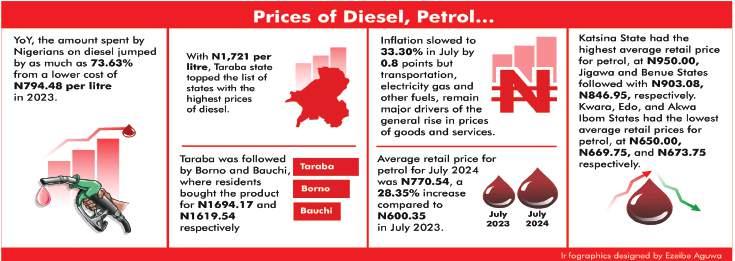
Any hope of immediate respite for Nigerians was again dashed in July as the prices of major fuels continued to soar in July, worsening the economic hardship partly caused by energy prices.
Latest data from the National Bureau of Statistics (NBS) indicated that year-on-year, the amount spent by Nigerians on diesel jumped by as much as 73.63 per cent put side by the price it sold during the same period last year.
The NBS data showed that Taraba state topped the list of states with the highest prices of diesel in the country during the period under review, with residents buying a litre for as much as N1,721 per litre.
Nigeria’s inflation had for
Dike Onwuamaeze
The Lagos Chamber of Commerce and Industry (LCCI) has called on the federal government to provide incentives for the production of exportable goods in Nigeria.
This call was made by the Director General of LCCI, Dr. Chinyere Almona, in a public statement titled, “LCCI Statement on July 2024 Inflation Rate,” in which she said that current inflation environment should also be used as an opportunity to look beyond and consider longer-term issues,

months continued to rise driven by a threefold increase in electricity tariffs, fuel subsidy removal, leading to higher transport costs as well as a devaluation of the country’s currency by the federal government.
In June this year, the NBS reported that all measures of inflation rate rose in June 2024, although at a slower pace, with headline inflation increasing to 34.2 per cent in June 2024 from 22.8 percent in June 2023 and 34.0 percent in May 2024.
Although inflation slowed to 33.30 per cent in July by 0.8 points, the data stressed that transportation, electricity gas and other fuels, including diesel and petrol still remain major drivers of the general rise in prices of goods and services during the month.
particularly in the economy’s agriculture, manufacturing and export sectors.
Almona said: “We urge the government to support the economy’s productive sector and incentivize the production of exportable goods where the country has a comparative advantage to increase FX earnings and sustain stability in the FX market.”
She added that policymakers should to choose the appropriate policy mix to continually drive down the deceleration of inflationary pressures that declined from 27.49
The rising prices of major fuels in the country have been further worsened by the massive importation of products, since at the moment Nigeria does not refine most of its fuels.
But the NBS figures revealed that in terms of diesel prices, Taraba was followed by Borno and Bauchi, where residents bought the product for N1694.17 and N1619.54 respectively.
“The average retail price of Automotive Gas Oil (AGO) or diesel) paid by consumers increased by 73.63 per cent on a year-on-year basis from a lower cost of N794.48 per litre recorded in the corresponding month of last year (i.e., July 2023) to a higher cost of N1379.48 per litre in July 2024.
“On a month-on-month basis, a decrease of 5.71 per cent was
per cent in June to 27.47 per cent in July.
According to her, the many programmes and policies initiated to tame inflation and stabilise the exchange rate must be sustained and extended to impact more economic players, thereby multiplying the economic effect in the medium term.
“We advise the government to sustain and expand programmes and policies like the import duty waivers on food and drugs, the introduction of Compressed Natural Gas (CNG) vehicles to give way to cheaper means of transportation,

recorded from N1462.98 in June 2024 to an average of N1379.48 in July 2024.
“Looking at the variations in the state prices, the top three states with the highest average price of the product in July 2024 included Taraba state (N1721.79), Borno state (N1694.17), and Bauchi (N1619.54),” the data added.
Furthermore, it said the top three lowest prices were recorded in the following states namely: Kogi State (N1,186.31), Kano State (N1,211.11), and Osun (N1,246.82).
The zonal representation of average price of diesel, it said, showed that North East zone had the highest price of N1,600.85 while South West zone had the lowest price of N1,266.57 when compared with other Zones.
the several foreign exchange market reforms to boost supply, the decision to make provision for direct crude supply to local refineries, and the transition to renewable energy.
“To extend the recorded ease in prices, we must attend to the root causes of food insecurity in Nigeria, such as empowering lowly skilled farmers with access to required information on crop production, market prices, and technology; providing more agricultural input like fertilizer and extension services; invest more in agrarian mechanisation; resolve land use
In the same vein, the average retail price paid by consumers for Premium Motor Spirit (PMS) or petrol for July 2024 was N770.54, indicated a 28.35 per cent increase compared to the value recorded in July 2023 N600.35.
Likewise, comparing the average price value with the previous month (.i.e. June 2024), the average retail price, the NBS stressed, increased by 2.72 per cent from N750.17.
“On State profile analysis, Katsina State had the highest average retail price for petrol, at N950.00, Jigawa and Benue States were next, with N903.08 and N846.95, respectively.
“Conversely, Kwara, Edo, and Akwa Ibom States had the lowest average retail prices for petrol, at N650.00, N669.75, and N673.75 respectively. Lastly, on the zonal
conflicts; mitigate climate change impact on farmlands; and initiate modern irrigation methods,” she said.
Almona noted that the Central Bank of Nigeria (CBN) report that the Purchasing Managers Index (PMI) for July fell to 49.7 per cent, which is below the optimism level of 50 per cent, was not-too-good news.
She, therefore, suggested that, “consistent work is needed to create some certainty in the policy environment to boost the confidence of industries in the economy in the coming months.
“The reinforced fight against crude

profile, the North-West Zone had the highest average retail price of N820.10, while the South-South Zone had the lowest price of N678.30. In June also, prices of key fuels, had earlier continued their upward swing, but with Benue, Niger, Jigawa and Cross River recording the highest prices in the country.
The highest average price of petrol in June 2024 was recorded in Niger State (N1979.23), Cross River State (N1920.86), and Taraba (N1742.46). Also, the highest prices of diesel emerged in Benue which sold the product for N864.55 per litre, followed by Jigawa and Rivers states with N847 per litre and N810 per litre respectively.
oil theft and pipeline vandalism must be sustained to ensure a higher output that can cater to the crude supply requirements of local refineries.
“Beyond food crops, poultry and fisheries are key drivers of food inflation as common food items like beef, fish, eggs, and chicken have recorded consistently high prices in recent months, contributing significantly to food inflation in the country.




Emmanuel Addeh in Abuja
The Minister of Power, Chief Adebayo Adelabu at the weekend disclosed that Nigeria was only able to add 2GW (2,000mw) of power to the national grid since 1984, a period of 40 years.
Adelabu who spoke when he appeared on Television Continental (TVC), also reiterated the Bola Tinubu-led administration’s plan to raise the country’s grid electricity to 6,000mw by the end of 2024 from the current circa 5,000mw.
In contrast, THISDAY checks revealed that in just three years, from December 2015 to December 2018, a total of 28,229 mw was added to the national electricity grid by Egypt.
This resulted in a total installed capacity of 55gw by the country, including both conventional and renewable energy sources, according to the International Trade Administration (ITA).
But the minister stressed that it was shameful that Nigeria, a country of over 200 million persons is currently hooked on to about 5,000mw of power supply on a daily basis.
Noting that there had been some improvement, Adelabu stated
that industrialised countries like South Korea already conquered the problem of power supply, reason that such global companies like LG, Hyundai and others were able to spring up from that part of the world.
A recent report quoted by Dataphyte noted that Nigeria spent N1.7 trillion on power between 2018 and 2020. Another report added that over $7.5 billion was spent on transmission alone under Buhari.
Despite, these investments, the power sector problem has persisted.
It explained that the amounts mentioned did not include N1.5 trillion lent by the Central Bank of Nigeria (CBN) to Generation Companies (Gencos) and Distribution Companies (Discos) as well as recurrent budgets over the years.
“We are excited, we are happy, and we are inspired that our people have acknowledged this improvement in parts of the country in the past few months, which show the results of the intentional activities of the federal ministry of power, our agencies, and the operators in the power sector value chain.
“At the same time, we, as Nigerians, do not settle for crumbs.
The federal government has secured the backing of the United State on Nigeria’s solar power project, in a bid by Africa’s most populous nation to provide reliable electricity to businesses and households in the country.
A statement by Bolaji Tunji, the spokesman to the Minister of Power, Adebayo Adelabu, said this was disclosed by the United States Ambassador to Nigeria, Mr Richard Mills, during a meeting with Adelabu in Abuja.
The solar project will see Sun Africa LLC, an American company in the forefront of the push to meet Africa’s energy needs, providing vital power infrastructure to Nigeria, the statement added.
Mills said his visit to the power ministry was to know the status of the Sun Africa power project and support the ministry’s engagement on the project.
The ambassador also invited the Minister to an Energy summit scheduled to hold from 11 - 12 September, 2024 in Washington, stressing that the summit will make the electricity sector a major focus.
Speaking earlier, Adelabu stated that the ministry was adding value to local industries by providing them with adequate power to enable them function better.
Asst.
KayodeTokede
Reporter
The minister noted that though Nigeria has the population and the market which should be a strength to the nation, the reverse had been the case simply because Nigeria still imports about 80 per cent of what it consumes.
“This has left the country with a lot of burden since the country has limited source of
the
dependence,” he added.
We should be quite ambitious in our plan. As I said, 5,000mw of power for over 200 million people is not yet satisfactory. That is not
Ejiofor Alike
The Managing Director and Chief Executive Officer of NIPCO Plc, Mr. Suresh Kumar, has disclosed that the company targets to increase the number of its Liquefied Petroleum Gas (LPG) outlets across Nigeria from 70 to 100 before the end of 2024.
Addressing the shareholders and other key stakeholders at the 20th Annual General Meeting (AGM) of the company held at Abuja Continental Hotel, Kumar, who reported a substantial turnover of N780 billion by the company for the year 2023,
The Ministry of Housing and Urban Development and Association of Housing Corporations of Nigeria (AHCN), have agreed on a joint mission in the delivery of affordable housing under the housing programme of the present administration.
This understanding was arrived at when the President and Chairman of Council, AHCN,
Emmanuel Addeh in Abuja
The Minister of Works, David Umahi, has visited the portion of the Kano-Maiduguri road recently damaged by heavy flooding, stressing that Nigeria’s deficit of good roads was not caused by the Bola Tinubu administration.
Umahi also said the Federal Ministry of Works had designed the fourth road infrastructure legacy
Peter Uzoho
where we are going. It is a far cry from our target.
“South Korea is a highly industrialised nation. They have
said growing the number of LPG outlets is part of the company’s effort to ensure deeper penetration of product, which is better known as cooking gas.
Kumar said the company’s huge turnover in 2023 was a reflection of its robust performance in the Nigerian oil and gas sector.
“This impressive financial achievement underscores NIPCO’s strategic initiatives and operational efficiency, which have collectively contributed to its solid market position and growth trajectory,” Kumar said.
He said in line with its commendable financial results,
Eno Obongha, led a delegation of members of the AHCN on a visit to the ministry. AHCN is an umbrella organisation for all federal and state housing agencies, housing research institutes, mortgage establishments and private property developers.
Members include; the Federal Mortgage Bank of Nigeria (FMBN), Federal Housing Authority (FHA) and Nigerian
project that passes through states of the North-east known as the Akwanga-Jos-Bauchi-Gombe road.
Umahi made the disclosure during a courtesy visit to the Governor of Bauchi state, Bala Mohammed, at the State Government House, Bauchi.
He said: “I want to thank you very highly, and to let you know that the shortfall in terms of road distribution was not done
The Women in Energy Network (WIEN) and Smart Gas Limited have entered into a partnership for distribution of 100,000 Liquefied Petroleum Gas (LPG) cylinders annually over the next five years to women in rural communities in the 774 Local Government Areas (LGAs) in Nigeria.
The move is aimed at deepening domestic gas utilisation in the country in line with the federal government’s National Gas Expansion Programme (NGEP) that seeks to increase local LPG consumption and reduce reliance on kerosene and other polluting fuels.
Peter Uzoho
The Minister of State for Petroleum Resources (Oil), Senator Heineken Lokpobiri; Minister of Industry, Trade and Investment, Dr. Doris Uzoka-Anite; and Chairman of Dangote Petroleum Refineries, Alhaji Aliko Dangote, would be leading discussions at the inaugural
a population of 48 or 49 million people. Today, they generate 130,000mw of power. So the fact that we have the companies like
Kumar said NIPCO has proposed a dividend payout of N938.3 million for the year 2023.
Kumar said: “The proposed dividend payoff of N5 per 50K share held by investors highlights the company’s commitment to rewarding its shareholders and maintaining investor confidence”.
According to him, the dividend proposal is a testament to NIPCO’s financial health and its ability to generate significant returns for its stakeholders.
“Today’s event marks another turning point in the history of NIPCO PLC and underscores our continuous
Building & Road Research Institute (NBRRI), , among others, with all the 36 states housing agencies as members.
The Minister, Ahmed Dangiwa, told the association that the Renewed Hope Housing Programme was initiated to boost the stock of affordable housing in Nigeria and the Ministry will ensure completion of all and there will be no abandoned houses under the programme.
by President Bola Tinubu, it wasn’t done by me, but Mr. President is addressing it, and that’s why we have injected the fourth legacy project of the President that runs from Akwanga to Jos to Bauchi State, and we are happy to see that you have intervened progressively and critically on a good percentage of the road in your state.”
The minister emphasised
Moreso, the initiative, according to the partners is to align with the government’s agenda for fuel diversification and economic sustainability, particularly as the nation works towards reducing its dependence on traditional and non-renewable energy sources.
Nigerian crude oil refining summit.
The event is set to take place on October 7 and 8, 2024 in Lagos.
The leaders, according to the programme organizers, have not only endorsed the event but have also confirmed their attendance and participation as keynote speakers.
In a statement made available to
LG and so on means that they were able to grow
industries
were small shops in the 60s,”
drive to meet the yearnings and aspirations of our promoters,” he said.
He said NIPCO had made remarkable strides in expanding its LPG infrastructure, adding the company had increased its LPG penetration across Nigeria, with over 70 outlets in 2023, with a target to grow this number to 100 before the end of the year.
“We have broadened our spread in the LPG sector to several states through our massive skid deployment and other ancillary infrastructure. Our aim is to enhance access to the product at market-friendly rates,” he added.
Speaking earlier, Obongha said that AHCN desires to participate in the Renewed Hope Housing Agenda by providing about 15 hectares of land in each of the senatorial districts for the development of housing in furtherance of the programme. He also suggested to the minister to ensure at least 20 per cent of the building materials used during the projects are locally sourced.
the importance of the four projects which he said were not only strategic in terms of seamless connectivity to the six geo-political zones, but also a strategic architectural master plan that would stimulate the economy of the nation through enhanced agriculture, job creation, regional integration, tourism, transportation ecosystem and industrialisation.
Speaking at the inauguration of the initiative in Lagos, President of WIEN, Mrs Eyono Fatai-Williams, explained that promoting LPG, also known as cooking gas, as an alternative to firewood and coal, directly supports the NGEP programme.
THISDAY, the involvement of the top industry and economic leaders was officially confirmed during courtesy visits by the Crude Oil Refinery Owners Association of Nigeria (CORAN) led by its Chairman, Mr. Momoh Oyarekhua, at their respective offices in Lagos and Abuja.
“The endorsement and participation
She stated, “This collaborative initiative between the WIEN and Smart Gas Limited is to expand the use of Liquefied Petroleum Gas in our local communities.
of Senator Heineken Lokpobiri, Dr. Doris Uzoka-Anite, and Alhaji Aliko Dangote reflect the pivotal importance of the Nigerian Crude Oil Refining Summit. Their leadership and insight will be invaluable as we chart the course for Nigeria to become a net exporter of petroleum products,” Oyarekhua stated.
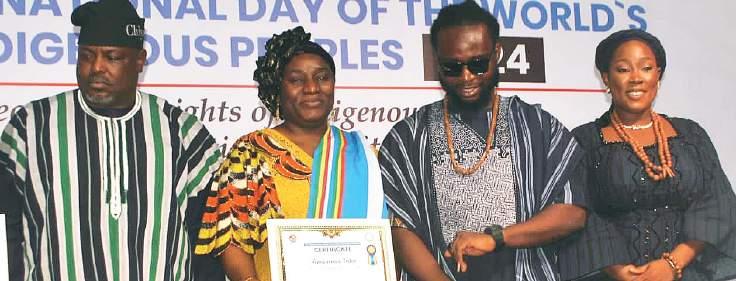
L-R: Executive Chairman, Kwali Area Council, FCT, Danladi Chiya; Guest Speaker/ Founder Helpline Social Support Initiative Abuja, Dr. Jummai Ahmadu; Mandate Secretary, Àrea Council Service
FCTA, Mr. Bitrus Lawrence Garki; and Chairperson, Indigenous Day Planning Committee, Azaki Mary Sabo, during
Goddy Egene
National Association of Seadogs (NAS), also known as Pyrates Confraternity, has called on the federal government to declare a state of emergency on kidnapping.
The call followed a disturbing surge in abductions and the brutal killing of victims, which had become increasingly rampant across the country.
In a statement yesterday by its leader, Dr. Joseph Oteri, the group said the situation had reached a critical
point, with criminal elements operating with impunity and spreading fear and chaos among the populace.
It said, “According to Section 33(1) of the 1999 Constitution, every person has a right to life, and no one shall be deprived intentionally of his life, save in execution of the sentence of a court in respect of a criminal offence of which he has been found guilty in Nigeria.
"The value placed on human life has diminished to an alarming degree. Kidnapping has become a daily occurrence, with victims often
Ahmad Sorondinki in Kano
The All Progressives Congress (APC) in Kano State, has urged the Economic and Financial Crimes Commission (EFCC) to freeze all accounts belonging to the 44 local government in Kano.
A press statement issued by the chairman of the party, Alhaji Abdullahi Abbas, called for the launch of a full-scale investigation into the alleged scandal involving spending purportedly for medical supply contract to 44 local governments in the state. The statement warned the state and local government councils to stop further plundering of public funds in the name of joint projects.
According to him, the admission by Governor Abba Yusuf that he was not aware of the sleeze, was
a clear indication that he was either not in control or lacked the capacity to lead the state, as the APC repeatedly insisted.
Abbas described as laughable, the directive given to the state Public Complaints and Anti-Corruption Commission to probe the matter.
He pointed out that, "Going by his antecedents, chairman of the commission, Muhyi Magaji Rimin Gado is partisan, compromised and lack the power to investigate the scandal allegedly involving the immediate family members of the governor's father in-law and embattled leader of the ruling New Nigeria People's Party (NNPP) in the state, Sen. Rabi'u Musa Kwankwaso. "The scandal is the latest in series of financial recklessness involving officials of the NNPP government," the statement added.
Late Ezinneoha Nwanyinna Rhoda Anyahara (Nee Nwogu), the mother of the Coordinating Director, Directorates of Accounting Standards and Sustainability Reporting, Financial Reporting Council of Nigeria (FRC), Dr. Iheanyi Anyahara, would be buried on August 24, 2024.
According to a statement from the family, she would be buried at her husband’s compound in Eziala Akpodim, Ezinihitte Mbaise Local Government Area of Imo State, after a church service to be held
at St Matthias Anglican Church, Akpodim, Mbaise.
The statement added: “With hearts full of love and everlasting memories, we announce the transition to Glory of our highly esteemed mother general, mother, grandmother, great grand mother, mother in-law, sister, aunt, Ezinneoha Nwanyinna Rhoda Anyahara Nee Nwogu
“Burial is scheduled for Saturday, August 24, 2024, May her gentle and loving soul rest in Peace, Amen.”
murdered without hesitation. This terrifying reality underscores a dangerous societal shift where life is no longer sacred."
The association highlighted recent incidents that underscore the gravity of the situation, including the kidnapping of an Anambra State commissioner and his wife, while en route to Abuja.
NAS said, “The fatal killing of one of the state government’s aides identified as Abubakar Offiah, during
the attack is a stark illustration of the brutality of these criminals.
“Recently, too, a former member of the House of Representatives, Joan Mrakpor, was kidnapped. The gunmen shot dead two persons while several people sustained injuries during the attack.
“Additionally, the abduction of over 20 medical students in Benue State, who were on their way to a conference, emphasises that even those dedicated to the nation’s future are
not safe from this menace.
"The pervasive nature of this insecurity is not limited to any one region but has affected almost every part of Nigeria.
“From the southern states of Delta, Edo, Rivers, and Kogi, to the South-west in Osun and Oyo, and the northern regions of Kaduna, Zamfara, Taraba, and Borno, traveling across Nigeria has become a perilous endeavour.”
Oteri pointed out that the wide-
spread nature of the crisis had created a national emergency that required immediate and robust intervention.
He said, "The government’s failure to take decisive action has left many citizens feeling abandoned and vulnerable. "Declaring a state of emergency on kidnapping would send a strong message that the government is committed to restoring order, safeguarding lives, and rebuilding trust in its institutions."
NNPC A NN ou NC e S N3.3 TN Ne T Prof IT IN 2023 Au DIT e D fINANCIA l S TAT eme NT indicated a resurgence of subsidy payments, albeit through less transparent means."
According to Atiku, "This dissonance between the president’s words and his actions not only undermines the moral fabric of his leadership but also significantly erodes the credibility of his administration.
"At a time when the nation grapples with severe fuel scarcity and escalating energy costs, the continued delays in the re-operation of the Port Harcourt refinery stand as a national disgrace — a failure that rests firmly on the shoulders of President Tinubu, who also holds the office of the Minister of Petroleum Resources."
Atiku also said, "The persistent denials by NNPC Limited only exacerbate the plight of Nigerians, who endure severe difficulties due to fuel shortages and resultant price inflations."
He explained that amid a contentious dispute between local investors favouring refinery operations and those advocating imported PMS, the president’s silence was profoundly disconcerting.
According to Atiku, "It is paramount that the president, who is intrinsically responsible for overseeing and intervening in such critical disputes to safeguard national interests, steps up to fulfil these expectations.
"The veil of secrecy shrouding the downstream petroleum sector, coupled with alarming reports of NNPC Limited diverting funds intended for other purposes to cover subsidy payments, adds layers of confusion that are unbearably unsettling.
"If these reports hold true, they portend grave implications for the integrity of our fiscal federalism. It is imperative, therefore, that the Tinubu administration urgently clarify the entanglements surrounding the subsidy policy and the refining of PMS.”
Tinubu gives NNPC go-ahead to spend federation’s dividend to offset subsidy backlog
Despite persistent denial, President Bola Tinubu approved a request by Nigerian National Petroleum Company Limited (NNPCL) to spend the 2023 final dividends due to the federation to pay for petrol subsidy, TheCable reported yesterday.
Tinubu also gave the go-ahead for the suspension of the payment of 2024 interim dividends to the federation in order to augment NNPC’s cash flow, the report added.
But NNPCL insisted yesterday that it was not paying subsidy, but only interfacing with the federal government to manage petrol importation and sorting out differentials when necessary.
Chief Financial Officer of the national oil company, Umar Ajiya, said yesterday in Abuja, “In the last eight or nine years, this company or corporation, as it was, has not paid anybody a dime or N1 as subsidy. No one has been paid a kobo by the NNPC in the name of subsidy and no marketer has received money from us by way of subsidy.
“What has been happening is that we have been importing Premium Motor Spirit (PMS) or petrol, which is landing at a certain cost price, and government is telling us to sell at half price. The difference between that landing price and pump price is what we call shortfall or you call it subsidy.
“And the deal is between the federation and ourselves to reconcile and sometimes they give us money, sometimes we make up.”
But the report pointed out that in addition, the national oil company told the president it will not be able to remit taxes and royalties to the federation account for now because of the subsidy payments, which it termed “subsidy shortfall/FX differential”.
The report said the cumulative petrol subsidy bill from August 2023 will hit N6.884 trillion by December
2024 — leaving NNPCL unable to remit N3.987 trillion in taxes and royalties to the federation account.
It said NNPCL was expected to pause the payment of interim dividends for eight months this year — from May to December.
Interim dividends — based on inflow projections — are usually remitted monthly into the federation account and shared by the three tiers of government, while the final dividends are paid at the end of the year after reconciliation.
Under the Petroleum Industry Act (PIA), NNPCL is obligated to pay taxes and royalties as well as dividends to the federation, its sole shareholder.
In June 2024, NNPCL, the report said, cried out to Tinubu that the subsidy payments were negatively impacting its cash flow and it was struggling to remain a “going concern”.
The company said it might not be able to sustain petrol imports because of the ballooning subsidy bill, which it blamed on “forex pressure”.
Group Chief Executive Officer of NNPCL, Mele Kyari, was said to have informed the president that when subsidy was removed in June 2023, it led to monthly savings of N400 billion to the federation.
Kyari said that enabled the company to remit its taxes and royalties totalling N2.032 trillion into a sequestered account at the Central Bank of Nigeria (CBN) as at January 2024.
He said the development was short-lived with the devaluation of the naira, which led to monthon-month escalation in the NAFEX exchange rate.
In August 2023, NNPCL moved from surplus to negative in fuel importation costs, incurring a subsidy bill of N52.73 billion, the report revealed.
That increased to N57.59 billion in September and N212.28 billion in October, before ballooning to N665.60 billion in November, when exchange
rate had more than doubled from the time subsidy was removed, TheCable report added.
The bill fell slightly to N537.66 billion in December before hitting a new high of N693.67 billion in January 2024.
According to the report, “The bill dropped to N592.09 billion the following month and N497.39 billion in March before rising again to N833.68 billion in April, forcing Kyari to send an SOS to the president.
“He said the situation had continued to exert ‘undue pressure’ on the NNPC, leading to its inability to remit royalties and taxes into the federation account.
“Kyari further said national energy security was being threatened as the NNPC might not be able to sustain petrol imports beyond July 2024.”
In making his case to the president, Kyari was reported to have said NNPC had implemented a number of strategies between August 2023 and April 2024 but the situation was getting out of hand.
The strategies included improving oil production by fighting theft and vandalism, debt rescheduling/ forward sales, payment deferrals to suppliers and contractors, deferrals of non-critical projects, and debt recovery. However, the situation was still not looking good, as projections showed a consistent increase in cash flow deficit, mainly because of the exchange rate. Whereas an estimated N3.987 trillion in taxes and royalties will be due the federation account by December 2024, NNPCL said it will still be owed N2.897 trillion after reconciliation of its obligations and subsidy shortfall.
Kyari was said to have requested that Tinubu should approve the utilisation of the final dividends due the federation for 2023 and deferment of the remaining interim dividends for 2024 to defray the subsidy costs.
“The president approved Kyari’s request on June 6, 2024,” the report said.

Omon-Julius Onabu in Asaba
President of the Commonwealth Arbitral Tribunal sitting in London, Prof Epiphany Azinge, has emerged as the Asaba monarch-designate
as he is set to become the 14th Asagba of Asaba Kingdom in Delta State.
Prof Azinge, who is a Senior Advocate of Nigeria (SAN), was the 5th Director-General of the
Nigerian Institute of Advanced Legal Studies (NIALS).
The coronation of Obi Azinge is expected to take place in no distant time, following his overall success in the race for the referred
Participants in the November 11, 2023 off-circle governorship elections are due to know their fate soon as the Supreme Court, yesterday, reserved its judgement in appeals seeking to unseat Governors Douye Diri
of Bayelsa State, Hope Uzodimma of Imo State and Usman Ododo of Kogi State.
A five-member panel of the apex court, led by Justice Mohammed Garba Lawal, announced that judgements hadbeen reserved and the date for delivery would be communicated
Deji Elumoye in Abuja
President Bola Tinubu, yesterday, sacked the Chairman of the National Hajj Commission of Nigeria (NAHCON), Jalal Arabi, less than a year into his tenure.
The President immediately appointed Professor Abdullahi Usman as his replacement. Presidential spokesperson, Ajuri Ngelale, in a release stated that Tinubu approved the appointment of Usman as the Executive Chairman of NAHCON.
Usman, a renowned scholar with qualifications from two Islamic centres of excellence – the University of Madinah and Peshawar University, Pakistan, is also well-grounded in Hajj operations, having served as the Chairman of Kano State Pilgrims Board, and successfully superintended the operations of the largest quota of state pilgrims in the country.
His appointment, according to the statement, was subject to confirmation by the Senate.
The president expects him to discharge his duties with integrity, transparency, and utmost fidelity to the nation, the statement added.
The statement, did not however provide an official reason for Arabi's removal. Arabi, who assumed office in October 2024, is being investigated over his reported handling of N90 billion in subsidies for the 2024 Hajj.
Both Arabi and NAHCON’s Secretary, Abdullahi Kontagora, were recently arrested by the Economic and Financial Crimes Commission (EFCC), which has reportedly recovered 314,098 Saudi Riyals from Arabi. Also, yesterday, Tinubu approved the appointment of a seven-member management team for the Niger Delta Power Holding Company (NDPHC) with Jennifer Adighije as Managing Director/Chief Executive Officer.
to parties in the suit.
He made the appeal shortly after lawyers representing parties in the various appeals adopted their written addresses as their arguments in support and against the appeals.
The appeals rose from the conduct of the November 11, governorship elections in the three states.
The Independent National Electoral Commission (INEC) had declared both Diri and Uzodimma re-elected and Ododo elected as governor.
Dissatisfied, former Petroleum Resources Minister, Chief Timipre Sylva of the All Progressives Congress (APC), who came second, had dragged Diri of the Peoples Democratic Party (PDP) to the governorship tribunal, urging it to void Diri's re-election on account of irregularities, noncompliance amongst others.
While Samuel Anyanwu of the PDP had sued Uzodinma of the APC over similar allegations, in Kogi, it was Murtala Ajaka of the Social Democratic Party (SDP) seeking to replace Ododo of the APC.
Whether Diri, Uzodimma and Ododo would retain their seat or would be sent packing is just a matter of days, as the five-member panel would reveal their findings when they reconvene for judgement.
Already, both the three states tribunals as well as the Court of Appeal, had held that the petitioners/appellants failed to prove their respective cases and had accordingly dismissed the cases.
stool of Asagba of Asaba, which reportedly featured nine other illustrious titled sons of Asaba.
The Asagba-in-Council, which announced the selection of the international legal luminary on Sunday in Asaba, stated that Prof Azinge emerged as the most qualified among the 10 contenders in the race for the royal stool.
The contenders hail from Ugbomanta Quarters, whose turn it is, of the five quarters (ebos) of Asaba Kingdom, to produce the next Asagba, who will rule in the
President
stead of Obi (Prof) Chike Joseph Edozien, the 13th Asagba of Asaba who had joined his ancestors earlier in the year.
The Ochendo Ahaba (Regent)
Dr. Anthony Edozien, announced the result of the selection process in line with the Traditional Rulers and Chiefs Edict of 1979, applicable to Delta State, at the former Palace of the Asagba of Asaba at Ezenei Quarters in Asaba, the Delta State capital.
There was jubilation with praise songs and dances at the Asaba
residence of Prof Azinge, the 14th Asagba-designate, following the official announcement. The Asagba-designate had recently taken the Obiship (red cap chieftaincy) title as one of the leading contestants to the throne. The Obi title (red cap) which is the highest traditional social rank amongst the Ahaba people, that is, Obi institution, But Azinge has also been one of high-ranking traditional chiefs in the Asagba’s cabinet with the title of ‘Okilolo Ahaba’.
Adedayo Akinwale in Abuja
President Bola Tinubu has directed the North East Development Commission (NEDC) to reconstruct the collapsed Wagga-Madagali bridge in Adamawa State, which links Adamawa with Borno State.
The Wagga-Madagali bridge was destroyed after torrential rain that led to the flooding of the area, and cutting off any form of transactions between the two states.
Following the flood which completely destroyed the bridge, commuters had been facing severe difficulties in movement of goods and services.
However, the Managing Director of NEDC, Mohammed Alkali, who visited the area on an assessment tour expressed worry about the collapsed bridge.
The visit followed a presidential directive to undertake immediate assessment of the situation and proffer remedial solution to ease
the difficulties of Commuters. Alkali, in a statement assured that everything possible would be done to reconstruct the bridge and restore means of livelihood of the people. He decried that the collapse of the bridge has already disconnected the two states, adding that the major responsibility of the Commission was to provide services that have direct bearing on the lives of the people of the North East region.
Michael Olugbode in Abuja
Borno State Governor, Prof. Babagana Zulum, has disbursed over N209.8 million to about 170 primary healthcare centres across the 27 local government areas of the state.
In a ceremony held on Monday at the multi-purpose hall of the Government House in Maiduguri, Zulum symbolically presented cheques to selected health facilities from each of the three senatorial zones.
The governor however charged all
facility managers and coordinators of the local government primary healthcare centres to be dedicated to their responsibilities by ensuring quality services to the people.
He said: “Healthcare is a shared responsibility. As we invest in our healthcare infrastructure, I call upon our health workers, community leaders, and all stakeholders to collaborate in maximizing the impact of these funds.”
The governor also announced a plan to rehabilitate all the primary healthcare centres across the 27 local government areas of Borno State.
Earlier in his address, the State Commissioner for Health and Human Services, Prof. Baba Gana, noted that the disbursement was part of the Zulum's commitment to ensuring quality healthcare to the citizens of Borno.
He said: “This occasion marks an important milestone in our collective efforts to ensure that every person in our state has access to quality healthcare services. His Excellency has graciously approved the fund amounting to N209,819,306 only for the two BHCPF gateways (BOSPHCDB & BOSCHMA).
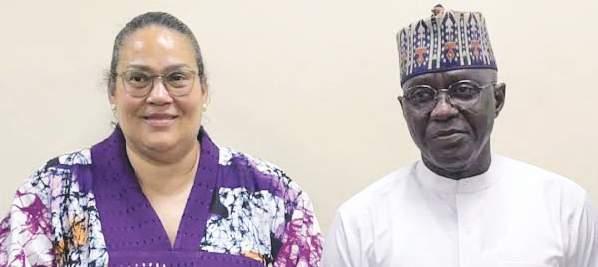
Founder, Cormode Cancer Foundation, Dr Denise Ejoh(left) and, Federal Commissioner and CEO, National Commission for Refugees, Migrants and Internally Displaced Persons, Tijani Ahmed after agreeing on collaboration to tackle cancer in Abuja… recently
Hammed Shittu in Ilorin
A family of four, including the mother and her three children, have reportedly died in Ilorin, the Kwara State capital, after eating food suspected to be ‘poisonous’ rice.
The unfortunate incident, it was gathered, happened at Oshin area on Asa Dam road, in Ilorin last weekend.
THISDAY investigations revealed that while the first child of the family, Abibat, was
The father of the children popularly called Alfa Ahmad, who also ate the ‘poisonous’ rice has been hospitalised in one of the hospitals in Ilorin.
BlessingIbunge inPortHarcourt
Youths in Rivers State under the aegis of Rivers State Ethnic Youth Leaders Council (RSEYLC) has expressed their support in the leadership of Samuel Ogbuku-led Niger Delta Development Commission (NDDC).
Warning against distractions by some suspected detractors of the leadership, the group specifically declared its support for Ogbuku’s Special Adviser (SA) on Youths, Matthew Dango.
The youth leaders made the declaration yesterday in Port Harcourt during a press conference
led by its President-General, Barinuazor Emmanuel; Bright Ite (Vice President), and Felix Wolu (Secretary-General). They lauded Dango’s relentless efforts, determination and contribution of the Managing Director of NDDC, Ogbuku, in bringing about peace and progress in the region.
According to the RSEYLC, which condemned calls by some faceless individuals for the sack of SA on Youths to the NDDC MD, any attempt to truncate the existing peace and progress in Niger Delta would be resisted.
Ondo State Governor, Lucky Aiyedatiwa, yesterday charged traditional rulers to leverage their positions to promote peace and unity among residents while enhancing the security of lives and property in their communities.
The governor made this call during the presentation of the Instrument of Appointment and Staff of Office to Oba Adebimpe Aanuoluwapo Oguntibeju, the Elereke of Ereke in Ilaje local government area and Oba Oladele Akinmoye, the Orungberuwa of Ode Erinje in Okitipupa local government area of the state.
The first ceremony took place at the Community Grammar School, Ereke, where Oba Aanuoluwapo Adebimpe Oguntibeju was installed as the pioneer Elereke of Ereke.
Governor Aiyedatiwa highlighted the significance of this recognition, noting that it was the result of a long-standing demand by the Ereke community.
He recalled the process that led to the day, beginning with the recommendations of the Justice C.E.T. Ajama Judicial Commission of Inquiry on Chieftaincy Matters, which were reviewed and implemented by his administration.
The National Commission for Refugees, Migrants and Internally Displaced Persons and the Cormode Cancer Foundation are collaborating to tackle cancer in Nigeria’s Internally Displaced Persons (IDP) camps and host communities.
According to a statement, the partnership is aimed at establishing Cormode Cancer Champions Clubs in secondary schools in the country to educate young people about cancer prevention and early detection.
The statement quoted the Federal Commissioner for
the Commission Tijani Aliyu, as saying that the initiative aimed to improve the health and well-being of displaced persons, reduce the stigma associated with cancer, and empower young people as advocates for cancer awareness.
He said: “We are delighted to partner with Cormode Cancer Foundation to address the critical issue of cancer awareness in our IDP camps and host communities. This initiative aligns with our commitment to improving the health and wellbeing of displaced persons.
the first to die, the mother and two other children died at the early hours of yesterday. Other two kids, who also died as a a result of eating
the rice, are Zainab and Abdulfatah.
A source close to the family told journalists yesterday in Ilorin that: “On Saturday
morning they said they all ate rice, and after eating the food, the parents went out and returned home in the evening.
“When they came back, the first child was the one that started feeling weak, so they rushed her to the hospital where she died.
Tony Icheku in Owerri
The Imo State chapter of the Labour Party (LP) yesterday described the Imo State Local Government Council elections scheduled for September 21, 2024 as coronation of selected persons to man the 27 Local Government Councils in the
State and not an election
Speaking exclusively to THISDAY in Owerri, the Imo LP State Chairman, Mr. Callistus Ihejiagwa, maintained that LP chose to boycott the LG elections as it refuses to lend itself to be used to endorse the shenanigan and coronation of cronies of Governor Hope
Uzodimma to man the LG Councils
“Imo State LP has no confidence in the democratic credentials of Governor Hope Uzodimma and we do not see the Imo State Independent Electoral Commission, (ISIEC) as completely independent. Go and find out, the word on the streets is that Gov Uzodimma and the Imo APC have already compiled a list of those who would be announced as winners in the so called election. The LP refuses to be part of such coronation. The party will not lend itself to endorse such shenanigans”, Ihejiagwa affirmed.
George Okoh in Makurdi
A group known as the Benue Progressives Patriot (BPP), led by former Speaker Pro Tempore of the Federal House of Representatives, Rt Hon Terngu Tsegba, has announced that the local government congresses of
the Peoples Democratic Party (PDP) did not take place in Benue State.
Tsegba stated this in Makurdi yesterday.
In the statement read by Tsegba, the group condemned the irregularities at the ward congresses, which they alleged
were orchestrated by Samuel Ortom’s associates who conducted the congresses in private homes and fabricated results. The group stated that these results could not be accepted.
He emphasised that he was voicing the concerns of aggrieved party members in the state. Chief Tsegba urged the National Secretariat of the PDP to annul the flawed exercise and ensure that the results from the various wards, approved by the local populace, are accepted and adopted before proceeding to the local government congresses.
The Nigeria Liberty Movement (NLM), a new political movement established to enlighten, advocate and raise new leaders that will bring about a new era of leadership that prioritises the needs and aspirations of Nigeria, has insisted on replacing selfleadership with selfless leaders.
In a statement issued by the movement and signed by Khalid Ahmad, the Interim Intelligence Reports/Research director of NLM and supervisor of Gombe, Enugu and Niger States, after the national meeting in Abuja recently, he said: “For too long, Nigeria has been plagued by poor leadership, corruption, and inefficiency. Our country has been held back by those who prioritise their own interests over the well-being of our citizens.
“However, we firmly believe that a new era of leadership is possible, an era where leaders put the people first, where leaders are accountable, and where leaders inspire hope and confidence can be achieved.” Ahmad stated that: “Our vision for a better Nigeria is built on quality education, economic empowerment, infrastructure development, good governance, and environmental sustainability.
Juliet
The National Assembly has urged the Nursing and Midwifery Council of Nigeria to open its site and commence verification of Nurses and Midwives based on its former guidelines, not the revised guidelines for verification dated February 7, 2023, pending the conclusion of investigation by the House Committee on Health Institutions.
This was disclosed in a letter dated 13th August, 2024, titled “Negative Portrayal of the House’s Resolution” and signed by the Clerk of the National Assembly, Mr. Sani Magaji Tambuwal, to the Nursing and Midwifery Council of Nigeria. Hon. Patrick Umoh on Tuesday, 23 July, 2024 had raised a motion of urgent national importance on the need to safeguard institutional integrity and address any misinterpretation of the House’s Resolution by the Nursing and Midwifery Council of Nigeria. While presenting the motion on the floor, Umoh recalled that the House previously urged the Nursing and Midwifery Council of Nigeria, through a resolution on Tuesday, 26th, February 2024, not to implement the revised Guidelines for Verification dated February 7, 2023, pending investigation by the House.
Sylvester Idowu inWarri
The Chief of Staff (CoS) to the Governor of Delta State, Hon. Johnson Erijo, has solicited the support of individuals and organised private sectors in the development of the oil rich state. Erijo made the solicitation
yesterday shortly after inspecting a six-bed Intensive Care Unit (ICU) built and equipped by Chuks Agidigbo Leadership Foundation and MEDAST Nigeria Limited at the Central Hospital in Kwale, Ndokwa West Local Government Area of Delta State.
The CoS, who was
overwhelmed at the state-of-theart equipment at the ICU, urged operators of the organised private sector and well-to-do individuals to contribute to the development of the state, especially in the provision of infrastructure.
“We are here to inspect the ICU at this hospital, this is a
very good development and I will brief my Governor, Hon. Sheriff Oborevwori with a view for us to know when it will be most suitable for us to formally receive the structure and facilities from the donors, Chuks Agidigbo Foundation and MEDAST Nigeria Limited,” he said.
Foundation Commits over N500m to Health, Youths, Community Devt
Folalumi Alaraninabuja
A charitable organisation, Bet9ja Foundation, has disclosed committing over N500m to several projects as a way of addressing critical challenges in the country. With the commitment, it
disclosed executing incredible progress through various impactful projects that has equipped the youth with digital & entrepreneurial skills, enhanced athletic skills for international competitions, bridged medical gaps by donating equipment, medical treatment/
knowledge, including Installation of solar panel streetlights and provision of pipe-borne water in rural areas.
The foundation aims to address critical challenges in healthcare, education, sports development, community projects, and youth empowerment across Nigeria. This
was disclosed in its 2024 Impact Report recently released to celebrate its first year.
Vice President and Board of Trustees member, Ada Cuomo, commended the foundation for its giant stride in enhancing lives and supporting the Nigerian government.
under customary international law, even when the wrongful act that has been committed is by the organ of a sovereign. Blame Nigeria, don’t blame the Chinese”
“But do you agree that there are many sides to this story? Former Ogun State Governor Ibikunle Amosun has said this is a dispute between two Chinese companies, and that Zhongfu is an impostor, and the whole thing has nothing to do with either Ogun State or Nigeria.”
“So, who does it have to do with? The concrete story at the moment is the ruling at arbitration and the provisions of the New York Convention which are enforceable in 170 countries. Get it into your head, there is something called International Arbitration, and at that level rules are rules and those rules are not made by your Nigerian big men.”
“Well, if that is the case, the government of Ogun State should bear its own liabilities. I am not interested in the legal rights of the Chinese.
I am a concerned Nigerian and I don’t think anybody should seize the assets belonging to 36 states and the FCT because of the wrongful act of one state of the Federation. Ogun State is just one part of Nigeria. If they have committed an international crime, they should pay for it in that state. Why should an Akwa Ibom or Gombe man lose part of the commonwealth of Nigeria because Ogun State people have caused problems?”
“I think the bigger issue is that you don’t know what will come up tomorrow from your state too. Or any other state. Most of these sub-nationals have serious foreign debt portfolios, protected by sovereign guarantee. When the alarm blows, Nigeria will be in a mess. What we need to address is the capacity of the sub-nationals to enter into international agreements. In particular, our states do not have the capacity to engage with China. Don’t be fooled by the open romance, and China’s interest in Africa. China is a friend only as long as its own interests are served. This is what African leaders do not understand. Our institutions in Africa are also weak.”
“I have never trusted the Chinese and their Belt and Road Initiative, or their debt trap diplomacy. But I blame African leaders who lack the capacity to read between the lines. Nobody should ever rely on the same Chinese who have seized assets in Zambia and Djibouti, and also have challenges with Kenya and Angola. They come bearing gifts and incentives, but always at a cost to the recipient. Ogun State people should pay their own debt, please. Maybe that will teach every other state government a lesson.”
“Serious embarrassment to Nigeria. But rather than blame the Chinese, I see something else: the point that other international investors would not want to do business with Nigeria, a country where there is no certainty, where you can reach an agreement with one government and another government would come and change everything and you lose money in the process.”
“Professor Pat Utomi said that much in his commentary on the Ogun State saga. I won’t be surprised if more people raise an alarm like Prof. Utomi did. It is not only international investors that are at risk. Local investors too. When you try to invest in Nigeria, you get your fingers burnt, that is why people are running away from us. Ask Dangote too. And I think I agree with Donald Duke, former Governor of Cross River State when he says Nigeria’s politics is full of quacks…they’ve taken it to the lowest level.”
business in China. We have co-hosted with the Nigerian side a series of cultural events such as the “Happy Chinese New Year” Temple Fair, the Chinese Film Festival and the “Chinese Bridge”-Chinese Proficiency Competition, which have largely brought our hearts closer. I am expecting more Nigerian friends to pay a visit to China and act as the envoys connecting China-Nigeria friendship.
China and Africa enjoy a long-standing friendship. In the 1960s and 1970s, despite its economic hardship, China built the world-renowned Tazara Railway for its African brothers. In 2013, President Xi Jinping put forward the principles of sincerity, real results, amity and good faith for China’s Africa policy. Over the past decades, China and its African friends have stood together in weal and woe in the face of changes in the international landscape and joined hands to meet challenges. Taking into consideration the yearning for modernization among African countries, President Xi Jinping proposed in 2023 the Initiative on Supporting Africa’s Industrialization, the Plan for China Supporting Africa’s Agricultural Modernization, and the Plan for China-Africa Cooperation on Talent Development respectively, accelerating Africa’s integration and modernization.
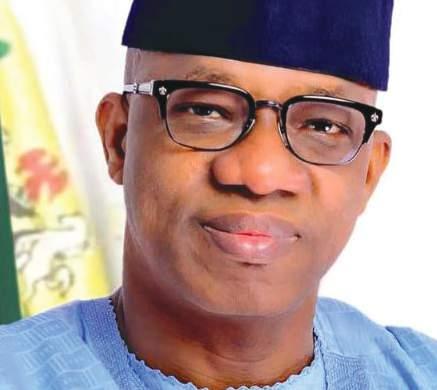
“But do you think President Goodluck Jonathan can help to rescue Nigeria, and restore the years that the locust has eaten if he decides to run in 2027?”
“Wait, wait, wait! How did we just jump right now from international commerce to President Jonathan coming back to rescue Nigeria in 2027? Where is that coming from?”
“It is all out there in the public space. Governor Bala Muhammed of Bauchi was the first to fly the kite. Then, there was a story in Basorun Dele Momodu’s The Boss Newspaper, and yesterday, only this yesterday, ThisDay newspaper carried the same story, saying that there are moves by Northern politicians to draft President Jonathan into the 2027 race after the #EndBadGovernance protests.”
“Okay you have said it, you say they are flying a kite. I recall when I was a child, we used to fly kites, we even had this competition and the wish that our kites could fly as high as an airplane. Right now, I am not thinking of kites, please. I am concerned about how to get fuel into my car and move around. The situation is worse. The country is literally on its knees.”
“President Tinubu is off to France, for a brief work stay.”
“What has that got to do with what I am saying? They don’t have fuel scarcity in France, for God’s sake.”
“I get you. I get you. bought fuel at N1, 200 per litre and it was a painful experience queuing at the fuel station. While I am suffering here and other Nigerians are suffering, the President goes to France in a new jet.”
“I hear he also has a new car, a glamorous, Armoured Cadillac SUV called The Beast. The Chairman. The cost is said to be about N995 million.”
“What a Beast! N995 million. And the new presidential jet is how much? $100 million?
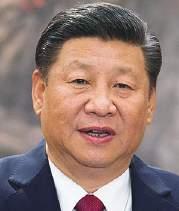
In September this year, the
I hope both the jet and the Escalade are not made in China. And I get to go and queue up at petrol stations? And poor Nigerians are asked to make sacrifices for the country and endure hardship? Meanwhile, Nigerian Senators are earning N29 million per month! Is that how to lead by example?”
“Well, let’s be realistic here. The President of Nigeria is royalty. You cannot expect him to go about like a plebeian. His security is also very important. You can bring up all your #EndBadGovernance narratives but it is an absolutely false equivalent for you to compare your miserable search for fuel to the lifestyle of the Nigerian President. All things fair and well, the President has tried to meet Nigerians halfway before leaving for France. The President has given NNPC Limited the approval to spend savings from petrol subsidy removal - dividends, taxes and royalties- about N7 trillion from August 2023 to December 2024 to pay for petrol subsidy.”
“In other words, the government has finally admitted that there is no fuel subsidy removal anymore. Government has reversed itself! So, subsidy is no longer gone! Subsidy is back! Nigeria, we hail thee! The same people that told us that there is no more fuel subsidy as recently as two months ago have now turned around to say in fact fuel subsidy is the only way forward. What a policy somersault! They have thrown the Petroleum industry Act (PIA) into the dust bin just like that? But does that mean I will now find it easier to buy fuel? Will the fuel queues disappear?”
“No guarantee for now. But maybe you can buy fuel whenever it is available at a cheaper price.”
“And when would that be? I am just tired. I don’t know who to trust again in this country, not even the Churches, despite the fact that I am a Christian.”
leaders will jointly plan future China-Africa development after the previous summit held six years ago. Currently we are actively preparing for President Tinubu’s state visit to China and his attendance of the Summit in September along with our Nigerian colleagues. I am confident that with our joint efforts, President Tinubu’s visit is certainly to deepen our cooperation in such fields as industry, agriculture, infrastructure, financing, poverty reduction, technological innovation, digital development and blue economy, upgrading and expanding the depth and width of China-Nigeria cooperation, and bring more benefits to our two peoples. President Tinubu, as the chairman of the Economic Community of West African States (ECOWAS), will also discuss with Chinese and African leaders about China-Africa cooperation and development.
In July this year, the third plenary session of the 20th Communist Party of China Central Committee was successfully held, with the adoption of an important resolution which included more than 300 important reform measures. The measures are aimed at further deepening reform comprehensively and advancing Chinese modernization. China strives for modernization through a path of peaceful development. The
“As a Christian, you must have faith.”
“Faith. You say, faith? Faith when Prophet Odumeje, the Liquid Metal, the Indaboski, the Onitsha trader who became a Prophet goes to Russia and says on TikTok that Russia is not at war. Faith when I hear that Pastor Adeboye woke up a person who had died for 11 days with an anointed handkerchief from the church. Faith when Primate Ayodele says Victor Osimhen will end his career if he joins Chelsea because there is a curse on that football club. Is the Primate now running a football ministry?”
“Have faith brother because on the contrary, the churches are doing well. Davido’s father over the weekend donated a gift of one billion Naira to a Cherubim and Seraphim Church in Lagos during a Thanksgiving service in honour of his late mother.”
“One ginni?”
“One billion. Davido’s father is not called Baba Olowo for nothing. He simply lived up to his reputation. So just know that it is not everybody that is complaining in this country”
“I just hope that Baba Olowo will also intervene when church elders begin to fight over that One billion Naira. And what is the wisdom in donating N1 billion?”
“He has the right to spend his money the way he deems fit. And why will church elders fight over matters of God. The Bible says...”
“Forget the Bible. Just this last weekend in Abuja, some church elders pushed the Bible aside and engaged in open combat in their church premises. The FCT Police Command had to fire tear gas to disperse the fighters and put an end to the violence. The police had to lock up the church.”
“United Methodist Church. It was a fight over alien practices introduced by the Church headquarters in the US, which divided the Church.”
“Signs of the end-time. Alien practices in the church. Elders and the congregation fighting for hours. There is nothing we will not see in Nigeria.”
“I can only say that it is not only the political leaders that are at fault. We, the citizens, have our problems too. Leave the churches alone. The Nigerian Constitution allows people to worship God their own way.”
“Anyway, I see that Lagos, Oyo and Ogun States have declared Tuesday, August 20, Isese Day, a public holiday for traditional religion worshippers.”
“Fair is fair. So, if you think the churches have disappointed you, you can take the day off to celebrate with the Isese people.”
“I rebuke Satan!”
“Leave matter. Many Nigerians are traditionalists. They just camouflage. What is important is that people must learn to defend the common good.”
“You are right. I am even surprised that the NYSC has now had to demobilize 54 fake university graduates and they are to face prosecution.”
“Be specific. They are 54 graduates of the University of Calabar, including a campus bread seller.”
“No. This is not about UNICAL. It is a general problem. In fact, it was the Vice Chancellor of the university that raised the alarm. NYSC is praising her for her vigilance. And I suspect it is not new. Can you imagine how many persons have been mobilized for NYSC over the years, holding fake certificates and occupying important positions?”
“True. Too many quacks indeed in high and low places. What a country!”.
country will leverage the strengths of its enormous market and enhance the capacity to open up by expanding international cooperation. China’s development plays an important role for the stability and prosperity of a multi-polar world. We will also continue to support Nigeria’s social and economic development with concrete actions and share our development benefits with the country.
When I passed by the majestic Zuma Rock, it reminds me of the Great Wall of China. Both of them represent the national character of tenacity possessed by our two peoples and symbolize our friendship. I look forward to meeting more Nigerian friends from government bodies, the National Assembly, the business community, the media, think-tanks, etc., visiting different states in Nigeria, and gaining more insights into its history, ethnic cultures and local customs. With the support of my like-minded Nigerian friends, I will make my utmost efforts to contribute to the resilient relations between China and Nigeria, to the profound friendship between our two peoples, and to the building of a high-level China-Nigeria community with a shared future.
•H.E. Dunhai is the new ambassador of the Peoples Republic of China to Nigeria
Femi Solaja
With barely two weeks until the Super Eagles' opening match in the AFCON 2025 qualifying round of matches, former Nigeria international, Kingsley Onye, who is better known as “Mature” has called on the Nigeria Football Federation (NFF) that they are running against time.
“We courting another disastrous opening just as we have turned the World Cup qualifier to be”, remarked the former left-sided defender from his base in the UK.
To him, not having a coach in place, two weeks before a major competition implies a poor approach
to the qualifiers. “The popular saying goes that to fail to plan is to plan to fail”, remarked Onye who in the 1980s featured for major Nigerian clubs such as the defunct Leventis United, Iwuanyanwu Nationale and Enugu Rangers which remains the club after his heart, even till now.
He pointed out that while they have not been able to get a foreign coach owing possibly to lack of funds, “the NFF should latch on the opportunity of the expiration of the ban on Samson Siasia.”
According to him, Siasia remains Nigeria’s best option. “First, he is a Nigerian. More importantly, he has done it before and has proved
his mettle.”
He pointed out that Siasia has possibly the best coaching profile in the country today. “He has silver and bronze medals in the Olympics, he has coached the Super Eagles even to major victories against a team like Argentina and has taken the Flying Eagles to the championship match in the FIFA U-20 World Cup.
“A Lionel Messi-propelled Argentina had to depend on two penalty kicks to beat Siasia’s Flying Eagles in the final match of the 2005 Under-20 World Cup in the Netherlands.
“Argentina also had to depend on a break-away move to beat Siasia’s
team in the gold medal match of the Beijing Olympics”, Onye pointed out.
To him, that is the best option for Nigeria, even as he advocated for another Nigerian international and coach, Sylvanus Okpala as Siasia’s assistant.
“This we can do in the short term while hoping for a long-term solution”, said Onye. He pointed out that Okpala was pivotal in Stephen Keshi’s crew that led Nigeria to victory at the 2013 Africa Cup of Nations.
“Okpala is a good match reader and his support for Siasia will be valuable as he had done with Keshi,” he pointed out.
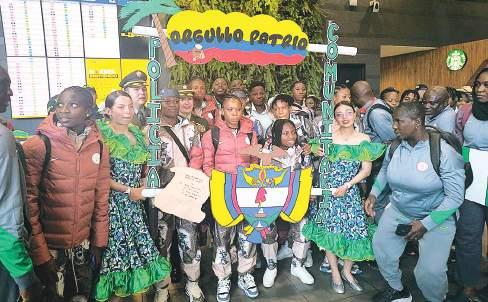
Colourful traditional dancers, flagwaving enthusiasts and members of the Local Organizing Committee of the FIFA U20 Women’s World Cup Colombia 2024 were among the excited crowd that welcomed two-time silver medallists Nigeria to the Colombian capital, Bogota on Sunday evening.
Exhausted but fascinated by the pomp and pageantry, the Falconets, who landed at the El Dorado International Airport after a 13-hour flight from Istanbul in Turkey, lapped up the reception and showed appreciation to the motley crowd. After a light training session on
Monday to shake off jet lag, the Nigeria U20 girls will on Tuesday intensify their preparations for a strong challenge at winning the trophy. Coach Christopher Musa Danjuma told local journalists at the airport in Bogota that the Falconets are determined to go all the way this time, having logged two Final-Match
Remo Stars coach, Daniel Ogunmodede, has said that the quest of his side to reach the next phase of the CAF Champions League is just halfway gone and would only be completed based on the better result in the return leg against AS FAR in Rabat on Sunday.
The Nigerian representative, Remo Stars of Ikenne, secured a fragile 2-1 advantage last Sunday and will face an uphill task against their North African opponent in the return leg.
In a video interview in the club’s X-handle, the coach remarked that he was aware of the enormous task ahead when they encounter AS FAR again in Rabat.
“We expect a lot of hostility and antics on and off the field. We are
used to them and we will be well prepared. We have answers and we are ready for that”, remarked the coach.
“We will have to improve on our attack and finishing because we are not going there to sit back”, said the coach who probably is aware that a 1-0 loss is enough to knock Remo Stars out of the competition.
Unlike in the closing qualifiers for the Paris 2024 women’s football where CAF abolished the away goal concept, the rule is still alive in the CAF Champions League.
As per Articles 13 and 14 of the regulations, the away goal advantage is still alive. The sections read: “13. If after the end of the regular time of the second match, the two teams have scored the same
number of goals during the two matches, the team which will have scored the greatest number of away goals shall qualify.
“14. If the number of away goals is also the same or if the results of the two matches are nil, the winner shall be determined by penalty kicks by the Laws of the Game.”
Reflecting on the first leg match, Ogunmodede recalled that his team should have wrapped up the game in the first half when they had many scoring opportunities, “but we gave our opponents too much respect.”
“In the opening 10 minutes of the second half was so scary for us. We slept off. We were waiting to come back into the game, and they caught us…we have learnt our lesson.”
appearances, a semi-final appearance and several quarter-final berths in the 22-year-old tournament.
“We have the mandate and support of the Government and people of Nigeria to come here and give it our best fight-and-push. Our Sports Minister reminded us of the fact that Nigeria finished second in 2010 and 2014, and reached the semi-finals in 2012. He charged us to come back with the trophy this time, and that is our objective.”
The Falconets’ final phase of preparation for the 23-day championship will include tough tests against Australia and Mexico. They go up against the Australians on Friday, 23rd August, and then confront the Mexicans three days later.
The girls from Mexico will be featuring in the FIFA U20 Women’s World Cup for the 10th time, having missed one previous championship, while Nigeria is one of only four countries (the others being the USA, Brazil and Germany) to have played in every final tournament since the competition was launched as a U19 event in Canada in 2002.
With the competition having only this year been upgraded to a 24-nation-finals, nearly half of the finalists are debutants. These are Austria, Chile, Chinese Taipei, Denmark, Fiji, Haiti, Papua New Guinea, Poland, Thailand, Cameroon and Morocco.

Head Coach Bankole Olowookere has invited 35 players to the camp of Nigeria’s U17 girls, Flamingos, as the team commences the first phase of final preparations for the 8th FIFA U17 Women’s World Cup finals to be staged in the Dominican Republic later this year.
The Nigerian girls notched an awe-inspiring total of 25 goals in six matches in the qualifying race, routing the Central African Republic by six goals in each leg, dismissing Burkina Faso 7-1 on aggregate in the third round and turning back Liberia 6-1 on aggregate in the final round.
Extraordinary poacher Harmony Chidi, who set a jaw-dropping record of 13 goals in the qualifying series, tops the list of invitees alongside her strike partner Peace Effiong, with team captain Taiwo Afolabi, goalkeeper Christiana Uzoma and defender Prisca Nwachukwu also prominent.
The 8th FIFA U17 Women’s World Cup finals will be staged in the cities of Santiago de los Caballeros and Santo Domingo in the Dominican Republic, from 16th October – 3rd November.
ALL THE INVITED PLAYERS:
Goalkeepers: Christiana Uzoma (Edo Queens); Elizabeth Boniface (Sunshine Queens); Sylvia Echefu (Confluence Queens); Mary Igieneh (Osun Babes); Juliana Simon (Youthsfon Kaduna) Defenders: Prisca Nwachukwu (Imo Strikers); Jumai Adebayo (Naija Ratels); Taiwo Adegoke (Remo Stars Ladies); Oluwatoyin
Azeez (New
(Ekiti Queens);
FA); Hannah Ibrahim (Remo Stars Ladies); Vivian Ekezie (Heartland Queens); Ololade Isiaka (Abia Angels); Timilehin Faluyi (Asisat Oshoala Academy); Elizabeth Adesuyi (Castmog Ladies)
Midfielders: Taiwo Afolabi (Delta Queens); Mary Aderemi (Bayelsa Queens); Farida Abdulwahab (Nasarawa Amazons); Shakirat Moshood (Bayelsa Queens); Oghenemairo Obruthe (City Sports); Queen Joseph (Fosla Academy); Farikike Moses (Dannaz Queens); Amarachukwu Onuorah (Edo Queens); Justina Owolabi (Ondo State Academy); Adanna Nwachukwu (Naija Ratels) Forwards: Yetunde Ayantosho (Heartland Queens); Harmony Chidi (Imo Strikers); Kudirat Arogundade (Green Foot); Ramota Kareem (Honey Badgers); Aisha Animashaun (Naija Ratels); Peace Effiong (Rivers Angels); Blessing Ifitezue (Delta Queens); Muinat Rotimi (Nakamura Football Academy); Aishat Bolarinwa (Ghetto Tigers); Azeezat Oluwole (Right Vision Academy)
FIFA U17 Women’s World Cup Dominican Republic 2024
Group A: Dominican Republic, Ecuador, New Zealand, Nigeria
Group B: Spain, USA, Korea Republic, Colombia
Group C: Korea DPR, Mexico, Kenya, England Group D: Japan, Poland, Brazil, Zambia
The President Nigeria Golf Federation (NGF), Otunba Olusegun Runsewe has condoled with the families of two young golfers from Ekiti State, who lost their lives on their way to Abuja for the IBB Junior Open Golf Championship.
The golfers lost their lives when their contingent was involved in a ghastly motor accident around Kabba, Kogi State last Wednesday.
Two others players in the team also sustained injuries.
The players were among the 146 kids from nine states billed to feature in the championship that ended on Sunday.
"Our hearts bleed for the two young golfers that lost their lives on Wednesday 14th Aug, 2024 on their way to the IBB Junior Open in Abuja in a ghastly motor accident around Kabba in Kogi State.
"The Nigeria Golf Federation commiserates with the families of these young golfers and the entire members of the Ekiti Golf Club. "May God grant all the fortitude to bear this loss. We pray for the quick recovery of the other two young golfers who sustained injuries from the accident and presently undergoing treatment," he said.
In a statement by Runsewe, he extended commiseration of the NGF to both the families of the young golfers affected and the entire members of the Ekiti Golf Club.

abati1990@gmail.com
Donald Duke to Politicians
“Politics could be the most elevating vocation but a lot of quacks are involved in it, so they have brought it down to the lowest level. When we complain about the country not being good, we should look at politicians. So, if you have the right politicians, you have the right country. One of the pitfalls of our country is never preparing the next generation for leadership” --FormerCrossRiversState Governor,DonaldDuke,beratesquackpoliticiansinthecountry.


“Ihear the people of Ogun State have put the people of Nigeria in serious trouble with the Chinese.”
“You did not hear anything. The story is out there and it is so loud that even the deaf can hear that there is a Chinese problem in Nigeria right now. And just to correct your statement, it is not the people of Ogun State. It is the government of Ogun State. There is a difference.”
“I don’t see any difference. Government acts on behalf of the people.”
“Not true. Oftentimes, the government acts in the selfish interest of the people that are in charge at any particular time. Policies are sometimes made, actions are taken simply to settle personal scores, and the people end up being the victims. Now everybody is saying that the people of Ogun State should be careful how they go about calling their state the gateway to Nigeria. The people themselves are victims.”
“Come to think of it. The idea of an Economic Free Zone would have made the state truly the Gateway in terms of opportunities. It is sad that the Ogun state Government mismanaged its contractual agreements with Zhongshan Fucheng Industrial Investment, and even ruined relationships in the process.”
“I recall that as far back as 2007, the Otunba Daniel Administration initiated the

Free Trade Zone concept in Ogun State. It was a bid initiative then, located in Igbesa.. It was called the Ogun-Guangdong Free Trade Zone. There was also the Olokola Free Trade Zone, the OKFTZ, which was a collaborative effort between Ogun and Ondo states and the private sector to be located on about 20, 000 hectares. The dream was to turn Ogun State Ogun State Governor, Dapo Abiodun
into an industrial hub. When it was further reported that oil had also been discovered in Ogun State, the future could not have looked brighter.”
“It is one thing for government to dream. It is another thing for the goals to be achieved. I am not talking about the past. I am talking about a situation where because of Ogun State, the Court of Justice in Paris has attached three aircraft belonging to the Nigerian Government: a Dassault Falcon 7X, a Boeing 737-7N6, and an Airbus A330, one of which is a brand-new Presidential aircraft, newly procured.”
“I think they have released the Presidential jet. It is the one President Tinubu is cruising to France or short work trip”
“Hmm. I hope they don’t seize it again while the President is in France. The Zhongshan Fucheng people you know are also planning to seize the 20 million pounds that was awarded in favour of Nigeria against P&ID in the UK, and they also want to confiscate two properties belonging to Nigeria in Liverpool.”
“These people are thieves. I think that they are like the P& ID people”.
“No, they are not. The only connection between this case and the P & ID in my view is that the Ogun State Government was careless. The most important thing in international trade is trust. When trust is broken, chaos results.
Agreements are sacrosanct. When you enter into an agreement, you are required to honour it. States have to be guided by international best practices. The Daniel administration brought the Chinese, the Zhongshan. The Amosun administration later entered into an agreement with Zhongfu, a subsidiary of Zhongshan, a dispute arose and the company was driven away. Zhongshan went to arbitration and got a compensation award of $55.6 million and another US$75,000 plus interests., which now makes it over $70 million. That was in 2021.The court gave the opportunity to file an appeal. Nobody responded in time, just as in the P&ID case, and by the time Nigeria woke up, our lawyers started quoting jurisdiction and sovereignty which were promptly dismissed by the US Court. And now the Chinese company wants to enforce the judgement.
“You have mentioned France, UK, US, my problem with these China people is their forum shopping. They have gone to every arbitral court possible: UK, Quebec, US, France, British Virgin Islands, and Belgium, just to embarrass Nigeria. Why Nigeria? Why not Ogun State?”
“Nigeria has a Bilateral Investment Treaty (BIT) with China. Its provisions are very clear. Signatories to that treaty can raise arbitral issues

On 10 August 2024, I departed Beijing and landed in Abuja-from a city near the western side of the Pacific, to a capital adjacent to the eastern side of the Atlantic-and started my journey as the 15th Chinese Ambassador to Nigeria, with a lofty mission on my shoulder and great excitement in my heart. Upon arrival at the Nnamdi Azikiwe International Airport, I deeply felt the hospitality of the Nigerian people and their friendship with China, which boosted my confidence in my tenure in the coming years.
There is much common ground between China and Nigeria and between our two peoples. China is the second largest economy and one of the most populous countries in the world, while Nigeria is a major economy and the most populous country in Africa. Both our countries are blessed with vast land, ancient history, rich natural resources, multiple ethnic nationalities and splendid culture. Both Chinese and Nigerian people cherish peace and yearn for development. They are both hospitable people and treat each other as brothers. Meanwhile, 1st October is China’s National Day and Nigeria’s Independence Day respectively. Although separated by oceans, the two countries and two peoples
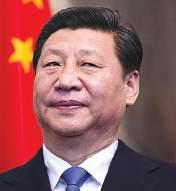
are closely linked by these similarities. Therefore, since the establishment of diplomatic ties on 10 February 1971, our relations have stood the test of changes in the international landscape and gone from strength to strength. Furthermore,
over the years China-Nigeria relations have stood at the forefront of China-Africa relations.
In 2018, our two countries signed a Memorandum of Understanding for cooperation on the Belt and Road Initiative (BRI), and Nigeria joined the Belt and Road family. In October 2023, Vice President Shettima attended the Third Belt and Road Forum for International Cooperation in China on behalf of President Tinubu, which was a complete success. In June this year, Foreign Minister Yusuf Tuggar visited China and held talks with H.E. Wang Yi, Member of the Political Bureau of the Central Committee of the Communist Party of China and Minister of Foreign Affairs. The two foreign ministers co-chaired the first plenary session of the China-Nigeria Intergovernmental Committee, which further promoted the political mutual trust and mutually beneficial cooperation between our two countries. Upon arriving in Abuja, I witnessed its modern international airport, built by a Chinese enterprise. The airport is just one of the flagship projects constructed by Chinese companies through China-Nigeria cooperation, which include the Lekki Deep Sea Port, the Abuja Metro Line, the Lagos Rail Mass Transit, the Zungeru Hydropower Plant, the National Data Centre in Kano, and
the Lekki and Ogun industrial parks, etc. The projects stand as a testament to the fruitful results of China-Nigeria practical cooperation and the friendship between our two peoples. Nigeria is China’s third largest trading partner in Africa, with bilateral trade amounting to 22.56 billion US dollars in 2023. The country is also China’s second largest export market and a major investment destination in Africa, and the number of projects contracted by China in Nigeria ranks first in Africa. Featuring enormous potential and a bright future, the practical cooperation between China and Nigeria serves as a role model of high-quality Belt and Road Cooperation. People-to-people friendship holds the key to state-to-state relations. After the Covid-19 pandemic, we have closer cultural exchanges. We have established cultural centers in each other’s capital and Chinese and Nigerian universities have co-founded two Confucius Institutes in Nigeria, and Nigerian people’s enthusiasm for learning Chinese language keeps on growing. The number of Nigerian students learning in China reached its peak at more than 7500, and a large number of Nigerian citizens are doing